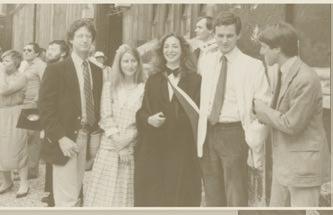
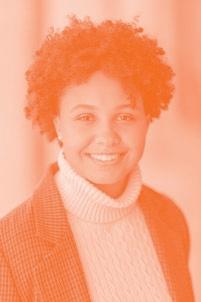



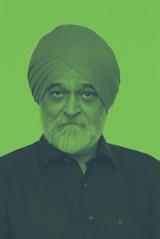



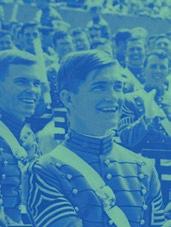


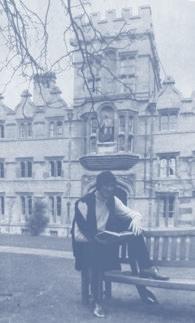


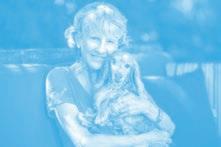
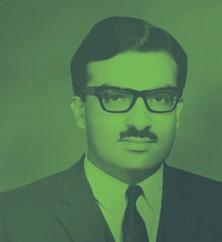

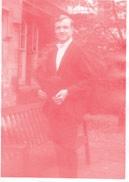
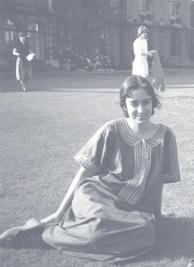




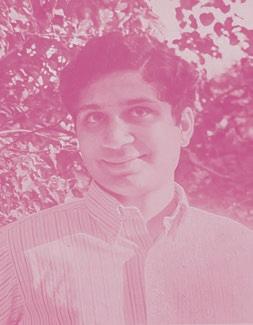
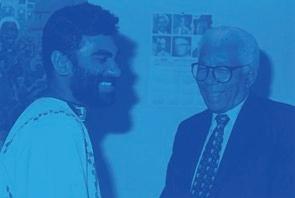




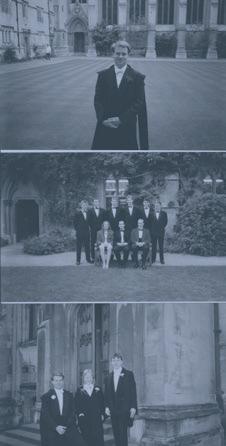

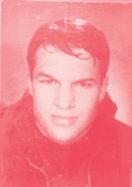

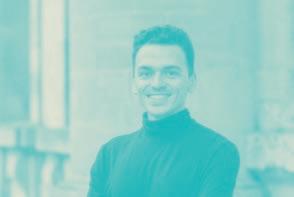


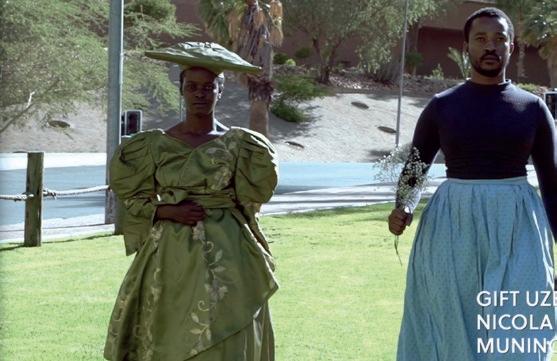
Sustained Attention, Transformative Lessons: Reflections on the Entangled Exhibition
the ripple effects of public art programming
Whales, Perception and the Humanities: Dispatch from an Aesthetic Education Moby-Dick and one Scholar’s intellectual journey



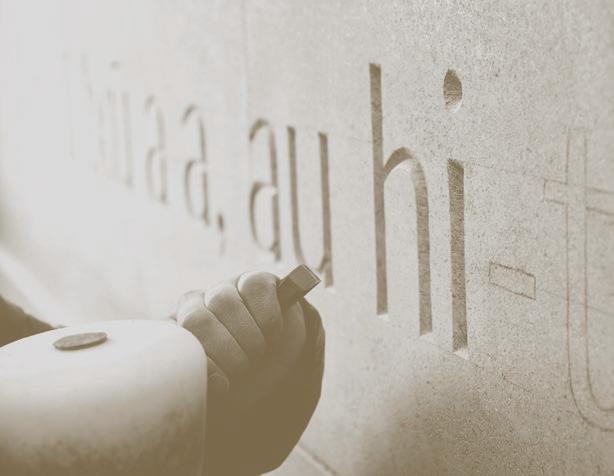
Does
Intellectual Property and Social Justice Supporting student athletes to grow their rights
Climate Change and Cocoa Farming: Influences of Colonialism
How research can shift us away from majority narratives
OutVote: Building a New Culture of Civic Engagement in the Gen-Z LGBTQIA+ Community Protecting communities by creating electoral power 44 The Fleeting Bliss of Oxford
Turning daydreams into reality

50 Hawk Flights and Field Boots
One Scholar finding a way through the woods
52 Reconciling and Amplifying Impact
The legacy of Cecil Rhodes in southern Africa

58 Algorithms and People: The Overlooked Impacts of AI
Why today’s real issues trump sci-fi imaginings 64 Green Energy in Zimbabwe: A Transformative Shift

A new approach helping marginalised communities 70 Novel Paths to Therapeutics The science behind new treatments for cancer
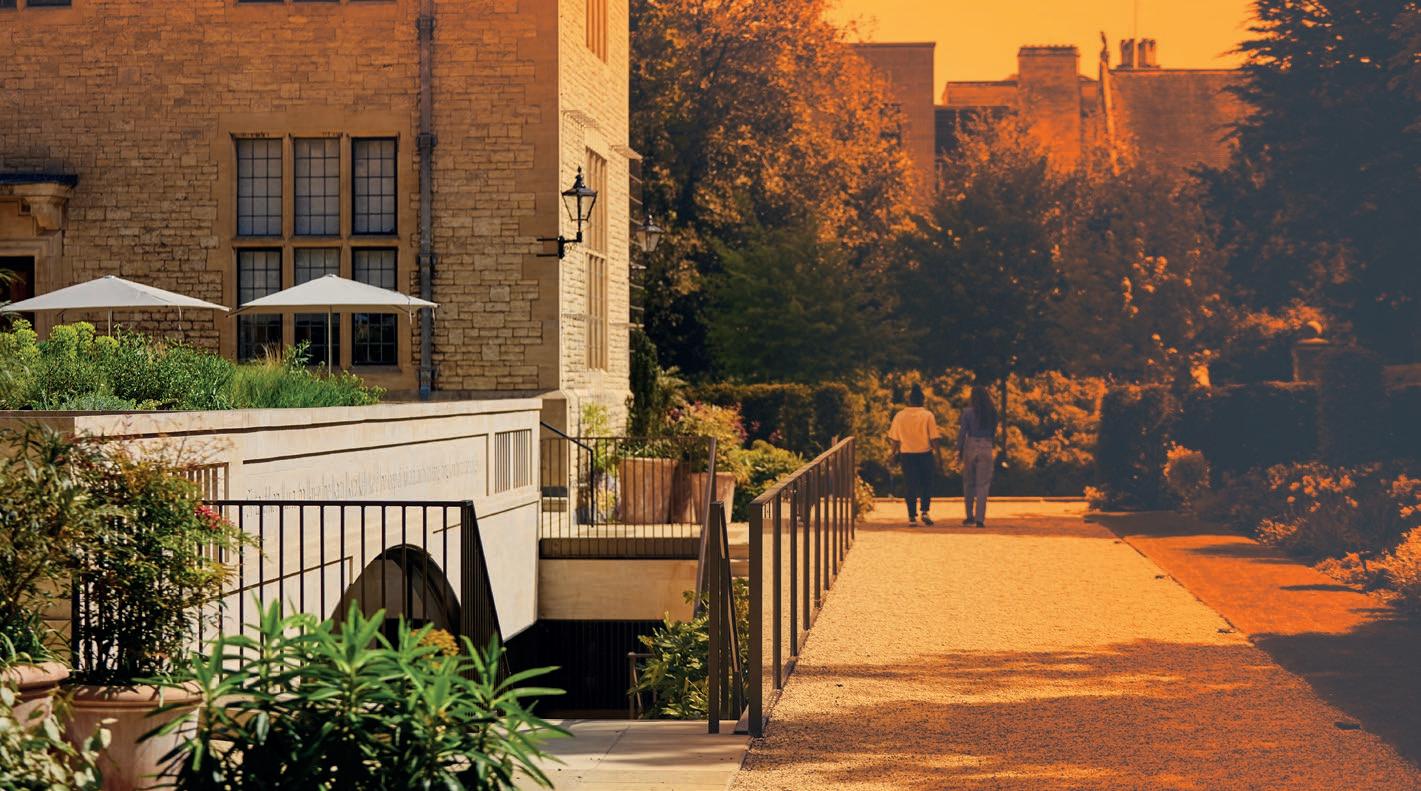
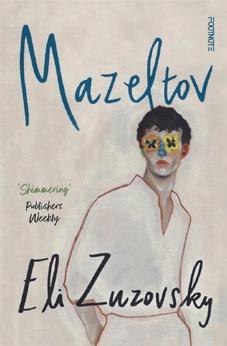
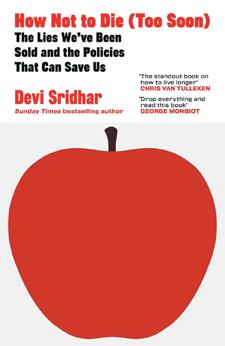



Editor:
Design:
Welcome to the 2025 edition of the Rhodes Scholar magazine. Our theme this year is ‘Charting Impact: Scholar Stories’. Here, you will find powerful examples of the impactful work that Scholars are doing across areas including scientific research, the arts, sports, climate change, and civic engagement and community building. Scholars also share their thoughts on what ‘impact’ means for them and how we might measure it across the course of our lives and at a time of such rapid and significant change in the world. As always, our magazine seeks to represent a range of opinions from across the Scholar community rather than simply embodying the views of the Rhodes Trust itself. This issue is published at a time of great international tension, and includes strong views on some issues, which we appreciate will not be shared by all.
As one of those interviewed, I can personally attest to these features of the project. For me, as for so many, the Rhodes Scholarship was transformational, opening a new window onto the world. Having the opportunity to talk about my time at Oxford as a Scholar, what led me there, and what I did afterward has helped me understand just how much the Scholarship did to set me on my own career path in higher education.
For me, as for so many, the Rhodes Scholarship was transformational
This issue of the Rhodes Scholar offers the chance, too, to step back and think about the impact that the Scholarship has had on each of us. 2025 sees the launch of the first ever comprehensive Rhodes Scholar Oral History Project, in which over 150 Scholar Alumni have taken part so far. In their interviews, Scholar Alumni reflect on their early lives, their decision to apply for the Scholarship, their time in Oxford and the paths their careers have taken, as well as offering advice for today’s Scholars in Residence.

That path has now brought me to the exciting privilege of serving the Rhodes Trust as it prepares for its next permanent Warden in succession to Elizabeth Kiss. I take this opportunity to offer personal thanks to Elizabeth for her vibrant leadership. In recent months, I have seen at first hand many admirable effects of her time as Warden, including the transformed physical space at Rhodes House, the very positive attitudes of Rhodes House colleagues, the vitality of the Scholars in Residence, the development of the Alumni network, and the expanded geographical scope of the Scholarship accompanied by the deepening of existing Rhodes constituencies. Although she will be much missed as she takes up her important new appointment as President of Union College, I know that her impact will continue to be felt across the Rhodes community.
Warmly,

Professor Rick Trainor (Rhode Island & Merton 1970) Interim Warden of Rhodes House
The Rhodes Trust solemnly acknowledges and honours the people in southern Africa whose labour and riches created the original wealth for the formation of the Rhodes Scholarship.
The Rhodes Trust provides the Rhodes Scholarships in partnership with the Second Century Founders, John H. McCall MacBain O.C. and The Atlantic Philanthropies, and many other generous benefactors.

The Rhodes Trust is delighted to announce the creation of a sixth Rhodes Scholarship for India endowed in perpetuity in partnership with the Radhakrishnan-Rajan family. The Trust is enormously grateful to Dr Mukund Rajan (India & Worcester 1989) and Mrs Soumya Rajan for their generosity and leadership in establishing this Scholarship, and for the partnership of an American Rhodes Scholar and his wife, and the University of Oxford, in providing additional funding to secure its permanence. Dr Mukund Rajan and Soumya Rajan shared their motivation for giving: ‘Oxford, where we first met as students, changed our lives, and we hope that this Scholarship will do just that for many more in the years ahead.’ The first selection for this new Scholarship will take place in 2025.
The Rhodes Scholarships for India were established in
1947. The new Indian Rhodes Scholarship was announced by Warden of Rhodes House and CEO of the Rhodes Trust, Dr Elizabeth Kiss (Virginia & Balliol 1983), at a reception in New Delhi on 26 September 2024, attended by invited guests including members of the Radhakrishnan-Rajan family along with the United States Ambassador to India, Eric Garcetti (New York & Queen’s 1993), his wife Amy Wakeland (Michigan & Wadham 1993), the Rhodes National Secretary for India, Dr Dhvani Mehta (India & Magdalen 2009) and Rhodes Trustee Menaka Guruswamy (India & University 1998). Rhodes Scholars Elect from India took a break from preparations for their imminent journey to Oxford to take up their own Scholarships to be present for this special occasion which included conversations on leadership and education and on the role of the Rhodes Scholarship today and in the future.
The renovation and relaunch of Rhodes House in 2023 blended innovative design, historic preservation and sustainable practices to reimagine this iconic space. The £38 million project offered significant but respectful interventions that complement the architecture of the original House, designed by Herbert Baker and opened in 1929. Led by architects Stanton Williams and Beard Construction, the renovation and remodelling created state-of-the-art facilities for gathering, learning and collaboration, doubling its usable space and substantially improving its environmental performance while preserving the rich heritage of the site. We are proud to see this visionary project recognised with a series of esteemed industry awards and accolades:

World Architecture Festival Completed Buildings: Retrofit
Architecture Masterprize Best of Best in Restoration & Renovation
Oxford Property Festival Project of the Year 2024
Oxford Preservation Trust Awards Green Certificate
Natural Stone Awards 2024 Interiors (Commercial & Residential)
Wood Awards Small Project: Rhodes House Glass Pavilion
Guild of Architectural Ironmongers AI Specification Award: Health & Education
RIBA Regional Awards RIBA South Award Winner
Ideas Abu Dhabi, a flagship forum organised by Tamkeen in association with the Aspen Institute, and the Clinton Global Initiative (CGI) convened a session of UAE Rhodes Scholars alongside civil society and business leaders. President Bill Clinton (Arkansas & University 1968) led the session examining how emerging leaders can build partnerships and act on urgent world issues.
This milestone event celebrated the tenth anniversary of the Rhodes Scholarship for the UAE. Partnering with the Clinton Global Initiative, the Rhodes Trust and the Salama bint Hamdan Al Nahyan Foundation, the event convened 12 UAE Rhodes Scholars, including HH
Majida Al Maktoum (United Arab Emirates & Trinity 2019), Representative of Dubai Executive Council; Amal Al Gergawi (United Arab Emirates & Kellogg 2019), Researcher at NYU Abu Dhabi Marine Biology Lab; and Abdulla Alhashmi (United Arab Emirates & Lady Margaret Hall 2020), Associate at McKinsey.
UAE Scholars were joined by Professor Sir Rick Trainor (Rhode Island & Merton 1970), Interim Warden of Rhodes House and CEO of the Rhodes Trust, and Khulood Khaldoon Al Atiyat, Senior Strategist at the Salama bint Hamdan Al Nahyan Foundation. The discussion was moderated by Rima Al Mokarrab, CoChair of Ideas Abu Dhabi and Chair of Tamkeen.





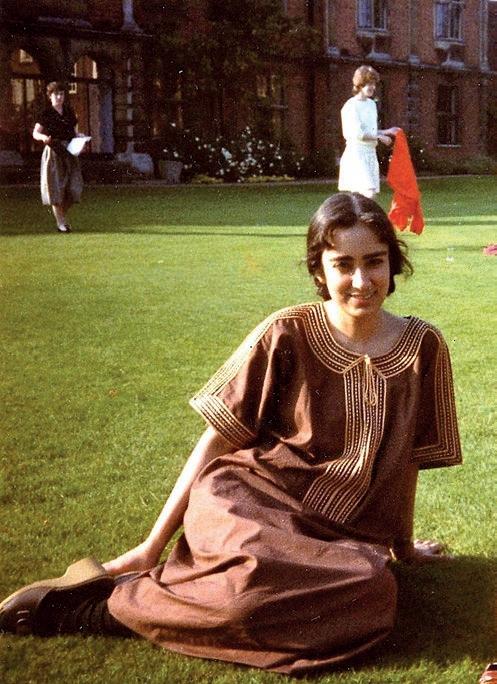

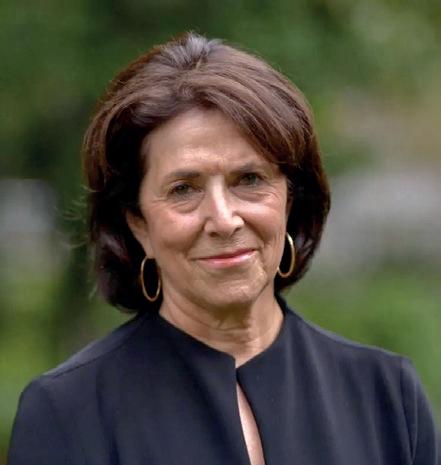

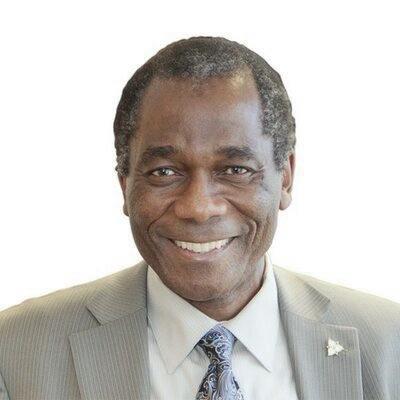


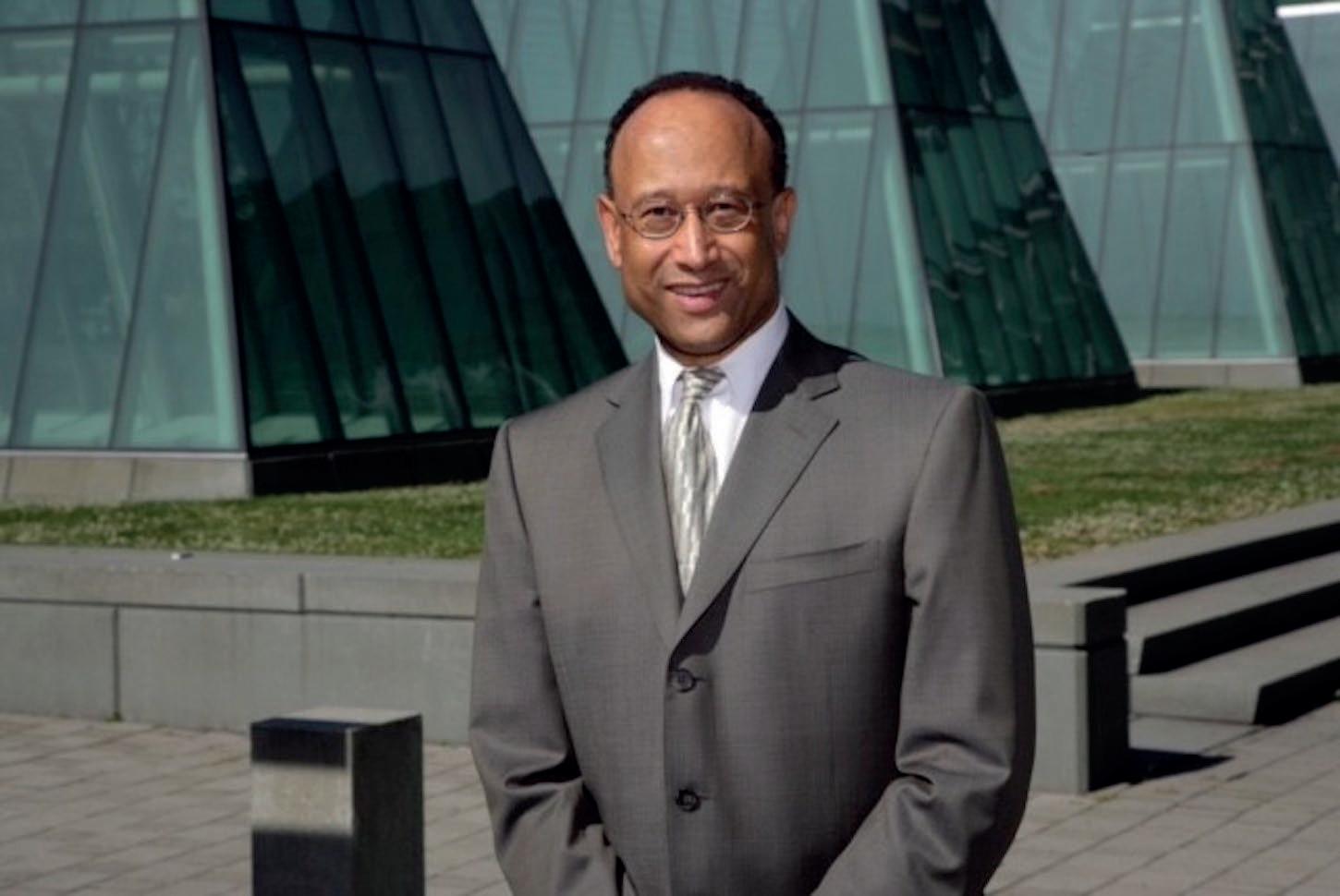
This year sees the launch of the first ever comprehensive Rhodes Scholar Oral History Project. Over the last 18 months, we have held conversations with over 150 Scholars. Our aim? To capture and share the individual experiences and voices of Alumni around the globe, highlight the human interconnectedness of our community and elevate the myriad ways that Scholars across generations fight the world’s fight.


What’s the best way to mark a milestone? Gather your friends and family together and enjoy a party? Take some time to reflect on what’s gone before and what’s to come? Those of you who joined the Rhodes 120th anniversary celebrations in 2023 will know that we took the opportunity to do both. Over one glorious long summer weekend, we enjoyed all the things that Rhodes Scholars do best: sharing opinions, ideas and friendship; disagreeing (agreeably, of course); and, most of all, thinking together about how best to fight the world’s fight. As we did so, an idea started to form. What if we extended the conversation, and began to record the life experiences and thoughts of our community of Scholars? And with that, the Rhodes Scholar Oral History Project was born.

Over the last 18 months, we have interviewed over 150 Scholar Alumni, recording their conversations for posterity. So far, Scholars from Malaysia to Maryland have participated, with Rhodes experiences spanning nearly 60 years. Participants have included those with careers and experiences in the public eye, and also those who have fought the world’s fight every bit as powerfully, but in perhaps less public ways. Interviewers included Rhodes Staff across several teams, as well as Scholars in Residence, and interviews largely took place online.
The aim was simple: to capture, in as much depth as possible, the many and varied lives of this remarkable community. The questions we asked each Scholar were broadly similar, but they were only ever jumping-off points, as each Rhodes Scholar has a unique story to tell. The stories that resulted included moving reflections by participants: about themselves, about the world and about the Scholarship.
As soon as we asked our participants to tell us about their earliest experiences, it became clear that no two Rhodes journeys are identical. Some Scholars referred to their early lives as privileged, while others reflected that ‘there were no schools to speak of’, or recalled lives impacted by war, partition and apartheid. A theme that quickly emerged was the transformative power of education and, especially, of dedicated teachers: one Scholar shared memories of being discouraged from even considering college until his teacher said, ‘No, you have what it takes.’ And almost every Scholar we spoke to had connected early in life with the idea of service. Sometimes, this was tied to seeing injustices around them in childhood (in the case of the Scholar who cycled around apartheid Johannesburg as a child, stealing the ‘Non-White’ signs on benches). Often, it seemed to be a feature of personality that was just there from the very start (‘Why wouldn’t you give back, if you could?’).
‘ Each Rhodes Scholar has a unique story to tell ’
One interviewee surely spoke for many when he said, ‘I was an accidental Rhodes Scholar.’ Some had barely heard of the Scholarship at all before they applied (‘I thought it was spelled R-O-A-D’, one confessed). Others knew about it but didn’t ever think it could be for them. The selection process itself could be tough, especially for women in the first years when they were eligible for the Scholarship (‘I have to say the experience was not a good one’), and for black applicants in times when the Scholarship was still predominantly the preserve of white students (‘There was only one other black candidate… I thought, “Well, that’s it, they’re not going to pick two black students out of four”’). For many, though, interviews proved surprisingly enjoyable (‘a very relaxed and positive experience’). And every single Scholar remembers the moment when they learned they had been selected (‘I thought, “Did I hear that right?”’).
Almost all the Scholars we spoke to agreed that Oxford had broadened their horizons immeasurably. Whether it was because of the tutorial system (‘I learned how to learn’), the other students they encountered (‘The friendships I made were so formative’) or just the chance to reflect (‘It gave me a lot of time to address the parts of my life that I hadn’t really paid attention to in school’), Oxford was, for many, ‘A kind of crucible’. For several Scholars in Oxford during the 1960s and 1970s, there was also the joy of starting their married lives there (albeit only after their first year, and only with the Warden’s permission, as the rules back then demanded). As one Scholar beautifully put it, it was ‘a dream come true’. But not everyone found their time in Oxford so sunny. Indeed, the weather was a shock to most, and the food even more so. And for some, the experience of coming to Oxford was far from easy. One Scholar reflected that while getting a Rhodes Scholarship was extremely uplifting, the negative was how separated he had become from his prior life that had been impacted by being surrounded by poverty and drug abuse.
Cecil Rhodes made it clear that Rhodes Scholars should ‘esteem the performance of public duties’ as their ‘highest aim’. Many of those we interviewed took time to reflect on the legacy of the Scholarship and of Rhodes himself, from Kumi Naidoo (South Africa-at-Large & Magdalen 1987), who ‘would be happy if we changed the name of the Scholarship’ to Robert Calderisi (Québec & St Peter’s 1968) whose own work on Cecil Rhodes has explored ‘the complexity of history’.
Rhodes himself could surely not have envisaged the community of Rhodes Scholars as they are today, but he would doubtless recognise their shared interest in ‘public duties’. That takes many forms, and the Rhodes Scholars we spoke to work across politics, advocacy, law, finance, teaching, research, conservation work, writing, the military and the arts. In all of their chosen fields, they are making a difference in the world. Some have taken what might be seen as traditional routes, but still with a transformative edge. Others have turned away from the well-trodden paths. Oftentimes, they have learned that fighting the world’s fight does not have to be about the grand gesture. As Nick Allard (New York & Merton 1974) notes, ‘The worthwhile thing isn’t necessarily the one that’s most prestigious.’
For many of the Scholars who took part in the project, other Rhodes Scholars have been and continue to be an important source of support and inspiration. As Ron Stevenson (Newfoundland & Oriel 1978) acknowledges, the Rhodes community is ‘a great resource of people to turn to’. For Loyiso Nongxa (South Africa-at-Large & Balliol 1978) ‘There is still something different about the Rhodes community. It’s people who care about making a difference, in a small way or a big way.’
We ended each interview by asking Scholars whether they had any words of wisdom to offer to Scholars in Residence. Many offered advice born of their own challenges: ‘You tend to do best when you let go of the fear of failure’ (George Stephanopoulos (Ohio & Balliol 1984)); ‘Know that you are worthy, that you matter’ (Sannah Mokone (South Africa-at-Large & Jesus 2011)). Others acknowledged the responsibility that comes with the Scholarship. In the words of Mandisa Mbali (KwaZuluNatal & St Antony’s 2005), ‘The Rhodes Scholarship is a privilege. You’ve got to leverage that to move the world forward.’
What have we learned from these in-depth conversations? First and foremost, that Rhodes Scholars never have been and never will be just one type of person. The Scholarship is about bringing together individuals from an ever-widening diversity of backgrounds, communities, outlooks and achievements. No matter what their differences, one common theme stood out in all of our conversations: namely, the importance of a life lived beyond self, and the sense of fulfilment that comes from that. As Edwin Cameron (South Africa-at-Large & Keble 1976) powerfully put it, ‘There is so much you can do joyfully and constructively to change the world.’
‘ For some, the experience of coming to Oxford was far from easy’
Profiles of selected interviewees follow here. You can see the full range of interviews and find out more about the Rhodes Scholar Oral History Project by scanning the QR code:


“ There is no better way of developing a leader than through the Rhodes Scholarship ”
Born in Chingola, Zambia, Chisanga Puta-Chekwe studied at Birmingham University in the UK before going to Oxford to read for a second undergraduate degree in PPE. Returning to Zambia, he practised as a lawyer, focusing on human rights, which led to his detention as a political prisoner for three years. After moving to Canada, he founded the Chekwe consultancy before going on to take roles in Canadian public service, including serving as Deputy Minister for Citizenship and Immigration. Puta-Chekwe is now President of the Masomo Education Foundation, and he continues to serve on Rhodes Scholarship selection committees for Zambia.
“ Being detained was a terrible thing, but I would not have been honest with myself if I had just sat back ”

“ Oxford was so valuable: to have this time where you were able to just let things flow through you ”
Greg Hicks studied at Yale before going to Oxford to read for a BPhil in comparative literature. After graduating from the University of Texas School of Law, he practised law and then took up a post at the University of Washington in Seattle. There, Hicks switched his area of focus to issues of water law, property law and history and public lands. He continues as Professor of Law at the University of Washington in Seattle and is involved in a range of projects across Spain, the US and South America, exploring natural resources and architecture. Hicks also serves on the boards of The Nature Conservancy of Washington and the Pacific Forest Trust and is an adviser to the Officer of the Washington State Attorney General on water law and policy matters.
“
If you ever find you need to start over, do it. It’s worth the effort. It’s worth the time ”

“ The Rhodes Scholarship was the perfect thing that came along in my life ”
Born in the Khyber Pakhtunkhwa province of Pakistan, Humaira Khan studied privately before going to Oxford to read for a BA as the first female Rhodes Scholar from Pakistan. After Oxford, she completed a master’s degree in international relations at the Johns Hopkins campus in Bologna before moving to Johns Hopkins in the US to complete her PhD in environmental sciences. Khan then returned to Pakistan where she worked for London-based NGO LEAD and for WWFPakistan whilst also opening and running her own primary school in the city of Gilgit. She later joined COMSATS University in Islamabad, and she continues to publish and carry out research on environmental and developmental issues.
“ My motivation is to continue working in developing countries, especially in the fields of education and the stewardship of natural resources ”

“At Oxford, I figured who I was a little more, but coming out wasn’t easy. It was very raw and challenging ”
Lisa Grushcow studied at McGill University before going to Oxford to take an MPhil and then a DPhil in theology and religion. In 2003, she was ordained a rabbi at the Hebrew Union College – Jewish Institute of Religion in New York City. Grushcow then joined Congregation Rodeph Sholom in New York City and held the position of Senior Associate Rabbi. In 2012, she assumed the role of Senior Rabbi at Temple Emanu-El-Beth Sholom in Montreal. Grushcow is the author of Writing the Wayward Wife: Rabbinic Interpretations of Sotah and editor of The Sacred Encounter: Jewish Perspectives on Sexuality
“ The Rhodes community fosters intentional conversations around difference, and my hope would be for more of that ”
Montek Ahluwalia (India & Magdalen 1964)
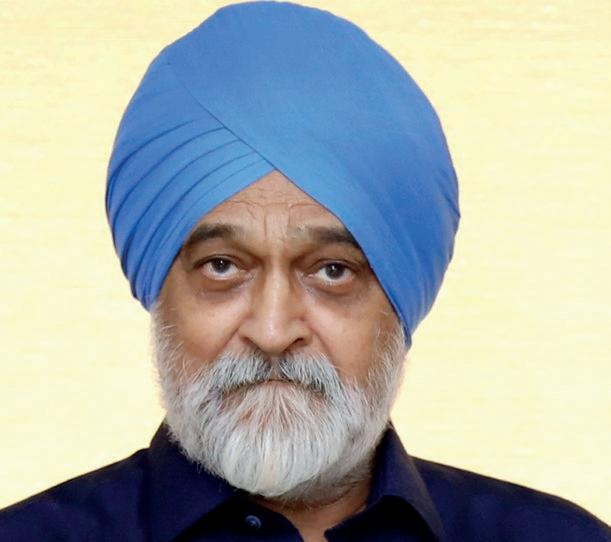
“ I think those of us who get Rhodes Scholarships have lucked out ”
Born in Rawalpindi, India (now part of Pakistan), Montek Ahluwalia studied at St. Stephen’s College, Delhi before going to Oxford to read for a second BA in PPE at Magdalen and then an MPhil at St Antony’s College. After a period at the World Bank, he returned to India and his work became a key part of the country’s economic reforms during the 1980s and 1990s. Ahluwalia served in posts including: Special Secretary to the Indian Prime Minister (1988-1990); Secretary, Department of Economic Affairs, Ministry of Finance (1993-1998); and Deputy Chairman of the Planning Commission of the Government of India (2004-2014). He currently holds the position of Distinguished Fellow at the Centre for Social and Economic Progress.
“ The main thing is to express your view clearly, even when it’s against the dominant tide ”
William Wakelin (New Zealand & University 1964)

“ I think, as a Rhodes Scholar, you’ve got to risk yourself a little bit ”
Born in Arapuni, William Wakelin studied at Auckland University and the University of Canterbury, Christchurch before going to Oxford to read for a DPhil in chemical engineering. After a period working in the UK, he returned to New Zealand and followed a career in consulting engineering. Wakelin’s work as President of the New Zealand Rhodes Scholars Association was invaluable in encouraging and supporting students applying for the Scholarship. He was also the driving force behind the New Zealand Rhodes Scholars Association Oral History Project, whose interviews are now held by the National Library of New Zealand.
“ We were able to interview people who had really made their mark. It was especially good to make a record of their achievements ”
Lissa Muscatine (California & Wadham 1977)

“ I have to say that Oxford was not entirely welcoming to women at that time ”
Lissa Muscatine studied at Harvard before going to Oxford as part of the first class of women Rhodes Scholars. After Oxford, she worked as a reporter at the Washington Star and Washington Post and she went on to become a valued speechwriter for both President Clinton (Arkansas & University 1968) and First Lady Hillary Clinton. In 2011, she and her husband, Bradley Graham, became co-owners of Washington, DC’s Politics and Prose bookshop. Muscatine is now working on Hillaryland, her book about her experiences at the heart of Hillary Clinton’s circle of advisers.
“Agency includes being able to make a choice that other people aren’t expecting, if you need or want to. That is real freedom ”
Naidoo (South Africa-at-Large & Balliol 1978)
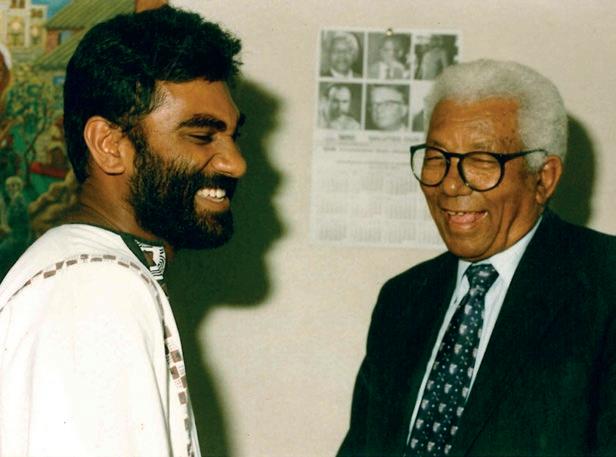
“ I remember saying that I thought Rhodes would turn in his grave at the thought of my having the Scholarship, and that I wouldn’t mind that ”
Born in Durban, Kumi Naidoo was an activist from an early age. Exiled from South Africa following his role in the anti-apartheid struggle, he continued to work for social justice and is now a human rights and climate justice activist who has held roles including Executive Director of Greenpeace International, Secretary General of Amnesty International and SecretaryGeneral of CIVICUS, the international alliance for citizen participation.
“Activism is not a popularity contest ”
Leane (South Australia & Magdalen 1995)
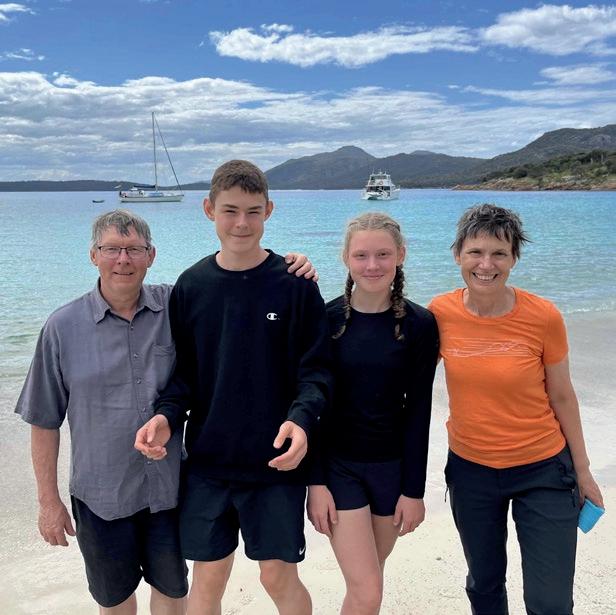
“ Oxford did feel like moving from the periphery to the centre ”
Born in Port Pirie, South Australia, Elle Leane studied at the University of Adelaide before going to Oxford to read for a DPhil in English. Returning to Australia, she took up an academic post at the University of Tasmania and began to work on cultural aspects of human engagement with Antarctica, publishing Antarctica in Fiction in 2018. Leane is also the Associate Dean Research in the University of Tasmania’s College of Arts, Law and Education. Alongside her academic work, she has continued to support the Rhodes Trust, serving on selection committees, as Tasmanian Secretary and as one of Australia’s deputy national secretaries.
“ Getting a better sense of yourself means you don’t need to do things that stretch you out of shape ”

“ My time at Oxford gave me the opportunity to think more deeply about what was right rather than what would work ”
George Stephanopoulos is a television host, political commentator and former Democratic advisor. As a Rhodes Scholar, he took a master’s degree in theology at Oxford and then continued his work in politics, becoming White House communications director and later senior advisor for policy and strategy for President Bill Clinton (Arkansas & University 1968). After leaving the White House, Stephanopoulos became a journalist, and he is currently co-anchor of Good Morning America and host of This Week.
“ I’m doing what I can to give people the tools they need to make decisions about their lives ”
Ursula Werner (Florida & Magdalen 1985)
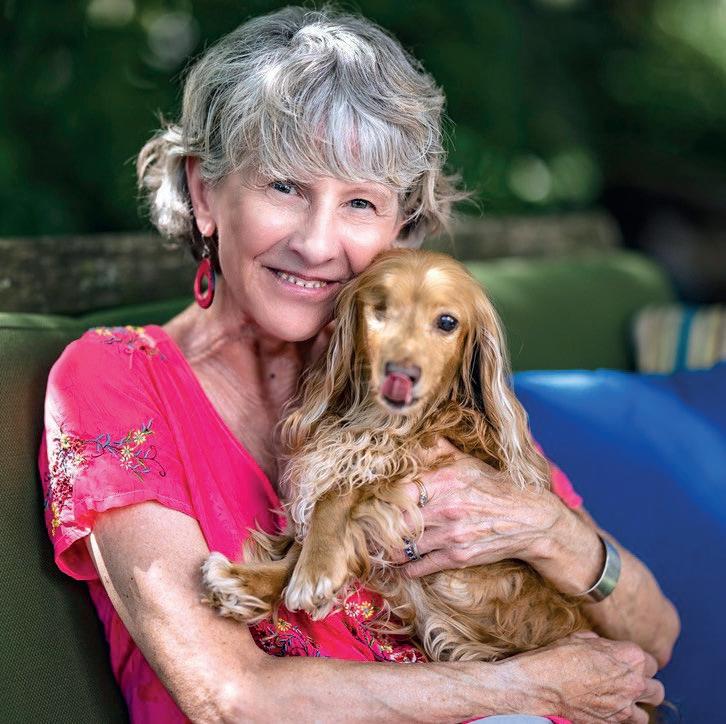
“
My time at Oxford was very important for my emotional growth ”
Born in Freiburg, Germany, Ursula Werner grew up in the US and studied at Duke University before going to Oxford to read for an MLitt in English. She returned to the US and attended Yale Law School and then went into practice in human rights law and for the Justice Department. While working in law, Werner began to explore her German heritage through fiction. Her first novel, The Good at Heart, came out in 2017 and explored her great-grandfather’s role as a highranking official under Hitler. Her second novel, Magda Revealed, is now out.
“ You can learn a lot from the painful parts of your life. Difficult experiences are not for nothing ”
Edwin Cameron (South Africa-at-Large & Keble 1976)

“ I made profound friendships at Oxford, which was such a joy ”
Born in Pretoria, Edwin Cameron studied at Stellenbosch University before going to Oxford to read law. Returning to South Africa, his early career combined academic work and legal practice. Cameron was first appointed to the bench by President Mandela in 1994, who called him “One of South Africa’s new heroes”. He went on to serve as a Justice at the Constitutional Court of South Africa and has been described as “the greatest legal mind of his generation”. An activist across the field of human rights, Cameron is particularly known for his antiapartheid stance and for his work on HIV/AIDS and on LGBTIQ rights.
“ It’s a truism, but it’s also a truth: privilege does bring responsibility ”
Interviews with Scholars were carried out by Rhodes House staff and Scholars in Residence alike, some in person and many online. One of our interviewers shares her reflections on this work.
When we conceptualised the Rhodes Scholar Oral History Project, we envisioned that the project would capture the varying journeys that Scholars take after Oxford: all of the ways that they go on to fight the world’s fight. The project has illuminated this in inspiring ways, and we look forward to continuing to collect stories in the lead up to the 125th Rhodes Anniversary – and likely beyond – to continue to capture these inspiring journeys.
A perhaps more unexpected impact of the Oral History Project, though, is the illumination of the myriad paths that Scholars take before Oxford.
Outside the Rhodes community, there is sometimes a misconception that there is a Rhodes Scholar ‘type’, and that many future Scholars have their sights set on Oxford for several years before they apply. In fact, the Oral History Project has shown us that for most the decision to apply for the Rhodes Scholarship was much more serendipitous.
Often, it was the encouragement of a teacher, friend or mentor that raised the Scholarship to the awareness of the applicant. ‘Have you thought about the Rhodes Scholarship?’ many future Scholars were asked, and often that question set in motion a series of events that they would go on to describe as ‘transformational’, a pivot point in their lives.
‘
The Rhodes Scholarship is, in so many ways, about ripple effects’
The Rhodes Scholarship is, in so many ways, about ripple effects. When Rhodes Scholars leave Oxford, they create impact and change in their local and national communities, and in some cases the ripple of that impact extends around the globe. It’s tempting to imagine that the beginning of that ripple – when the stone is thrown, if you will – starts in Oxford. What the Oral History Project has shown us is that the stone is actually thrown into the water much earlier; as much as the story of the Rhodes Scholarship is about Scholars themselves, it is also about the countless family members, friends, teachers, mentors and coaches who supported Scholars on their way to Oxford and, often, encouraged them to apply for the Scholarship. The stone that creates this global ripple has been thrown every time a professor, advisor or other trusted community member illuminated for a future Scholar their potential, and held up a mirror in which they could see themselves as a Rhodes Scholar.
After having the distinct honour of being involved in the Rhodes Scholar Oral History Project, I am reminded of the privilege that each of us has every day to hold up this mirror for others, and reveal to them the potential that we see. In a world with incredibly challenging and complex problems to solve, we all have the capacity to throw that stone, and start that ripple. We all have the ability to help each other –and ourselves – to see the remarkable impact that we can have.
Alison Van Rooy (Manitoba & Lincoln 1990) took her DPhil in international relations and has spent most of her career on international policy challenges. She now helps nonprofits and university teams plan their own strategies (vanrooystrategies.org). Here, she reflects on what constitutes a life well lived in the service of others.
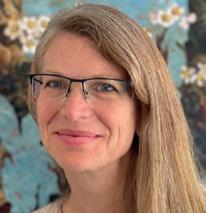
Ithink about impact a lot.
Much of my 30 years post Oxford has been spent thinking about the international development policies governments should enact to make a difference in poverty alleviation. That was the focus in my research advocacy in a think tank, and it was the point of my work inside government, figuring out how to make good policy stick. These days, in the next phase of my career, I think about impact in yet another way. I now help non-profits and university teams make decisions about their own futures, their next strategies. I push them to be as concrete as possible, asking, ‘If you were wildly successful, what would be measurably different in the world?’
First of all, we must credit the invisible work we all do. Raising children, helping friends and neighbours in crisis, supporting ailing parents or trying to be a thoughtful human being while we are going through grief, divorce or illness of our own – all this work has impact, even if no one sees it. All those examples were part of my life, and I know many will have carried much heavier loads. None of us gets an award for the invisible, so we must chalk it up ourselves.
We should be firm about direction and agnostic about path
That is a tough question. Indeed, it was the same thing I asked myself when I arrived back in Oxford last year for the Oxford Next Horizons Programme (ONHP), 34 years after arriving for the first time as a Rhodes Scholar from the Canadian prairies. Looking back on my last three decades and looking forward to the next however many, could I tell you what measurable difference I made – or could make – in the world?
Musing on the six months of reflection with ONHP, I suggest that there are other ways to think about a life well lived in service to others.
WE C an ’T SEE a Ro U n D THE Co R n ER
Secondly, we need to acknowledge another obvious truth: we don’t know what is going to happen next in our lives or in the world. I don’t mean that we shouldn’t plan – I do strategy planning, after all – but rather that we should be firm about direction and agnostic about path.
For instance: you may have in your future (or past) a commitment to stronger education for girls and women in your home country. That’s the WHAT, the direction that motivates you to get out of bed in the morning. Your theory of change – HOW you might do that – might involve academic research, service delivery, political advocacy (or political office), journalism, literature (think of Dickens!), AI coding or other work that hasn’t yet been invented. The HOWs will always change: with your interests, with society and politics, with technology and with your phase of life and family. Looking back, I couldn’t have guessed at the paths I would follow – or the one I’m following now.

The third obvious point – and particularly obvious in hindsight – is that we can’t do anything entirely alone. Even solitary work – writing novels, for instance –depends on a whole system of support by editors, publishers, marketing people and most of all, readers. In both my advocacy and government work, we needed all sorts of people to be part of effort: convening, consulting, cajoling and arguing, all to make the decisions better in the end.
If I could travel back in time, I would focus even more on building that community of effort. I would pay more attention to what was going on in neighbouring networks, where people travelling a similar path were also in need of community.
For those of you who built (or are building) a cohort from their time in Oxford, put time and energy into those relationships. ‘Networking’ is not just something we do to get the next job, it is part of lifelong strategy for moving mountains.
Finally, I suggest that we all take the rocking chair test. There are many variations on this visualisation exercise, but at its core: Imagine you are at the end of your life, sitting in your rocking chair on your porch. What are you proud of? What do you regret?
For me, I am instantly assailed with memories of working too late or too much when my children or my ailing parents should have had more of my time. I am also reminded how much energy I spent spinning my wheels in places that weren’t contributing – or contributing enough – to a better world. The rocking chair test helps us refocus for the next phase of our lives.

All this brings me back to the question that started my musings: ‘If you were wildly successful, what would be measurably different in the world?’
My answer today is smaller than it was when I left Oxford in 1995, less ‘save-the-world’ by myself and more ‘support-the-drivers-of-change’ in my network of local and international nonprofits. I am committed to the same vision of a better world that launched me all those years ago, but I have a different idea of what ‘fighting the world’s fight’ means. It starts with building communities of changemakers like you.
Danny Sriskandarajah’s (New South Wales & Magdalen 1998) new book, Power to the People: Use Your Voice, Change the World argues that, no matter how much we might feel our voices don’t matter, we do have the ability to make a difference. Here, Danny shares his thoughts with Lysa John, Executive Director of the Atlantic Institute.
Danny Sriskandarajah has become a leading voice in the third sector. Previously Chief Executive of Oxfam GB, he is now Chief Executive of the New Economics Foundation and has been Visiting Senior Fellow at the International Inequalities Institute at LSE. In January 2025, he and Lysa John joined Armine Ishkanian (Executive Director of the Atlantic Fellows Social and Economic Equity Program and Professor in the Department of Social Policy at LSE) and Jo Swinson (formerly leader of the Liberal Democrats in the UK Parliament and now Director of Partners for a New Economy) at LSE for a discussion of Power to the People and the ideas behind its creation.
Lysa: One of the many aspects of your book that really spoke to me was when you tell your story, including where you came from and where you got the trust that you have in organising and community action. How has your own background shaped your work, and how did your personal experience of civil society groups lead you to write this book?
lived in Papua New Guinea for a time and then, when I was ten, we moved to Australia.

‘ I felt an obligation to speak up against injustice for those whose voices were not being heard ’
Danny: In some ways, Power to the People began its journey while I was a visiting fellow in the spring of 2023 at the Inequalities Institute at LSE, but the ideas that underpin the book certainly go much further back, to what I experienced as a child. I was born in Sri Lanka, but as minority Tamils, our community was subject to discrimination by the Sinhalese majoritydominated government. There had been outbreaks of communal violence and my own uncle had been beaten to death by a Sinhalese mob in the hospital where he worked. There were rumours of an all-out pogrom on Tamils being organised, and my parents decided that we had to leave. We
It was all very novel for me. I remember a girl rubbing the skin on my arm to see if the brown would come off. But most of all, I recall my delight in all the things I could do and be a part of. Things that many would take for granted –being selected for stuff on the basis of merit or being allowed to have a political voice – were treasured in my household. My parents and our community set up a Tamil radio station and held fundraising events to support refugees. The work was all-consuming for our community. Decades later, I have come to recognise just how much the example my parents set in nurturing a sense of activism has shaped my personal and professional journey ever since. I felt an obligation to speak up against injustice for those whose voices were not being heard, and I felt powerful : I had the means and opportunities to change the world for the better through my actions. I don’t mean some sort of superpower; just the realisation that I had an everyday freedom and an agency that was profoundly powerful.
Lysa: What was your aim in writing the book?
Danny: I think we’re living in a moment of human history where the ways that we’ve chosen to organise our politics and our economics have left us beset with problems. The aim of Power to the People is simply to convince readers that we can be and must be hopeful that we as humans can recreate new systems, evolve fundamentally new ways of organising our politics and economics to be much more sustainable, to be fairer, to be more equitable. The book is not particularly analytical. It’s intended for a lay audience and it’s full of facts and figures, but mostly, it’s full of stories. I use them
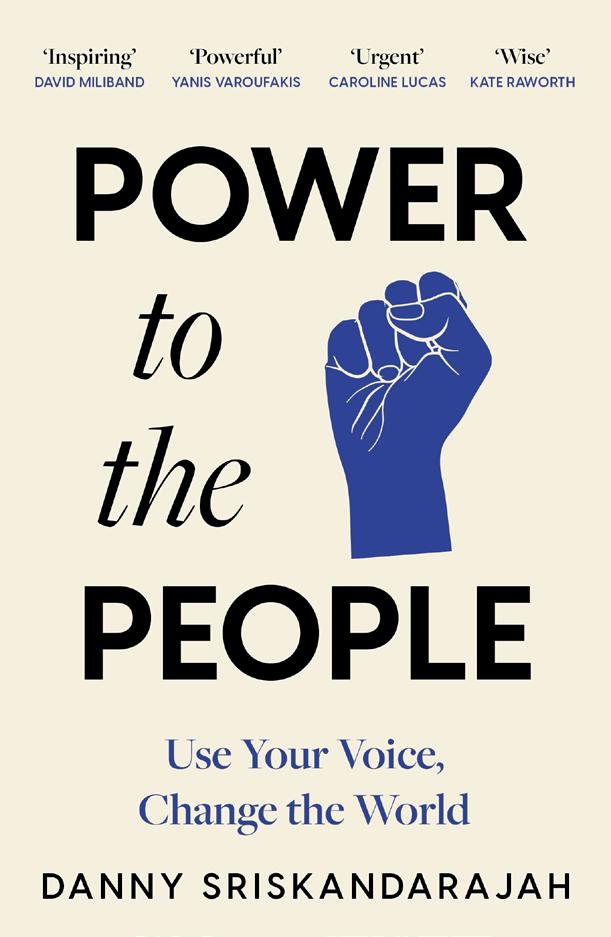
to illustrate the point I’m trying to make, that our current ways of organising our politics and economics is broken, but equally, that we can reimagine ways of doing both in far more interesting and sustainable ways.
Lysa: The fundamental aspect of this book for me is that it isn’t just an intellectual framework of how things need to happen. It’s really rooted in the heart of what it means to keep showing up and keep reaching for more. How important did you feel it was to give practical examples that people could look to?
Danny: It was crucial to me that people could read the book and feel that sense of real possibility that is critical to enacting change. Throughout my life, I’ve been a member of countless voluntary groups working together to take practical action – from providing young refugees with opportunities to play football to taking part in global protests calling for climate action. I have felt privileged to be part of some of the most incredible manifestations of ordinary citizens coming together to take collective action. You might feel that your voice doesn’t matter, that those in power are not listening, but there are so many things we can do together.
Lysa: Can you give us an example of one area where you’d like to see change?
Danny: I think that there are all kinds of ways in which we might want to augment electoral democracy with much more deliberative systems of decision-making. Take citizens’ assemblies. In many parts of the world, we’ve seen successful examples of how groups of citizens, selected randomly, can come together to consider thorny, difficult issues that society is grappling with, whether that’s abortion in Ireland or climate change in France. These deliberative mechanisms have been shown to be far better at coming to a democratic decision in a more inclusive way. What’s especially powerful is that they also lead to greater buy-in, and ultimately, that’s the true test of a democracy. It’s not just the idea that the majority wins, but that the minority who may have lost out are happy to tolerate the fact that the majority wins.
Lysa: You and I have both worked in CIVICUS, which is a global alliance of civil society organisations and activists working to strengthen civil society throughout the world. At the moment, many of us in the third sector are confronted with a very strong narrative about our efforts not working, about conversation not working, dialogue not working. What would you say to people who feel that civil society just can’t make a difference?
Danny: At every event I go to, when I speak about this book, somebody asks me, ‘Why are you so hopeful?’ It’s a fair question, given the problems we’re faced with. Polling shows us that we’re seeing both rising levels of voter apathy and a decreasing degree of trust in the system. How low does trust have to be before something breaks? And how high does inequality have to be before the social fabric starts to rip apart? But I suppose you could say that I am defiantly hopeful, and that’s because I believe that if we restore people to the heart of our political and economic systems, we can both address the injustices and inequalities within both of these systems, but also create far more sustainable systems and institutions.
Lysa: Yes! We don’t all have to be politicians in order to enable that, right? I think it’s very much about finding new ways to talk to each other, to engage with each other, to move out of the trap of there is one side against the other. It’s really important that one narrative of one superpower doesn’t cloud our understanding of what’s happening in the world. There’s a lot more nuance, and that nuance is at the hyper-local, sub-national and national levels that don’t hit the global media headlines. So, there’s always reason to hope.
Danny: There really is. Lots of polling evidence suggests that young people in particular do feel a sense of solidarity that transcends borders. They tend to identify as citizens of the world, because they recognise that we are in this together. Even as some nations retreat into protectionist policies, I do think there is a latent sense of solidarity that we can tap into to push back against some of what we have.

To hear the full discussion from the 27 January 2025 event, go to the LSE events podcast on LSE Player (www.lse.ac.uk/lse-player) and search for ‘Power to the People’ or scan the QR code

Look at the parapet of the newly remodelled convening centre in Rhodes House and you will now find a carved inscription in the southern African language |xam. Here, Rhodes Trustee Elleke Boehmer (South Africa-at-Large & St John’s 1985) and Oxford University DPhil candidate Luan Staphorst talk about |xam and their own role in this special project.
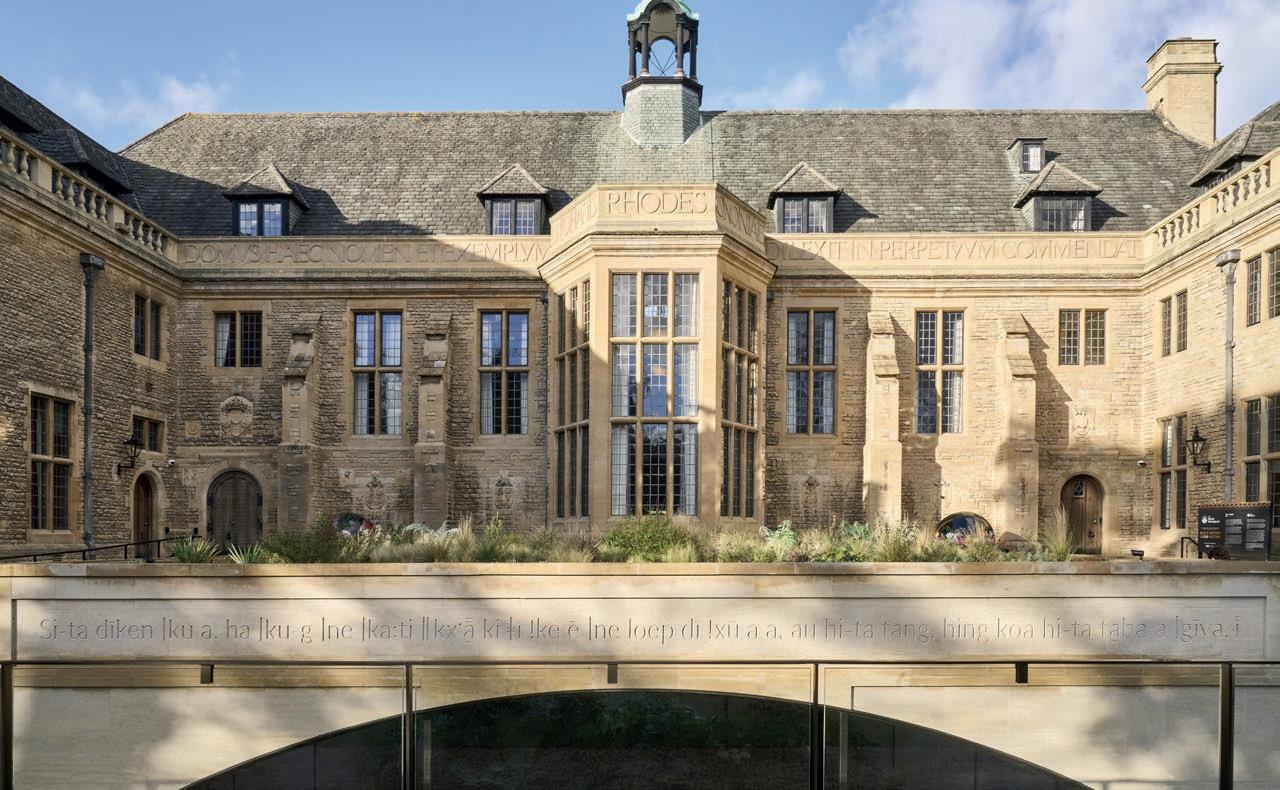
g R a PPlI ng WITH lEgaC y
The decision to sculpt this new inscription emerges from five years of legacy and inclusion conversations held across the worldwide Rhodes Scholar community. These rewarding but often tough exchanges were conducted in the awareness of important initiatives exploring histories of empire, like the #RhodesMustFall and #BlackLivesMatter movements.
The wording of the inscription – ‘Remembering and honouring in our work those who suffered and laboured to generate this wealth’ – was collectively chosen. Representatives from all generations of our community emphasised the importance of recognising that the Rhodes legacy was built on black land expropriation and
southern African people’s suffering and labour. We are scholars of literary and storytelling histories including those of Afrikaans and ǀxam. Rhodes House tasked us to find ways of translating the statement into ǀxam, in consultation with speakers and teachers of related languages that are still used.
WH y |X a M?
The idea arose at an early stage to use a southern African indigenous language that could not be immediately explained or decoded. It is, of course, significant that the language is tied to the South African region whose history Rhodes profoundly shaped, and where he lived and died. It is important that the experiences of people

marginalised by history are voiced, if at all possible, in their own languages, that their labour is, literally, put in their own words. In this way, we can question and resist ideas of frictionless cultural exchange around the world – exchange that is always dominated by the global north through the medium of English.
ǀxam is now a sleeping language, meaning that it is no longer used by any group as a mother tongue. It was spoken until the early 1900s by descendants of the Khoesan peoples and Afrikaners of the Northern Cape. Famously, it was recorded by the linguists Wilhelm Bleek and Lucy Lloyd at the end of the 1800s in Cape Town,
where a number of ǀxam men were incarcerated at the Breakwater prison, itself a symbol of colonial conflict.
Khoekhoegowab and other languages of northern South Africa, southern Namibia and Botswana, still spoken today, share complicated histories with ǀxam. The language lives on in the work of several leading South African authors, like Antjie Krog and Sylvia Vollenhoven. It is found in the motto on the South African coat-ofarms, where it reads ‘diverse people unite’, and now in the Oxford inscription.
With its marked click consonants like ! and ǀ, the ǀxam inscription brings an unmistakable African presence to the heart of Oxford. The carving signifies resistance to the takeover, control and possession of other lands and people that underpinned the colonial project.
RE aCHI ng a TR an S laTI on
Translating the text that emerged out of the conversations we had, was an exercise in balancing languages, worldviews and even translators. Although ǀxam was recorded in the late 1800s, it is no longer spoken. As lead translator, Luan therefore approached the new inscription as an opportunity to work with and highlight the various entanglements between the ǀxam recorded by Bleek and Lloyd and other related languages.
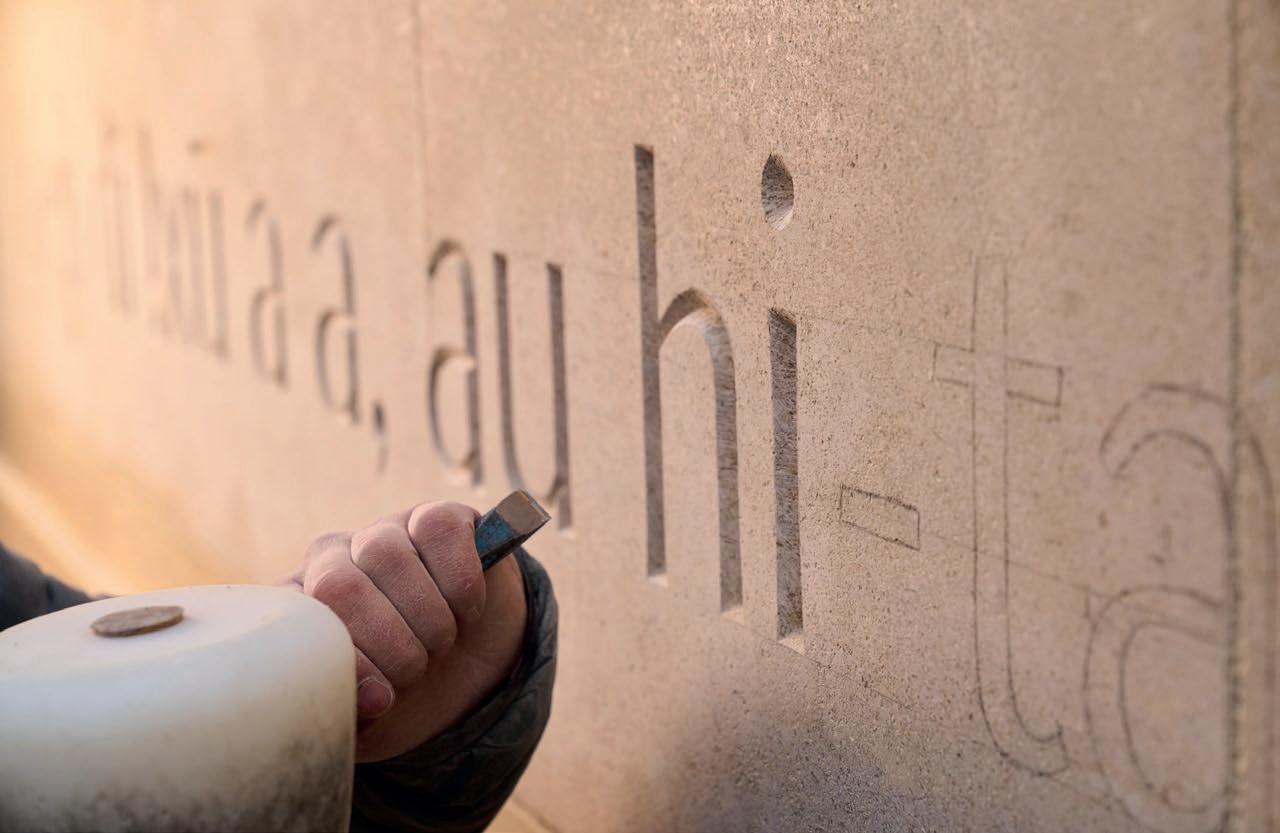

After Luan’s preliminary translation, South African linguist Menán du Plessis provided a retranslation based on her extensive work on compiling ǀxam’s first reference grammar. Luan then further revised and edited the translation in line with reflections on the links between ǀxam and other southern African languages (Nǀuu, Khoekhoegowab and Afrikaans).
The experiences of people marginalised by history are voiced... in their own languages... their labour is, literally, put in their own words
From October 2024, we worked together to develop and test the translation. Crucially, this included a visit to the Kalahari, a formative landscape of the Bushman peoples, and a consultation with Ouma Katrina Esau
and her granddaughter, Claudia du Plessis. Both teach Nǀuu (Nǀhuki), a language related to ǀxam.
CR a FTI ng THE RESP on SE
Built in a monumental style by British architect Herbert Baker, the original Rhodes House stands as a memorial to Rhodes’s memory. Baker worked extensively in South Africa, where he designed the Union Buildings, the seat of the country’s government. An inscription in Latin runs along the original parapet of Rhodes House and reads, ‘This house stands forever as a reminder to the Oxford he loved of the name and example of Cecil John Rhodes’.

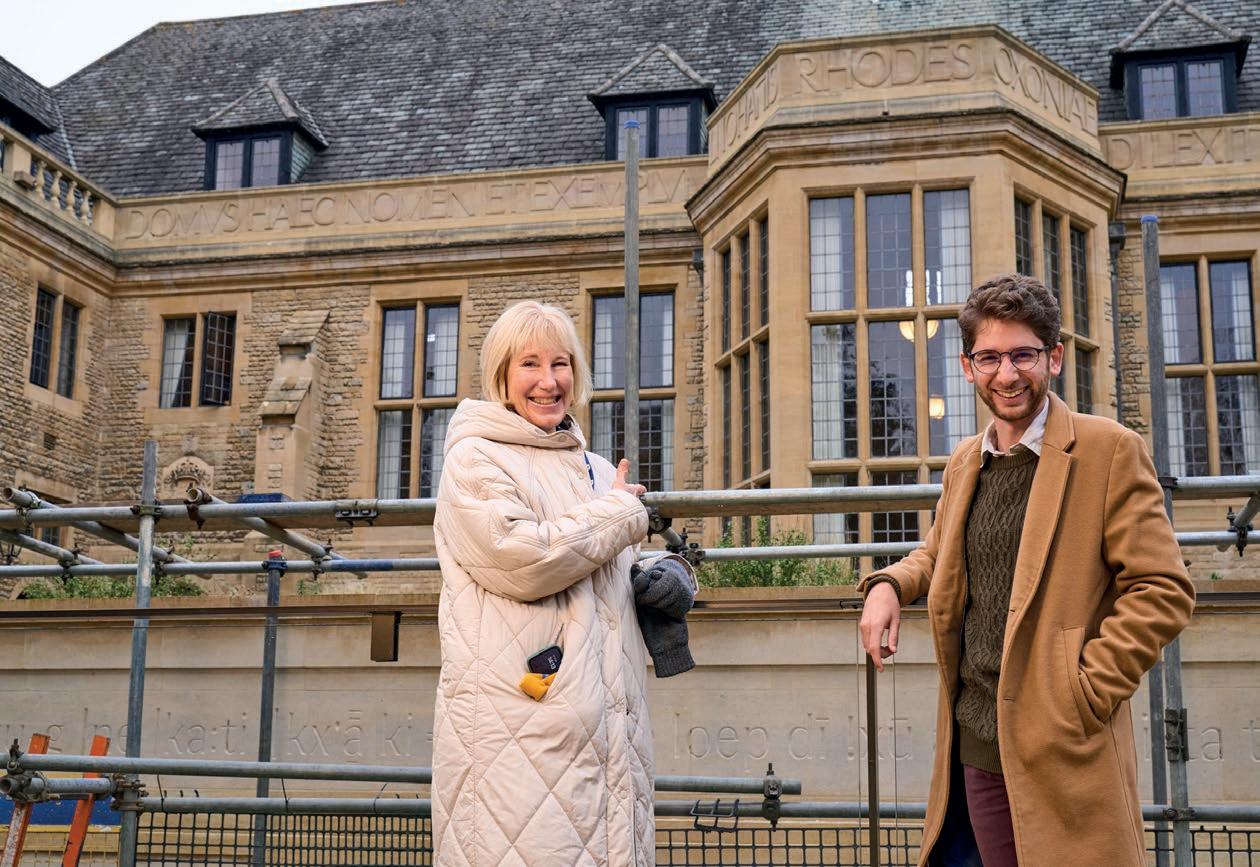
The new inscription appears in parallel, above the remodelled entrance to the new convening centre for Rhodes House. It sits lower down, closer to the viewer on the ground, and can be seen as being in dialogue with the Latin writing, not least as Latin, too, is a sleeping language.
The Ixam inscription was carved in January 2025 by UK stone carver Fergus Wessel, who works in response
to the longstanding English Arts and Crafts tradition. The inscription’s handcrafted aspect responds to the way the statement refers to the difficult labour of southern African peoples that produced Rhodes’s wealth. Two stones bearing translations into English of both the Latin and the ǀxam messages will appear near the inscriptions, so that viewers will be able to engage with the meaning and symbolism of both.
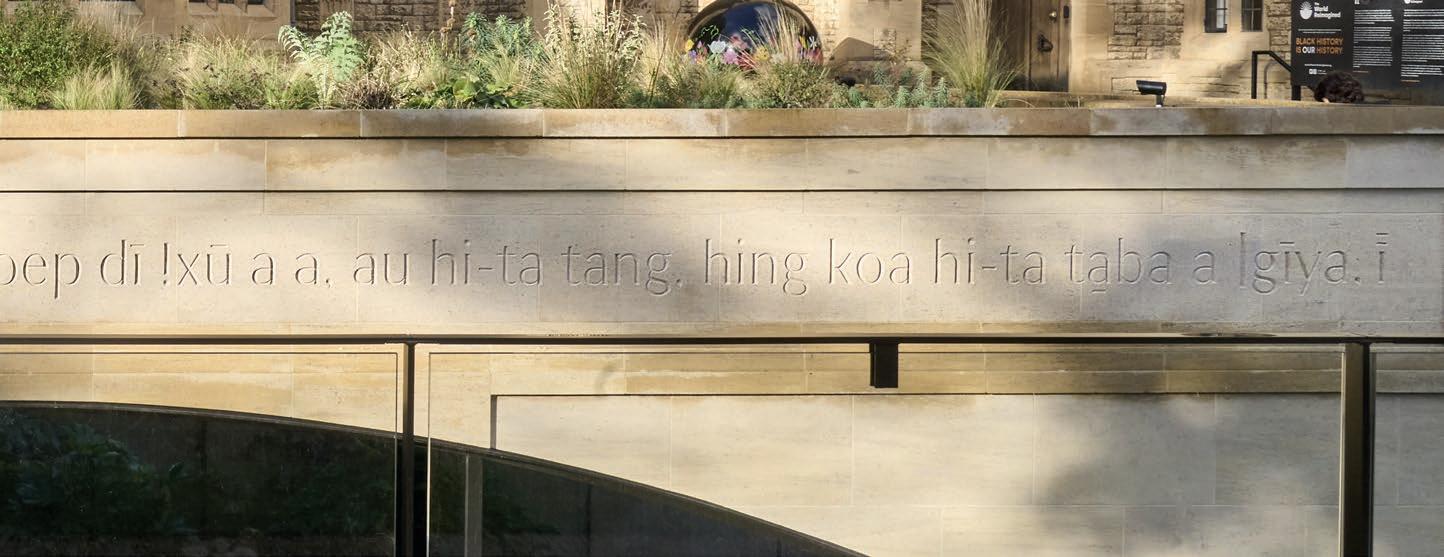
Maitha Alsuwaidi (Mansfield & United Arab Emirates 2021) is the Public Art Engagement Officer at Rhodes House/Atelier Zuleika. After completing her MSc in Visual, Material and Museum Anthropology, Maitha joined the team to run the public programme for artsrelated events at Rhodes House. Outside of this role, she is a performance artist, writer and art educator.
My role as a Public Art Engagement Officer at Rhodes House has given me the opportunity to pay close and sustained attention to the art on show at Rhodes House. The most exciting task has been activating and reflecting, often with others, on the politically engaged works in the exhibition Entangled: Southern African Artists Reflect on Colonialism, Monuments & Memory, curated by Julie Taylor and on show in Rhodes House until September 2025.
Since September 2024, I have explored different ways of engaging with the art of the seven artists in Entangled : Gift Uzera, Isheanesu Dondo, Muningandu Hoveka, Nicola Brandt, Raymond Fuyana, Tuli Mekondjo and Zenaéca Singh. I have done so through activations for the Oxford
Open Doors event in September 2024, consistent interactive art tours organised for both the Rhodes community and the general public, and the recent Entangled webinar, which attracted a global audience of over 100. The response to the exhibition has been an outpouring: from feedback forms filled out by attendees, to exhibition reviews, to internal conversations among Scholars and staff members alike. These ripple effects could not have taken place without the personal and fearless creative expressions of the artists, working with mediums including performance, photography and sculpture. The lessons shared by the diverse communities engaging with Entangled were made possible through the sustained attention and care of public art programming.

Embodied colonial legacies, embodied audience responses
All of the art in the Entangled exhibition remembers British and German colonial legacies and the troubling ways in which their presence persists today in South Africa, Namibia, Zimbabwe, and even globally, extending all the way to London and to Rhodes House. Some of the artists in this exhibition, namely Zenaéca Singh, Tuli Mekondjo, Gift Uzera, Muningandu Hoveka and Nicola Brandt, have highlighted the embodiment of colonial legacies in their art.
Zenaéca Singh’s sculptures and paintings are made out of sugar and sugar molasses. This choice of materials is a multisensorial invitation to grapple with the history of feminised Indian indentured labour work in sugar plantations in KwaZulu Natal. Working with sugar is an embodied practice of difficulty and labour for Singh, for it is a sticky material that is difficult to manipulate. This also triggered a sensory engagement for audiences. They immediately spoke about the teacups made of sugar and the physical discomfort they would feel when they imagined drinking out of them and they also related to domestic settings when thinking of sugar. The tours ended up being a collective learning moment as I linked these visceral audience responses back to Singh’s intention in referencing how the sugar economy had its impacts on domestic culture, but also insisting on the feminised component of her work,
shedding light on the marginal bodies and experiences of women in both indentured labour and domesticity.
Tuli Mekondjo’s works, ‘Kemeni! Ounona voluhepo! / Wail! Children of poverty!’ and ‘Momulonga ohatu ka nangala ongali / In the river, we will lay on our backs’, also speak to embodied creative practices. Through encountering the pieces, I asked audience members to point out and name the material components and aesthetic decisions, which helped us arrive at a discussion about the narrative woven by Mekondjo; that of the grief and physical toll that intergenerational experiences of colonialism have on the body, especially as an Omuwambo woman speaking about her own experiences of loss.

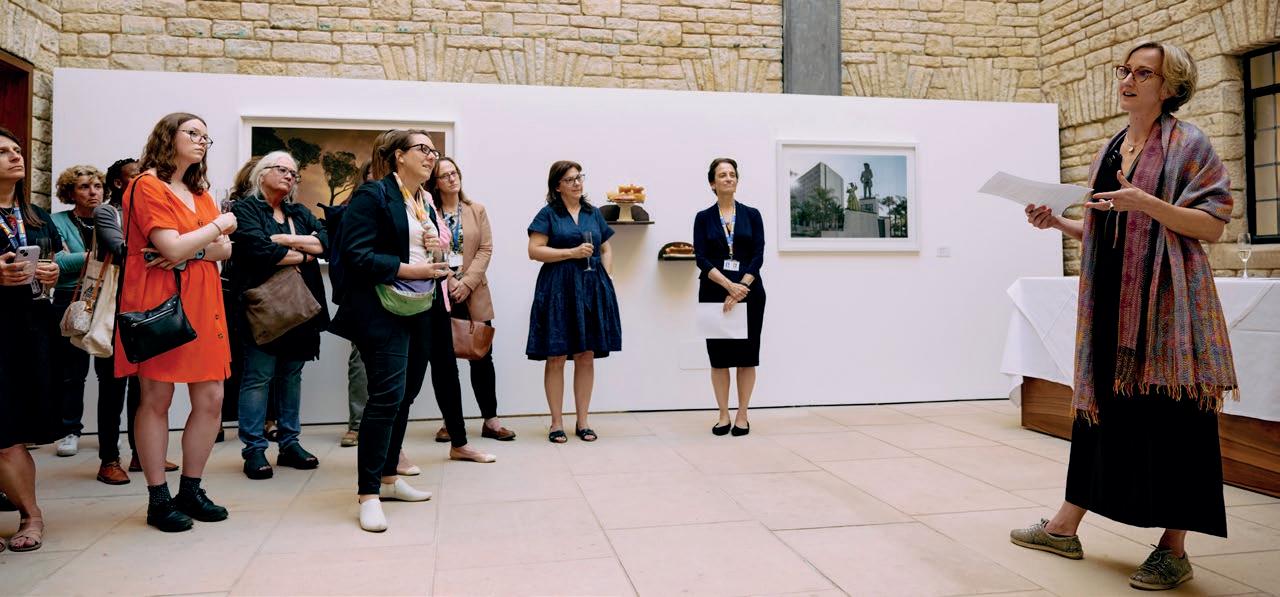
Rhodes House activated: not shying away from an uncomfortable built environment
The Entangled exhibition, in its mere presence within the space of Rhodes House, is a call for audience members to become reacquainted with their physical environment. Julie Taylor, the exhibition curator (Zimbabwe & St Antony’s 2003), spoke in the opening remarks of the Entangled webinar about the curation and decision-making of the exhibition.

‘The very fact’, she said, ‘that this is not a dedicated art exhibition space means that people “bump into” the art often unexpectedly, and it’s my hope that even these accidental meetings lead to learning opportunities.’
Some of the Entangled artists are directly in conversation with this topic. Raymond Fuyana’s painting ‘Regular Time: Kimberly’, for example, depicts a surrealist implosion scene of the Honoured Dead Memorial in the South African town of Kimberly. It points us to the fact that it was ordered to be built by Cecil Rhodes, designed by the colonial architect Herbert Baker, and built from stone quarried from Zimbabwe’s sacred Matopos
Hills. All of these points are reflected in Rhodes House; commissioned by the trustees of Rhodes’s will, designed by Baker, and containing Matopos stone at the bottom of the spiral staircase of the Rotunda. Asking audience members to detail this scene of implosion and then discussing the parallels between the memorial and the building we are in, has been an impactful way for everyone to consider the farreaching legacy of colonialism encountered in real time. Similarly, Isheanesu Dondo’s work, particularly the piece ‘Zimbabwe Bird’ is another call to grappling with symbolism and iconography in the built environment. Cephas Svosve, a 2020 Rhodes Scholar from Zimbabwe, attended one of the interactive art tours and spoke with depth and passion about the history and current relevance of the Chapungu (or Zimbabwe bird) for Zimbabweans, as well as of his experience of encountering its appropriation in the space of Rhodes House by Cecil Rhodes. This contribution, in a tour meant to centre the voices of audience members, was enriching and transformative for all, myself included.

‘ The response to the exhibition has been an outpouring’
Cultivating such an environment of sustained presence with art meant that diverse audiences could embody their learning (and unlearning) on colonial legacies through art, becoming more educated and articulate about these legacies. one attendee, Audrey Baldwin, ‘particularly appreciated how [Maitha] invited responses from the viewers, allowing people to find their own ways to some of the complex concepts at play’.
Sustained attention in the arts reminds us that there are always action points to assign ourselves, as members of a larger community. It also sheds light on the intersectional ways these impacts have manifested – which also means, the intersectional ways our solidarities and movements have and will manifest.
For example, feminist and queer approaches reverberated in the exhibition through the performance video ‘Man of War, Leave My House’, as well as through a book reading of the Queer Arab Glossary with editor Marwan
Kaabour, organised in collaboration between Rhodes LBGTQ+ and the public art programme.
Such sustained attention is an innovative approach, even for the arts industry. Nicola Brandt, one of the artists from Entangled, expressed that ‘this type of care and commitment is quite rare’. Nicola has also found that ‘creating sustained engagement is crucial for an organisation like The Rhodes Trust to go beyond what can be seen by some as tokenism or merely a symbolic or aesthetic gesture through exhibition-making.’
The successful public response to the Entangled exhibition probes us to think deeply about the power of committing to a public dissemination of knowledge through the arts. With this, community members will continue to show up and leave with action points on how to bring about change, one tour at a time, one event at a time, and one person at a time.

For almost 20 years, Ron Katz (Missouri & Balliol 1967) has been working with Howard University’s Institute for Intellectual Property and Social Justice, which was established to address the social justice implications of intellectual property law. Here, he shares his own journey within this ever-expanding area, supporting student athletes to grow awareness of their rights
Intellectual property (IP) is by far the most valuable property today. The ability, for example, to instantaneously reach millions of people with software and hardware protected by patents and copyrights creates generational wealth in far less than a generation. As intellectual property was burgeoning in value in the early part of this century, it was not normally associated with sports or with civil rights. As a business-oriented IP trial lawyer in Silicon Valley, I certainly did not make those connections.
That changed in 2007, when I was asked by some sports contacts to bring a lawsuit on behalf of a class of approximately 2000 retired NFL players against their union, the National Football League Players Association (NFLPA). That lawsuit – which involved the use of the players’ images in lucrative video games without the permission of the players or payment to them – opened my eyes to several issues.
First, the players were not very aware of their IP rights. This was particularly unfortunate because IP rights were probably their most valuable asset. Most of them were not at all affluent: many had not handled the money they made from football wisely and were not well equipped to make a living outside the world of sports. Exacerbating these problems was the fact that many had serious physical and mental injuries from football. Second, the amount of money being generated by the video games was significant. The NFLPA at that time was receiving about $100 million per year for the use of players’ images. Third, the way some courts were interpreting IP rights did not sufficiently take into account issues in minority communities. For example, some courts had ruled that the use of images in video games constituted free speech rather than the exploitation of a basic right to control one’s image in a commercial context.
The result of the case was a $28 million verdict against the NFLPA. Another result was that I came to realise that intellectual property could be a factor in civil rights, because many of the 2000 class members were African-Americans.
I started to work with an organisation started by Professor Lateef Mtima at Howard University Law School, a prominent HBCU (Historically




Black College/University). He called it the Institute for Intellectual Property and Social Justice (IIPSJ), connecting those two concepts in a singular way.
IIPSJ worked on the exact issues I had observed in the NFLPA case: lack of awareness of IP rights in minority communities and IP laws that treated minority communities unfairly. On the awareness issue, for example, IIPSJ has convened numerous informational/educational gatherings about IP in minority communities and has provided Congress with testimony in support of laws like the Unleashing American Innovation Act, which, among many other things, established, in underserved communities, satellite offices of the US Patent and Trademark Office.
On the unfair treatment issue, IIPSJ has filed friend-of-the-court briefs on issues of importance to minority communities. For example, IIPSJ weighed in on a case involving the musician, Prince, whose photo, with minor changes, had been appropriated by Andy Warhol for commercial purposes. The US Supreme Court ruled that Warhol infringed the copyright on the photo.
IIPSJ has been successful over its 22 years of existence. It has attracted contributions from major high-tech companies and has expanded its board of directors from three to fifteen. I am vice-chair of the board and continue work on behalf of minority athletes with IP issues. The latest project deals with name, image and likeness (NIL) issues in collegiate sports. Until very recently, the National Collegiate Athletic Association (NCAA) did not permit college athletes to monetise their NIL, even though any other student on campus could do that. This rule was supposedly in the service of amateurism, but, in recent cases, the NCAA has been unable to define that term in a way that justifies the egregious situation in college sports: coaches, administrators and the schools make millions of dollars, but the players in the revenue-producing sports (football and men’s basketball) were not permitted to make any money, whether from salary or from the commercial exploitation of their NIL. A substantial number of the players –particularly the stars – in these sports are African-Americans.
The IIPSJ project that I am helping to organise in the NIL area is to establish an information bureau, at Howard University Law School, where college and high school athletes, their parents and their coaches can get unbiased information about the NIL situation, which Sports Illustrated has described as ‘The Wild West’. Without such unbiased information, the likelihood that a poorly represented student would sign away his IP rights for a pittance is substantial. It is unknown at this time what the ultimate NIL regime will be for college and high school athletes. The hope at the IIPSJ is that its efforts will make the ultimate NIL regime reflect social justice in a way that student athletics have not done for decades.
Tori Harwell’s (Missouri & Queen’s 2024) latest project as a Mellon Mays Undergraduate Fellow at Washington University in St. Louis has looked at cocoa cash crop farming in Ghana. Now, they are focusing on the career of Sir Matthew Nathan, the 19th-century soldier and civil servant who also studied at The Queen’s College. Here, Tori tells us about their work on the impacts of colonialism and how it overlaps with the key issues of climate change.
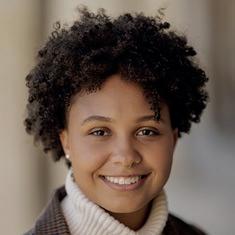
WH aT M oTIVaTES yo U
I n yo UR RESE a RCH?
I want to know about the majority narratives we have around climate change and how colonisation continues to exist in the way that we interact with places and people. I think the essence of Oxford, Ghana and South Africa is capitalism, racism and colonisation. They are at the organisational core of a lot of our current systems.
I don’t think we can truly create climate change adaptations or mitigations without deeply questioning those systems. For example, we need to think about whether we should even continue with monocrops like chocolate.

practices and yet it’s causing environmental degradation. Chocolate’s material history runs from Tetteh Quarshie, the Ghanaian man who brought cocoa to the Gold Coast, through to the Cadbury Firm from Europe, a large factory mogul who came into Ghana and reorganised the space. I am interested in how those stories align with each other and the ways people resisted oppression. I want to explore the overlapping outgrowth of their dreams and intentions for that same space.
I employ oral histories, auto-ethnography, and archival research to explore the impacts of colonialism
TEll US a B o UT yo UR PRoJECT I n g H ana
My focus is cocoa cash crop farming, and I employ oral histories, auto-ethnography, and archival research to explore the impacts of colonialism in Kukurantumi, Ghana. I actually didn’t go to Ghana thinking I’d be studying chocolate, but my research has been guided by the community. I was asking questions about environmental degradation in the region and time and time again, people would mention chocolate. That’s what led me to the Cocoa Research Institute of Ghana. There was a dream present there, but also conflict. So much of chocolate’s history in Ghana is one of liberatory
WH aT D o yo U FI n D
M oST CH allEng I ng a B o UT yo UR Wo R k ?
The inequalities. I have the immense privilege of having the time to devote to reading this incredible archival material and the financial support to do it.
The Cocoa Research Institute of Ghana’s library, for example, houses only a few documents. The librarian there explained that the library is an underfunded area of the institute because most funding goes towards scientific research to make cocoa production resilient. And even the material that is available in Ghana is very hard to access. The person I was staying with, for example, needed a map to protect some of the lands in a legal case. The Research Institute wouldn’t give her access it, but as an international researcher, I was able to get access. Then I went to the University of Birmingham, which has a special collection called the Cadbury papers with boxes and boxes of information.
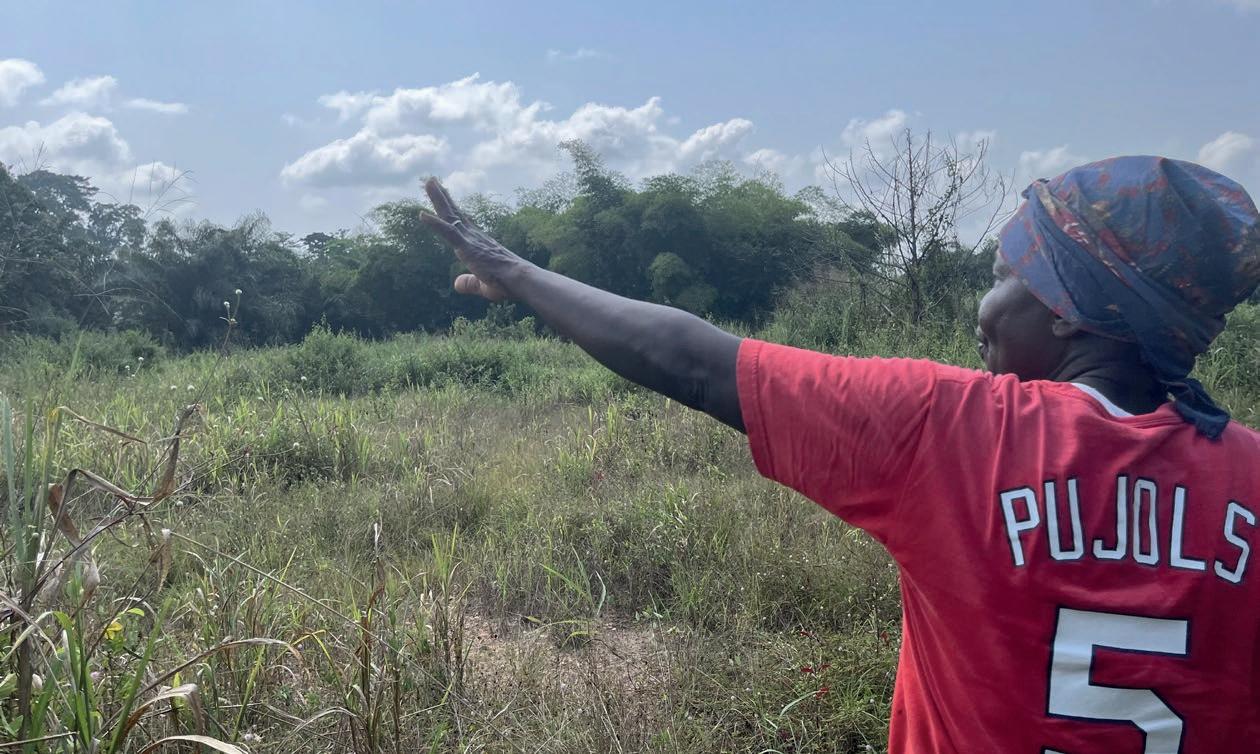
I am often privileged as an international researcher with access to space and resources that my communities are purposefully excluded from. It makes me question the colonial legacies of this and why academia has that power in the first place. I struggle with how my communities’ ways of engaging with the world aren’t present in the academy. I find myself questioning the barriers in place that limit African research institutions to only 1% of global research output.
STa RTED yo UR RESE a RCH I n g H ana?
The summer before I went to Ghana, I was working in St. Louis with Black farmers, connecting them to free legal

resources. For example, one farmer was share-cropping, he didn’t own the land he was farming. I spoke to my boss at Great River’s Environmental Law Center, a not-forprofit law firm. We were able to help the farmer review his leasing contract and negotiate a better deal. The way I see it, these farmers are at the forefront of climate mitigation and adaptation, and we should support them. Their efforts create tree canopy cover, and their work improves water absorption in the city which helps alleviate flooding. In Ghana, too, I saw that the farmers protected valuable topsoil through planting trees and shrubs and thereby reducing soil erosion. It’s interesting to see how farmers, although they are not seen as major advocates for climate change mitigation, are often the ones at the forefront of it, though without being paid or recognised for that work.
In January 2025 Tori shared their experience as part of a panel discussion event at Rhodes House. Chaired by former Mayor of Bristol (UK), Lord Rees, and with contributions from a number of international speakers, this conversation explored the influence of the past as well as looking to the future, with panellists arguing that collaboration and inclusion brings positive progress. Hear the full discussion by scanning the QR code:

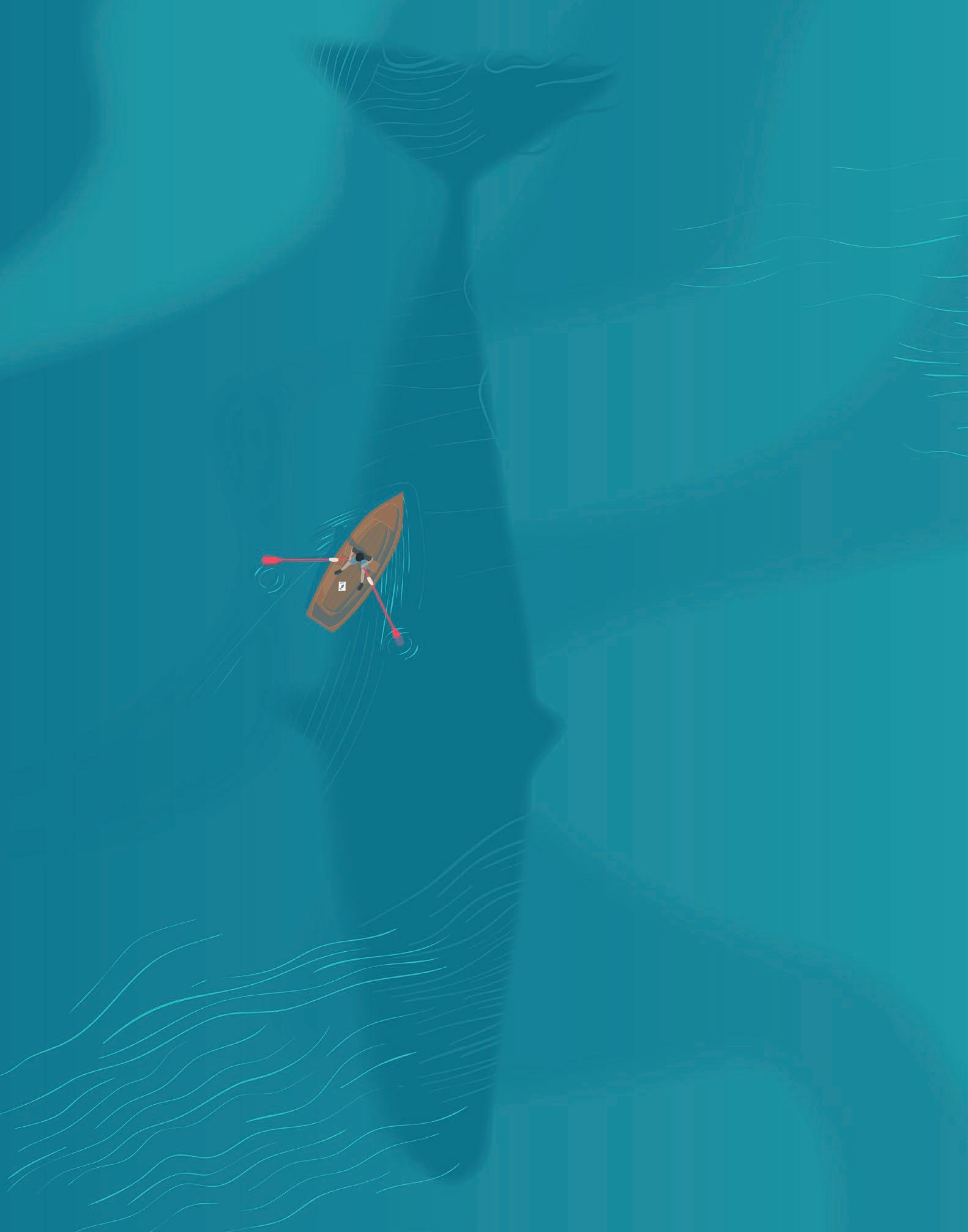

Isabella Cho (Illinois & Worcester 2024) is reading for the MSt in English and American Studies. Here, she considers how her intellectual journey at Oxford, and her work on Moby-Dick specifically, has shed light on questions of shared experience, meaning and the value of the arts and humanities.

“ Utility is the great idol of the age, to which all powers are in thrall and all talent must pay homage. On this crude scale the spiritual virtues of art have no weight and, bereft of all encouragement, it disappears from the tumultuous market of our century ”
If we forgive the antiquated language, ‘our century’ could refer to the one we’re living in today. The diagnosis in the quotation above might feature in an op-ed about the decline of the humanities – an artist deploring the ascendency of AI, perhaps, or a professor wringing her hands about slashes to department funding. The quotation, however, is from the late 1700s. It’s lifted from a series of letters written by the German dramatist and poet Friedrich Schiller to a prince. Published as a volume titled On the Aesthetic Education of Man, the letters explore the enduring relevance of the arts in a moment marked by political turmoil and seismic scientific innovation.
We’ve inherited this conversation that Schiller participated in centuries ago, albeit in a profoundly altered form. I ask myself a lot, and am asked frequently by others (yes, it came up in the Rhodes interview) what it means to devote myself to the humanities – to pursue, we might say, an aesthetic education – in a moment marked by a convergence of crises relating to our politics, our planet and our ideas. At the nerve centre of this tangled polycrisis is, I think, a degradation of our ability to make meaning from shared experience. We find it increasingly difficult to face things that challenge our habituated modes of thinking as opposed to soothe, reaffirm or entertain us. The information we consume on a daily basis – ten-second clips on social media, products we peruse online, curated news articles – are tailored to court our attention, as opposed to demand that we apply it.
As a digital native, I encounter this challenge often in my studies at Oxford. Because I’m reading for the MSt
in English and American Studies, a lot of people expect that reading comes easily to me. Not so. In fact, the texts that mean the most to me now are ones that, looking back, I initially entered into a hesitant or even adversarial relationship with. I remember sitting in a café on High Street, surrounded by murmuring patrons in the Oxford drizzle, as I cracked the pristine spine of Moby-Dick that I’d just bought from Blackwell’s. My gaze grazed that chummy, idiosyncratic ramble that opens the book and has enthralled readers for centuries: ‘Some years ago – never mind how long precisely – having little or no money in my pursue, and nothing particular to interest me on shore, I thought I would sail about a little and see the watery part of the world.’ I was flummoxed by what was, to put it simply, a very weird text: cetology meets remixed Biblical phraseology meets picaresque adventures punctuated by moments of the sublime. Fast forward a couple months, and now I’m dissertating on it.
Ishmael’s tale about the nautical frontier seems startlingly salient to our current moment. Whether it be extraterrestrial expeditions or other advancements in technology, there’s a real thrill that comes with transgressing the bounds of what we thought was humanly possible. This excitement, though, is – or, at least, should be – tempered by an accompanying sense of hazard, an awareness that these transgressions can profoundly alter our sense of collective selfhood and the ways in which that selfhood is meaningful to us. These are themes that Melville was very much alive to, not simply as a writer but also as an American witnessing the rapid changes his
‘ We find it increasingly difficult to face things that challenge our habituated modes of thinking’

republic underwent in the mid-19th century. My evolving attitude toward his text reflects a core tenet of aesthetic education: If we suspend judgment, entering a work of art to observe what it is trying to do as opposed to what we want or expect it to be doing, we might depart that experience transformed.
I don’t have an answer to why art matters. I think to claim there was one would be missing the point. Art shows up in each life differently, and its meaning transmutes in surprising ways as we change as people. Aesthetic education doesn’t just help us refine or enrich our faculties of perception; it reminds us that they’re there. The things we assert as indisputable fact, as self-evident features of our reality, are often mediated through faculties so basic to the way we process the world that we overlook them entirely. That different people can observe the same object – or news headline, or gesture, or person, the list goes on – and produce dramatically different, at times even oppositional, reactions is either a boon we might harness or, if neglected or abused, a source of debilitating acrimony.
Yes: aesthetic education is embattled today. I’ve found that this makes the present both an unfortunate and uniquely opportune time to devote oneself to its study. There’s a kind of irony – certainly, a revealing one –that this embattlement comes at a time during which the faculties aesthetic education strengthens are ones we so sorely need. The mindset that opens us to the transformative possibilities of art, then, might double as a guide for what it means to apprehend a shared world through the textured filters of our differences. That’s exciting to me.
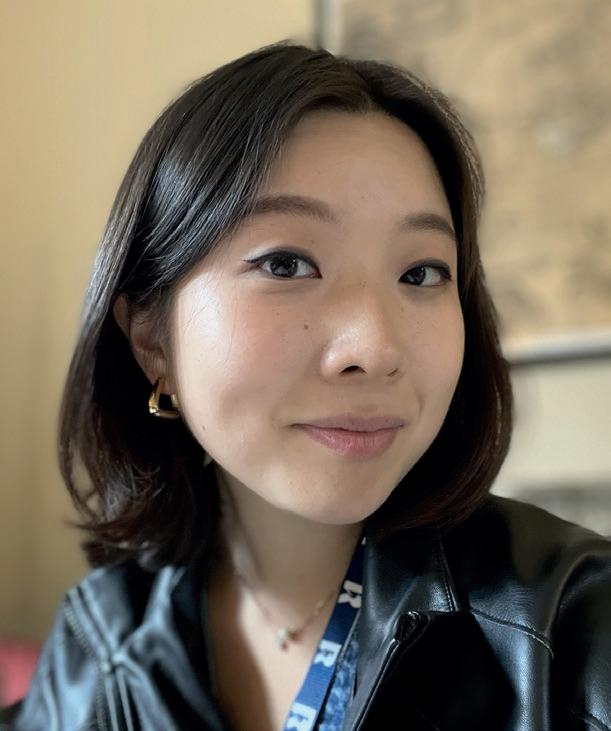
is a writer from the American Midwest. She is a 2020 US Presidential Scholar in the Arts and holds an AB in English from Harvard, where she received the Joan Untermeyer Poetry Prize, Harvard Magazine’s Berta Greenwald Ledecky Undergraduate Fellowship and the Mellon Mays Undergraduate Fellowship.
Isaac James (Texas & Magdalen 2023) is the co-founder of OutVote, an organisation building a youth-led culture of LGBTQIA+ to create electoral power and protect communities by electing leaders who reflect the diversity of the US. Here, he tells us how the idea for OutVote came about and what happened next.
In September 2023, I moved to Oxford and to Magdalen to begin my postgraduate studies, acutely aware that 2024 would be a defining year for American democracy. As a lifelong politics junkie, being away from the United States during a critical election year was a frustrating experience. Although I was immersed in the awe of beginning a new life, I couldn’t shake the feeling of being disconnected from the political landscape back home. Every breaking news alert and polling update reminded me of the stakes: young voters, LGBTQIA+ rights and the broader fight to preserve democratic institutions. Rather than let distance sideline me, I began ideating with friends back home about ways to do my part. It was over coffee at Gail’s on Little Clarendon Street, sitting with a group of Rhodes friends in early Hilary Term, that I made the final decision to transform a small idea about civic engagement into something tangible.
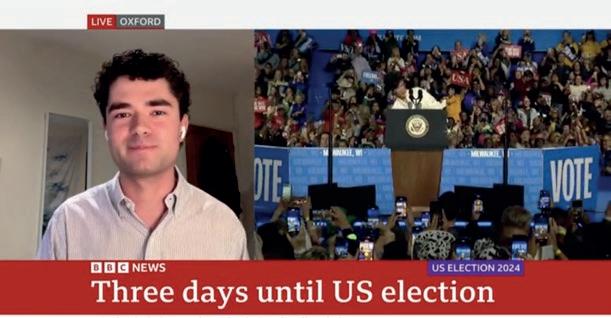
Meaningful change happens when bold ideas are met with rigorous action

I co-founded OutVote with a singular purpose: to build a new culture of civic engagement in the Gen-Z LGBTQIA+ community. The idea emerged from a simple but powerful realisation – too many young queer people feel disillusioned with electoral politics, unsure if their votes matter or if the system truly represents them. Growing up gay in Texas, I saw firsthand how political decisions affected my community, but I also saw how disengagement could allow those decisions to be made
without us. 2024 felt like the year to begin building electoral power that could ensure a more representative, participatory democracy for all. Throughout the spring, conversations with peers about how to increase voter turnout among LGBTQIA+ youth quickly evolved into a structured initiative. I quickly learned lessons about building a team, raising money and navigating the administrative complexities of non-profit governance. We focused our program design on peer-to-peer organising, digital outreach and voter education materials tailored specifically to young queer people.
At Oxford, my academic work provided a powerful intellectual framework for the work I was doing with OutVote. The MSt in Women’s, Gender, and Sexuality Studies gave me the tools to critically analyse political structures and the ways in which they intersect with identity, and my dissertation helped me articulate why LGBTQIA+ political engagement is not just about representation but about shaping policies that materially

affect our lives. Meanwhile, the Master of Public Policy (MPP) has allowed me to think strategically about how institutions function and how to build effective civic organisations, all while being constantly inspired by other students in the course who have founded thriving social impact organisations around the world.
But this work truly takes a village, and the Rhodes community has been at the core of mine. Tahri Phillips (Virginia & Wolfson 2023) was part of OutVote’s inaugural fellowship cohort, Jenna Smith (North Carolina 2025) is an original member of OutVote’s executive board, and Joshua Babu (Arizona & Jesus 2022) leads our research programmes. In the summer after my first year at Oxford, I interned for John Simon (Massachusetts & New College 1984) at the GreenLight Fund, where I learned critical lessons about building sustainable foundations for non-profit organisations, fundraising, and strategising for long-term impact. In addition to the support, care and encouragement OutVote has received from my cohort, these direct links to the Rhodes community speak to the enduring strength of this scholarship – not just as an academic opportunity, but as a lifelong network of individuals committed to service and social change.
As the 2024 election cycle intensified, so did
OutVote’s work. Our team launched a fellowship and ambassador programme, created digital toolkits, partnered with local organisations and expanded our network of volunteers. By election day, OutVote had reached over 750,000 young LGBTQIA+ voters and mobilised thousands. We partnered with national organisations like the Human Rights Campaign, the National LGBTQ+ Task Force, and were even featured on the BBC. But a 10% decrease in youth turnout between the 2020 and 2024 elections indicates there is even more work to do than we initially imagined.
With graduation now on the horizon, I’ve made the decision to begin my professional career by leading OutVote full-time. It’s a daunting leap, but one that feels right. Building a nonprofit, especially in the realm of civic engagement, requires constant adaptation. But if being a Rhodes Scholar at Oxford has taught me anything, it’s that meaningful change happens when bold ideas are met with rigorous action. My two years at Oxford have given me the academic foundation, strategic insight and global perspective to take this next step with confidence. OutVote is still in its early stages, but I believe in its lasting potential – and in the power of young, engaged voters to shape the future.
When Ziyi Wang (China & Queen’s 2021) came to Oxford from Stanford, she was making a decisive pivot, from a life aspiring to a career in professional golf to immersing herself in historical research. Here, she reflects on how her life has changed since she became a Rhodes Scholar.
It is now peak Sakura, the achingly ephemeral cherry blossom season that habitually reaches England later than the rest of the world. Shades of light pink delight the medieval stonewalled Queen’s Lane, where the imposing Gothicised spires of All Souls send a daily humbling reminder: yes, you wrote 64 pages in the Examination Schools on Renaissance Florentine economics, the definition of death, and Clausewitz, in the hope of winning an All Souls Examination Fellowship; no, you were simply not quite wickedly intelligent enough. But you have joined Harold Wilson and a far more distinguished cohort of snubbed Oxonians, so now you are entitled to self-deprecation and snobbery.
All Souls and the Bodleian Libraries were what attracted me to Oxford. These storied shelves and streets formed the fabric of my daydreaming, long before I could even entertain the thought of freely shaping my life. Five years ago, I was convinced that my trajectory had been reliably curated for me, and it was my obligation to execute it with excellence. At the beginning of 2020, in a bustling café at Stanford that I now consider tacky, I shared my life plan with a friend: ‘I will finish my master’s in international policy, turn professional in golf, play on the LPGA tour for three to five years, go to law school and maybe work at the World Bank afterwards.’
travelling for one whole week every month, entirely missing school. I have won a professional tournament and played on the national team and the Stanford varsity team, where I was tremendously fortunate to have received a scholarship. If I gave up golf altogether, I would be squandering my talent and disrespecting my youth, and certainly, failing the trust and investment that others have so confidently placed in me. ‘Okay,’ my friend said, ‘so forget for a second about all your past effort, expectations and immigration issues’ – one really ought to never taunt fate with the last, though – ‘What would you do in the next few years in your perfect, ideal world?’
I was convinced that my trajectory had been reliably curated for me
I paused for a moment. This was not a thought experiment that I had permitted myself before. Realism had encroached upon my romanticism over some years in California. Glimpses of those ancient walls at Oxford flashed before my eyes; they promised an intellectual refuge that I so secretly yet ardently pined for. ‘In my hypothetical ideal world, I would be a Rhodes Scholar at Oxford doing a PhD in European history.’ My articulation shocked myself. That ideal world sounded so palpably tangible. ‘And why don’t you?’ said my friend. ‘Do just that.’
‘ Wow,’ my friend commented, ‘but how do you sound so unenthusiastic about it?’ ‘Well,’ I confessed, ‘much of this is inertia and merely sensible. I have put in too much effort to not pursue these dreams any further.’
That was truthful – since the age of six, I have spent at least 20 to 30 hours a week on golf training whilst
I did just that. Five years later, I am now in the final weeks of completing a DPhil in history at Oxford as a Rhodes Scholar, writing a dissertation on 19th-century European diplomacy, from Napoleon to the Crimean War. For my research, I have travelled extensively to use foreign ministry and state archives in Britain, France and Austria. I gained considerable knowledge of Russian and German; the vast majority of my research necessitated deciphering scribbled cursive 19th-century diplomatic
dispatches in French, my third language, which I had only started learning from ‘bonjour’ at university.
The past four years at Oxford as a Rhodes Scholar have redefined my life. From the first moments in the Old Bod’s upper reading room – where portraits of Horace, Herodotus and Oliver Cromwell stare condescendingly –my thirst for an intellectual haven was quenched. I was wrong about this place being a refuge, however. There is a near-religious dedication to pure knowledge that oozes from Oxford, vindicating the pursuit of knowledge and scholarship from accusations of escapism and cowardice. When the quest for truth is so sincere and arduous, condemnations for its futility and irreconcilability with a lucrative career pale in comparison. There is tremendous inherent value in understanding the world and ourselves, the incandescent stained-glass windows and melodious bell chimes gently remind me.
The purity of scholarly pursuits does not, nevertheless, preclude the necessity of relevance. My research on 19th-century European diplomatic history might appear divorced from contemporary political reality, but any reader of credible press would beg to differ. Threatened European collective security in the face of Russian expansionism, the fragility of shifting alliances, the vulnerability of Black Sea ports, the erosion of international cooperation, the rise of modern populism through manipulation of public opinion, and the perils of isolationism from great powers – all sound chillingly familiar, 1853 and 2025 alike.
Oxford’s own A.J.P. Taylor once fashionably asserted that one could learn nothing from history except how to make new mistakes. Now embracing my identity as a diplomatic historian, I must disagree with one of the greatest of our time. It is my newfound mission as a historian to combat the permanent human propensity to forget. Human nature never changes; we are perennially stuck in a state of amnesia and denial, or a more dangerous disposition towards erasing or modifying our collective memory. This is the obligation that I now aspire to fulfil, and I know that the Rhodes Trust, unlike those who had invested in my golf career, has not misplaced its trust in me.
Emerging from the frenzied lifestyle of an elite athlete,

I have transformed into a character of the riveting 19thcentury past. I post cursive handwritten love letters via Royal Mail, I walk with the printed Financial Times in my handbag, I only read classic French novels published by Gallimard or Folio, and I only listen to the Royal Opera and Berliner Philharmoniker. But there are fundamental elements of me that remained untouched: I still always juggle three people’s workload and plan my leisure calendar three months in advance. I competed on the Oxford men’s golf team, earned a Dark Blue defeating the unimpressed Cambridge boys, and became the fifth woman since 1898 to join the Oxford and Cambridge Golfing Society. Impossible tasks still captivate me, such as my cherished remembrance of pushing my intellectual boundaries during the All Souls exam.
Inevitably, my time at Oxford as a Rhodes Scholar is excruciatingly fleeting, like the fading blossom of Sakura I acquiesce in its mournfully transient nature, as I cherish the immeasurable bliss that it gracefully spares, which will endure far beyond the flowery fragrance on this fine spring morning.



Dr Megan Kenna (New Hampshire & Magdalen 2002) knows what a powerful force lifelong fellowship can be. As a Rhodes Scholar, that sense of shared purpose and community helped her overcome obstacles, pursue bold ideas and lead with impact. That experience shaped Megan’s vision for Schmidt Science Fellows. Here, she answers questions about why both interdisciplinary science and fellowship are vital in today’s world.
As Founding Executive Director of Schmidt Science Fellows, Megan worked with her team and Board to build the programme not as a grantmaking initiative, but as a true fellowship – uniting brilliant, interdisciplinary researchers around a bold mission: to change how science is done. Since its launch in 2017, the Fellowship has grown to include more than 200 Fellows from nearly 40 countries, proudly rooted in the Rhodes Trust family.
With a world-class Science Leadership curriculum and the pioneering Interdisciplinary Science Ranking, the Fellowship is reshaping the culture of science itself. Described by Forbes as ‘one of the most prestigious scientific postdoctoral awards in the world’, Schmidt Science Fellows is a programme of Schmidt Sciences, delivered in partnership with the Rhodes Trust.
‘ As a Rhodes Scholar, I know firsthand the lasting power of community’
Why is interdisciplinary science so important in today’s world?
We are living at the edge of a new scientific and industrial revolution – driven by AI, data and a rapidly evolving world. At the same time, we face unprecedented challenges: changing climate, food insecurity, ageing populations, infectious disease.
No single discipline can solve these problems alone. They demand approaches that are fluid, collaborative and unconstrained by traditional boundaries. Interdisciplinary science brings together the tools, skills and perspectives needed to unlock bold solutions – and to ensure that powerful new technologies, like AI, are applied in ways that truly benefit humanity.
To meet this moment, we don’t just need more science. We need to change how science is done. That’s the vision behind Schmidt Science Fellows: to champion a culture of curiosity, courage and collaboration that can rise to the scale of the challenges ahead.
Schmidt Science Fellows is a Rhodes Trust partnership programme. How does this relationship benefit both organisations and communities?
Put simply, our Fellowship would not be here without the support and model of the Rhodes Trust and Scholars. The input and advice from the Rhodes community in developing the early iterations of our Selection processes and the principles of what is now our Science Leadership Program were essential. Each year, many Rhodes Scholars continue to be part of our Selection process, reviewing and interviewing candidates.
As our Program has developed, we can now share our experiences with Rhodes Trust colleagues and, in some cases, pioneer new approaches and technologies that the
wider Trust and other partnership programmes can adopt. As AI tools become more integral to all our work, I see this as becoming a more important role for us.
There are also opportunities for our Fellows and Scholars at all career stages to engage with each other’s programming. Fellows have contributed to international Rhodes events on technology and healthcare, including the Technology and Society Forum. We have welcomed Rhodes Scholars into training sessions with our Fellows and to events, including small dinners with senior business leaders and large-scale networking receptions where they can make new connections and develop opportunities.
I am most excited by the examples of greater impact where our communities have collaborated scientifically including on topics ranging from the genetic basis for brain development to accessibility interview practices in science.
Most recently, our 2020 Fellow, OJ Watson at Imperial College London, was a co-author of a Nature paper, with Rhodes Trustee Professor Sir Nigel Shadbolt, on exploring how AI can help us prepare for future pandemics.
Ultimately, the benefits of our close relationship should not be measured purely by what our Scholars and Fellows derive from it or even by our organisations but by how they maximise our collective ability to change the world.
Lifelong community is at the core of our missions. What does it mean to you and how do you feel it can be fostered?
As a Rhodes Scholar, I know firsthand the lasting power of community. It’s not just a network – it’s a circle of trust and shared purpose that helps you grow, take risks and do better work. My Rhodes community did that for me at Oxford, but more importantly, a core group of Rhodes friends still does so today. They are my closest confidants – the ones who challenge me to be bold, tell me the truths no one else will,
and remind me who I am when the path gets hard. They’ve caught me when I’ve fallen, and they’ve cheered me on as I’ve soared.
That experience shaped how we’ve built community at Schmidt Science Fellows. We are intentional at every step – from selecting Fellows who share a drive for impact, to creating spaces where deep connection and collaboration can flourish.
Through our global convenings, our Interdisciplinary Science Summit, our online Fellows Hub, and our Catalyst Grant programme, we invest in relationships that support the collaborative scientific efforts of our Fellows – not just résumés. And by bringing in the broader Rhodes community, we multiply the possibilities. Because when people who care deeply about the world come together across disciplines and geographies, remarkable things happen.
How do you see the Fellowship developing over the next ten years?
Over the next decade, I see the Fellowship becoming a more powerful engine for collective impact. The power of lifelong community will only deepen, especially as we continue to strengthen ties with the Rhodes Trust. We share a commitment to impact, leadership and service – and by working more closely together, I believe we can achieve our missions faster and more effectively.
I want to see more opportunities to develop initiatives and collaborations that draw on the ideas and expertise of our Fellows and Scholars across career stages, disciplines and perspectives.
The challenges ahead are complex, but the potential of this combined community is extraordinary. That’s what excites me most.
Schmidt Science Fellows is an integral part of the extended Rhodes Trust family. Rhodes Scholars have both contributed to the early growth and success of the Program and benefited from access to the Schmidt Science Fellows community.
● Many Rhodes Scholars participate in the Schmidt Science Fellows annual review and Selection process. This is not only a valuable service to the Program, but participants engage with other selectors, including senior figures from global science, industry and philanthropy.
● Numerous Scholars and Fellows have coauthored papers together and mentored one another. Recently, 2020 Schmidt Science Fellow OJ Watson co-authored a 2025 Nature paper entitled ‘Artificial intelligence for modelling infectious disease epidemics’ with Rhodes Trustee Sir Nigel Shadbolt.
● Rhodes Scholar Alumni, including Emma Brunskill (Washington & Magdalen 2001) at Stanford University, Alex Pollen (Massachusetts & Pembroke 2004) at the University of California, San Francisco and Dan Fletcher (Texas & New College 1994), University of California, Berkeley have hosted Fellows in their labs, benefiting from the contribution of these postdoctoral scientists funded by the Program.
● Scholars in Residence have joined Schmidt Science Fellows Science Leadership Program sessions, gaining exposure to specialist skills, including science communication.
● Scholars and Alumni are regularly invited to participate in Schmidt Science Fellows programming, including our 2025 Interdisciplinary Science Summit in Pasadena, California, giving them the chance to network with the Schmidt Science Fellows community and partners, develop interdisciplinary collaborations and share their own research.
Henry Cerbone (West Virginia & St John’s 2023) is in the second year of his DPhil in biology. Here, he talks about his work investigating visual guidance in hawks and plants, and how his time at the Wytham Woods field station has shown him a very different Oxford.

The primary oxford locales that have defined my degree are far from the city centre
When I won my Rhodes Scholarship, the committee regaled me with their favourite Oxford memories, often neatly framed within wellmanicured quadrangles or contained in cozy, ageing pubs. Now in my second year, I have certainly spent time in quads, at pubs and on the train to London. But the primary Oxford locales that have defined my degree are far from the city centre. My time is spent in the woods (Wytham Woods), at the field station (The John Krebs Field Station), and on the ST2 connector (or sometimes on the muddy path that brings you through the cow fields when the bus is missed).
I am reading for a DPhil in biology, and I work on visual and proto-visual guidance in organisms. My primary study systems are hawks and waterlilies. I am

interested in how living things take in light to inform how they move and act in their environment. Much to my Rhodes colleagues’ amusement, however, my projects also range across maze navigation in reef fish, foraging in Arizona’s red harvester ants, and 3D reconstruction of forests for biodiversity monitoring. When I was applying for the Rhodes as a Harvard undergrad, I did not suspect just how zany my life at Oxford would be.
I could not have expected the meetings at the Royal Veterinary College to examine a hawk cadaver; nor could I have foreseen my daily 7 a.m. trips to the woods to fly four Harris’s Hawks (lovingly named Charmander, Dartagnan, Drogon and Toothless). I also could not have predicted the incredible cast of characters that would decorate my life. My brilliant advisors Graham Taylor
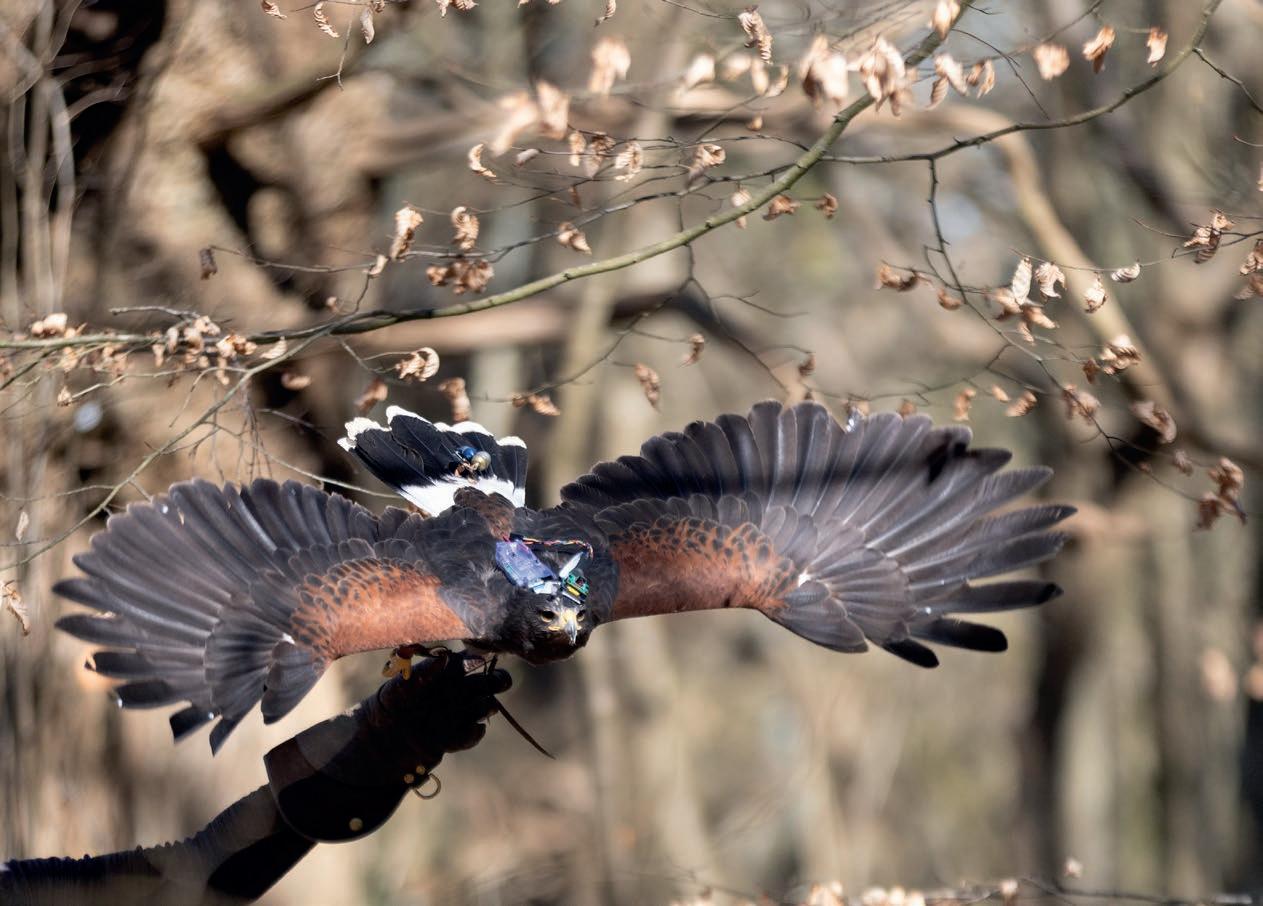
(a biologist and self-taught engineer), Chris Thorogood (field botanist and acclaimed author) and now Maurice Fallon (robotics and perception guru) at least had designated spaces in my planned academic path; I knew I would have advisors. But how could I have foreseen that my daily experimental compatriot would be a lovely Liverpudlian falconer named Helen Sanders? My daily lexicon now includes such oddities as ‘my falconer’ and ‘I have to fly this morning’ – not in reference to a plane journey, but to an experiment with the hawks. I would be remiss to leave out my second experimental home, the Oxford Botanic Gardens, which I hope many Oxford residents visit regularly. There, Jess Snowball (what a name!), has become ‘my horticulturalist’, helping me string up cameras and wires to track Amazonian waterlilies.

As I look forward, perhaps pre-emptively, to what I might one day tell a newly anointed Rhodes Scholar Elect when I am a member of a selection committee, I cannot quite imagine myself recommending daily visits to the field station (though everyone should visit Wytham Woods at least once!). My advice will be more general: come to Oxford with an open mind, not only in the ways we are taught as Scholars, but also in terms of what Oxford will be for you. The formal dinners, high tables and black-tie events are all present at Oxford, but for some, hawk flights, lab work and field boots will be the most cherished memories.
And recently, as I trudged through the now familiar cow fields beneath the hovering kestrels on my way to the field station, I was once again struck by just how cool my Rhodes experience often is.
The Rhodes Trust’s Legacy, Equity and Inclusion work is about engaging more fully, critically and honestly with our history. It acknowledges that the Scholarship’s reputation rests not on the controversial life of Rhodes himself but on the enormous contributions the holders of the Scholarships that he established have made to the world. Here, Matshabello Sannah Mokone (South Africa-at-Large & Jesus 2011) reflects on how Rhodes Scholars from Africa are working tirelessly to ‘forge bonds of mutual understanding and fellowship for the betterment of mankind’.
The life and legacy of Cecil John Rhodes (CJR) are, arguably, some of the most contested of both his time and ours.
He has been described as driven, ambitious, pioneering, industrious and cunning. Other accounts are much less generous, spewing vitriol on him of epic proportions. However, viewed through a more empathetic lens, there is little disputing that he was a man of vision, tactics and execution… he was a man of his time. Whether we label ourselves and others as ‘good’ or ‘bad’, fate and destiny have a role to play in all our lives. The year 1870 was a fortuitous one, more so than the 32 years that would follow it. One can only postulate how differently CJR’s life and life on the African continent would have turned out had he not been ill and prompted to join his elder brother in South Africa. Yet this article is not about CJR, berating or exonerating him.

The hope of this article is to suggest that there was a plan (of divine origin?) at work all along, greater than CJR’s coveted ‘secret society’ to expand the British Empire. Perhaps the Rhodes Scholarships were not a purely selfish ambition, after all. Call it what you will: God, the universe, time… there has been a force orchestrating the forging of ‘bonds of mutual understanding and fellowship for the betterment of mankind’. Perhaps CJR was merely a conduit through which this would come about. The means of extracting his bounty may have been unscrupulous and caused real pain and wreaked real havoc, but perhaps a plan was unfolding unbeknownst to Cecil and his counterparts. Those from the region that Cecil so pillaged and plundered were, especially, not privy to this plan.
Southern Africa may be seen as the hotbed of colonial expansion, particularly by the British Empire. Rich in minerals and other natural resources, it was hugely inviting. However, the most valuable of its wealth was and remains its people, though this was little perceived at that time. The fact that the Rhodes Scholarships were not accessible to Black Africans from the region for an extended period of time is testament to
those perceptions. Truly, Africa and southern Africa have been through exceptionally hard and dark times. However, as the adage goes, ‘it is darkest before morning’. The sun would come to rise on the continent and the region, beyond 1902.
The year 1978 ought to go down in history as the year the Rhodes Scholarships, southern Africa, Africa and the world got that much richer. The selection of a then young Loyiso Nongxa (South Africa-at-Large & Balliol 1978) from South Africa’s Eastern Cape province (formerly Transkei) came at a time of great political, social, economic and moral upheaval in southern Africa. Neighbouring Zimbabwe (Southern Rhodesia) was facing its own turmoil as it neared independence, while the noose of apartheid seemed to be tightening for South Africa’s Black African majority. As a matter of fact, an estimated 176 people (many of them youth) were massacred in 1976 for protesting against the use of Afrikaans as a medium of instruction. Even at that momentous time, fate and destiny were conspiring to bring about something truly extraordinary.
While Professor Nongxa was the first ever Black African Rhodes Scholar from southern Africa, and the first Black African Vice-Chancellor and Principal of the University of the Witwatersrand (a man of firsts, indeed!), he would not be the last. He has since been joined by countless exceedingly capable and exceptional human beings, including those who are Black and female. Since 1978, Rhodes Scholars from southern Africa have been, and are, rewriting and righting history by being ambitious, pioneering, industrious, visionary and humane members of the world. In their various fields, industries and spheres of influence they are working tirelessly to ‘forge bonds of mutual understanding and fellowship for the betterment of mankind’. They do so in a spirit, not of guile or bitterness or vengefulness, but of humility, reconciliation and reparation.
The Rhodes Trust is, by and large, the propagator of all this and ought to be celebrated. Instead of using the Scholarships to weaponise education and deepen divisions, they have made it accessible and egalitarian. Young people from all walks of life and many ethnicities, with exceptional academic and leadership capabilities, who are committed to duty and have the energy to maximise their potential, have access to the Rhodes Community. Through reconciliation, the prospect of impact is now amplified.
Sannah is a lover of people, nature and diversity. She is a health and fitness enthusiast with a seven-year-old daughter who keeps her on her toes. Sannah hopes to make her contribution to Africa’s development project through entrepreneurship and rigorous and just policy-making.

In January 2024, Justin Hadad (Ohio & Balliol 2022) worked with the programming team at Rhodes House to start Show Me Why You Love It, a series where Scholars would present their academic work to each other. Here, he reflects on how self-knowledge and deep friendship have grown out of sharing.

My time as a Scholar in Residence at the Rhodes Trust has been the most transformative period of my life. Through the dedicated efforts of both the programming team and fellow Scholars committed to mutual growth, I’ve witnessed my identity strengthen, my beliefs deepen and my political understanding mature in ways that isolated academic pursuits could never have achieved. My growth in these dimensions are not in spite of my socialising at Oxford, but because of it – friendship has made learning about myself and the world easier.
Oxford can be a very transient place. Terms fly by quickly, Scholars leave for weeks on end for field work or conferences and it’s easy to get locked up in one’s department and miss the tri-termly Meet and Mingle. And, even when socialising at Oxford, there is no shortage of ways to spend one’s time; there’s always a flurry of department talks, warm-beer dates at the King’s Arms, and dinner parties with friends.
By the middle of my second year at Oxford, I could tell this transience was limiting the amount that I engaged across the Scholar community. In particular, I found it hard to be intentional about how I spent my time. And this was so disappointing, because something I was so excited about before coming to Oxford was the chance to learn about the projects that Scholars from all backgrounds focused on.
So, in January 2024, I worked with the programming team to start a new seminar series, called Show Me Why You Love It. Scholars would take turns presenting their research in fun, accessible ways, and the rest of us would listen and engage as if it were a mix of a department seminar and a
conversation at a pub. Ex post, the idea was obvious – if we have all been given the chance to study at Oxford via the Rhodes scholarship, then of course everyone is doing something worth talking about
These sessions grew to be my favourite way to engage with the Scholar community. We listened to talks about theoretical computer science, mental health in children, the death penalty, and more. There were deep levels of engagement and excitement across Scholar classes; really, students wanted to learn about what others were doing.
After a few sessions, we realised there was an energy in the air to hear Scholars speak about what they cared about beyond Oxford: what drives us personally, politically and spiritually to fight the world’s fight.
Several Scholars have homelands ravaged by war, geopolitics and environmental disaster. Several have upbringings that are beautiful, complicated, devastating. We wanted to give them a platform, to discuss what is often off-kilter in our departments and colleges: war, family, upbringing, culture, identity, gender and more.
Thus our programming adapted, and Show Me Why You Love Home was born.
The first seminar had three talks: Tarfa and Ahmed spoke about language and climate in Saudi; Dave spoke about home as a fraught concept between Nepal and Queens, New York; and Hazim talked about growing up in Gaza – how he couldn’t return home during his childhood years, and how his family heirloom was destroyed in Israel’s genocide on Palestine.
The event was a hit. It brought together over a hundred people to hear these devastating, material, educational stories.
The community was better off afterward, for having learned about people whose lives were directly affected by news headlines – whose lives were put on the margins, who didn’t often have the chance to speak to a crowded room.
These difficult, beautiful presentations continued: we heard from Scholars from South Africa, Syria, Lithuania; we heard from Scholars from marginalised communities, who are immigrants, who suffered forced migration. One major takeaway was that these emotional conversations were made easier through community. After just about every talk, I would share in the emotions with friends. We would discuss what we learned, and how the community is better off for having heard someone’s true story
One person I always debriefed with, and had at my side for every single talk, was Dave.
When he gave his talk, Dave shared how he learned about his family history – of the Sherpas in the mountains of Nepal – through a textbook. He showed us a younger version of his mother being held by his grandparents – in an educational text, with page numbers and all. He talked about how jarring it was for his dear community to be an educational resource. In his talk, he played a documentary that the BBC had made of Sherpas in Nepal; again, covering his family.
among many others – had the courage, too.
Our relationship grew alongside our personal exploration. We each developed a vested interest in each other’s stories, and wanted to participate jointly in the journey.
Over the course of 2024, there were 27 total Show Me Why You Love Home/It talks. After the very eventful year, I knew it was time to hand over organising duties.
On my ‘going down’, I gave a Show Me Why You Love Home talk of my own. I spoke about my family’s migration from the Middle East to the Caribbean, and then to the US.; how my Arab identity has transcended borders, how identity is fluid, how grateful I was for the Scholars around me.
For the first time, I didn’t sit next to Dave. He was back in Nepal spending time with his family, documenting his family story.
‘ We each developed a vested interest in each other’s stories’
The audience was able to see through his eyes how he first observed his ancestry: on the mountain where the camera crew lived with his family, in the array of questions in a language that his grandparents couldn’t understand, translations happening against their will. In a lot of ways, his story was taken from him
We had several deep, exploratory conversations about what it means to forge one’s own story, to document our family lineage, to be respectful to the people who are sharing the information. Because of his humility, kindness and wisdom, Dave gave me the courage to explore my own story: to talk about how my family, my heritage, my sense of self have shaped me. This was only possible because he –
And that was okay with me, because I knew I was joining him a few days later in Kathmandu, our relationship culminating in going to his home together
I spent ten days in Nepal witnessing Dave (and his partner, Lexie) capture conversations with his family. He asked for stories, had the courage to share his own journey with them, and wove in his creativity, care and academic analysis of the region seamlessly.
He’s able to tell his own story – and I’ll leave that for him, so we should all stay tuned. All I can say now is that I am immensely grateful that he and I were in a place – as Scholars, as best friends – to witness this growth as a pair. To be joyful together when he met the lama who gave him his Sherpa name, or to smile to ourselves at his aunt’s nod of respect when he shaped the perfect momo
Our relationship is precisely the execution of Scholar programming: building bridges between two people as they both deepen their appreciation for their own, and each other’s identities and backgrounds.
‘ Friendship has made learning about myself and the world easier’


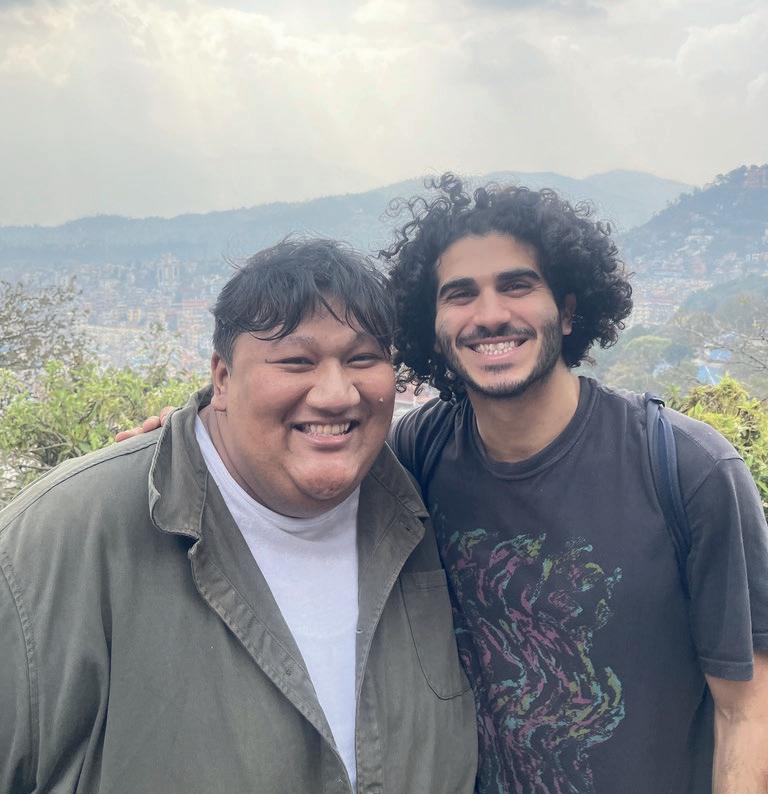
Worried that AI may one day be powerful enough to wipe out humanity? Sílvia Casacuberta Puig (Spain & St John’s 2023) argues that we would be better to focus our concerns on the very real dilemmas posed by the AI technologies that are already shaping our lives.
Since the launch of OpenAI’s ChatGPT in November 2022, the presence of artificial intelligence (AI) in our daily lives has become extremely noticeable, both in applications and in public discourse. A major part of this discourse, spanning from informal conversations at an Oxford pub to high-level AI summits around the globe, has actively (and usually solely) focused on sci-fi-esque concerns around artificial intelligence. These include the so-called ‘existential risks’, for example, the fear that a super-intelligent AI is going to cause humanity to become extinct or cause other types of global catastrophes. While such consequential concerns should indeed be diligently researched and discussed, I believe they have misguided the public’s perception of how algorithms and AI are shaping our society right now For one, many of these existential claims tend to lack the required scientific evidence that would justify such a loud display in the news and in AI-related discussions. But more importantly, they overshadow the very tangible and real impacts that AI is having in our lives at this moment, which affect our individual and collective
rights. In this article, I want to give particular examples of such impacts and draw attention to current research in computer science that is studying these societal problems.

Whatever is deemed unethical or illegal in a human decision-making process, should also be recognised as such if an algorithm decides instead
We can easily understand why algorithms – which are now being used in all spheres of society, from financial services, to education, to healthcare and the judicial system – are of societal concern when we see them as performing automated decisionmaking: instead of a person deciding whether someone should be hired for a job or obtain a loan, we now let an algorithm choose that for us. This can be a justified decision, given that algorithms work with massive amounts of data and deduce patterns that humans wouldn’t have been able to discern otherwise. However, in doing so, we should always adhere to the following principle: whatever is deemed unethical or illegal in a human decisionmaking process, should also be recognised as such if an algorithm decides instead. Moreover: we also need to investigate what additional concerns we should be thinking about that are particular to an algorithmic-based process.
The most glaring example of what can go wrong when using algorithms to make decisions on people
is the so-called algorithmic bias (or discrimination) problem: an algorithm can make biased decisions on a particular subgroup of the population. This can happen for a number of reasons, including historically biased data or the use of an algorithm that is optimising for the wrong (or incomplete) set of constraints. But this is barely scratching the surface of the kinds of algorithmic properties that we have to study carefully before we deploy algorithms on people. Are the outcomes reliable? Are they robust? A major line of research in computer science, for example, tries to quantify the uncertainty of algorithmic predictions to understand how certain an algorithm is of its own outputs. In some cases, these can be very brittle: for example, we may be able to construct many different models for the same initial dataset, which then leads to the obvious question of how to choose a single model from this class of competing models (this is known as the model multiplicity problem). If we do not have a mathematical answer to this, then the final outcome can be considered arbitrary.
Algorithmic predictions not only make life-altering decisions for us, they also affect our behaviour and shape our world-view. Spotify shapes the songs we listen to, LinkedIn determines what job ads we are aware of, dating apps decide what people we talk to, Amazon which products we consider buying, social media what news we read. Naturally, all of these are powered by algorithms and AI, and the researchers and engineers behind these algorithms make particular choices in the design of the algorithms. We cannot detach such choices from the societal implications that they carry and the effects they have on us. Major current lines of research in computer science try to understand how these networks, rankings and online platforms are formed. Moreover, trying to enforce rigour and scrutiny in these types of algorithmic choices and researching them carefully goes well beyond any sort of necessary normative considerations. For example, understanding how algorithms shape market power and steer people’s choices helps us uncover cases of monopoly that are unfair to competitor companies.
Naturally, all of these problems are spilling over onto the new developments in Generative AI. An obvious
example is found in chatbots that modify their answers depending on the user’s name, but again we can uncover many other more sophisticated and equally important problems. For example, recent research has revealed how algorithmic pricing based on large language models can lead to algorithmic collusion: when various automated pricing agents face each other, these can lead to supracompetitive pricing levels to the detriment of consumers.
There are many other aspects of the algorithmic decision-making process that we should be concerned with, such as data collection practices and violations of individual privacy. For example, there are many documented instances of chatbots revealing chunks of training data that were supposed to be confidential. But the main take-away here is that the public must be aware of all the ways in which algorithms and AI are shaping their lives right now, that an algorithm might be the reason why they unfairly didn’t get a job or paid an unusually high price for a product, and that many of us in computer science are trying to understand how these problems can occur and how to fix them. Overly sci-fi-esque accounts of artificial intelligence relinquish the power that algorithms hold over us and over our society. Many use cases of artificial intelligence are silently driven by a desire to expedite decision-making processes in order to lower financial and bureaucratic costs. But particularly when these decisions impact all of us, it is crucial that we fully understand the algorithms that are being used behind the scenes. As we rush to automate the world around us in the name of efficiency, we cannot afford to trade justice for convenience.
is a Global Rhodes Scholar currently studying a master’s in computer science at Oxford. She obtained her bachelor’s in mathematics and computer science from Harvard University and will start a PhD in theoretical computer science for societal applications at Stanford University this coming autumn.
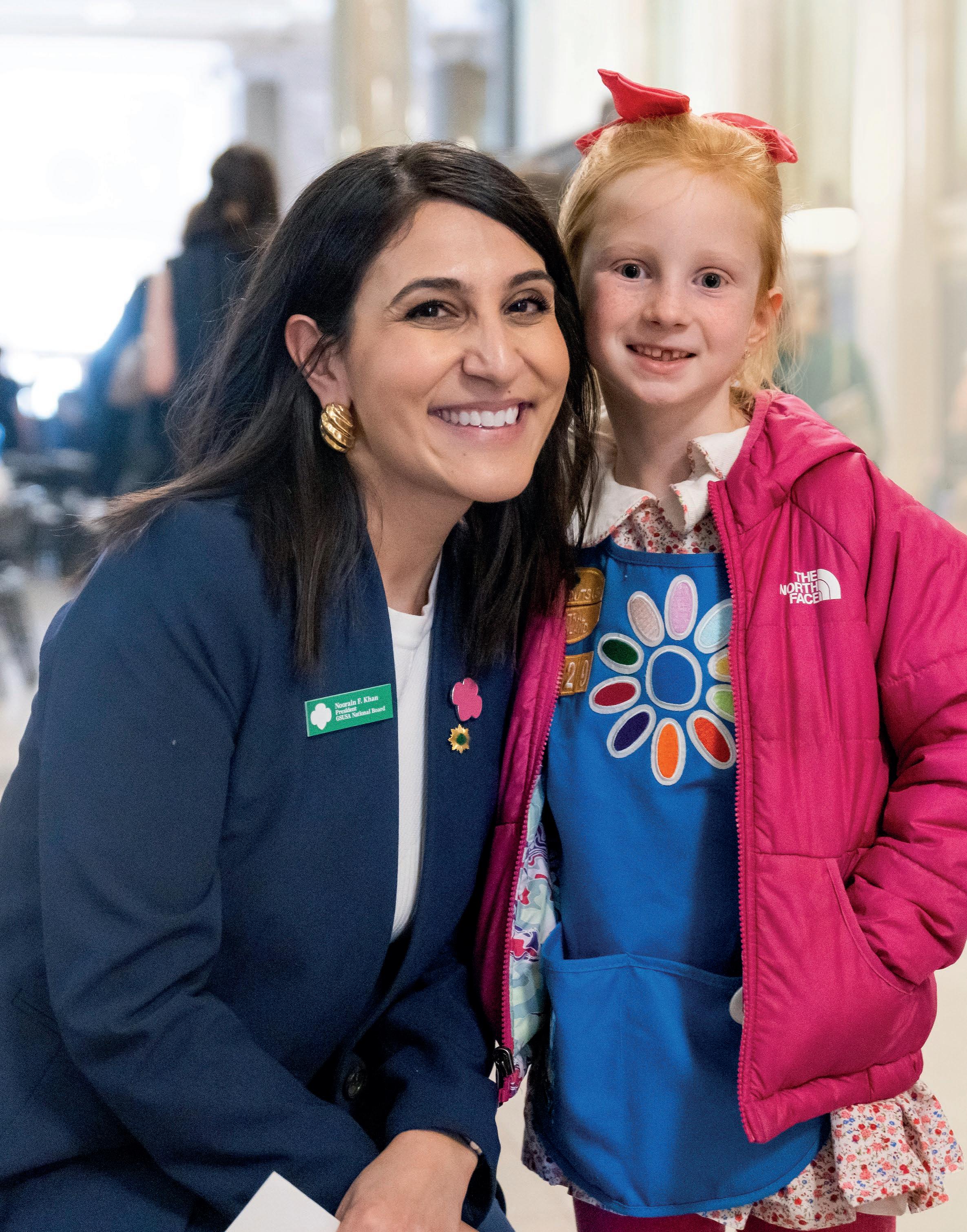
Noorain Khan (Michigan & St Antony’s 2006) is the National President of Girl Scouts of the USA and a philanthropic strategist. After leaving her career as a lawyer, she spent nine years at the Ford Foundation and has worked as a policy advisor to the White House. She also curates Mission Critical, a monthly Substack of social impact jobs in non-profits and philanthropy.

What constitutes a purpose-led career? What’s in your mind when you’re picking jobs to put in Mission Critical ?
I look for opportunities that I would be genuinely interested in or curious about, especially at organisations I’m familiar with through my work. I ask, ‘Is this aligned with my values?’ and ‘Does this sound fun?’ I imagine folks looking for opportunities with different skill sets (accounting, art direction, strategy etc.) and different levels of experience (right out of college, seasoned c-suite executives etc.) – and I consider whether I would personally be interested in the job if I sat in their seat.
I spend a lot of time curating the opportunities and it’s very personal to me, which is why it’s not something I outsource.
It really represents the fun and joy and opportunity I see available for those seeking purposeful work.
While it began focused on nonprofits and philanthropy, over time I’ve been mindful to include purposeful private sector work too in the realms of ESG (Environmental, Social and Governance) and beyond.
I now have more than 20,000 subscribers. I began the list because dozens of job seekers in my network each month wanted to talk about working in philanthropy. It simply wasn’t possible for me to meet with everyone, so I just collected things that came my way that I thought were cool. That was a way for me to scale my insights and my connections. And it really grew on its own.
You had a career as a lawyer before moving into the public sector. What was difficult about making that move and what triggered you to do it?
Finding the confidence and understanding to make this leap was a challenge. What ultimately solidified my decision was spending my final year at the law firm deeply engaged in a major Girl Scout project as a volunteer. I had used all my vacation time on it, which prompted me to ask: Is this just a ‘nice to have’ that replaces my vacations? Or could I build a professional life where this was my actual work? That realisation was profoundly clarifying for me.
Once I knew I wanted to make a change, I then had to figure out how to do it. This raised a whole other set of questions. Understanding where you fit in an entirely different ecosystem is challenging. You might have professional expertise and seniority, but lack subject matter knowledge, understanding of sectoral dynamics or even the right vocabulary. This awareness gap is harder in some ways when you are coming out of a very intense and selfcontained work environment. As a lawyer, I was completely consumed by my work; I simply didn’t have bandwidth to think beyond it. And my professional circle at the time was almost entirely other lawyers working at my firm or other similar firms. This meant I hadn’t built relationships, didn’t know organisations’ reputations, and lacked a broad network in the public sector. Skill matching presents another challenge. The more senior you become in your private sector career, the more complicated the transition. You often don’t have the exact skill set needed to move laterally – you may need to accept a position with less seniority and certainly take a pay cut. It eventually all evens out and I think having the perspectives across sectors strengthens my decisionmaking and offers me unique insights and perspectives.
Do you think there’s an element of privilege in being able to say, ‘I’m going to make this break, take a pay cut, move to the public sector’? Absolutely. I recognise the privilege that enabled my own transition –from the Rhodes Scholarship that
eliminated graduate student debt, to the Soros Fellowship for New Americans which minimised my law school debt, to my law firm’s generous compensation that created financial stability before I made the leap. Taking a significant pay cut simply isn’t feasible for everyone.

And yet, if this privilege is available to you, I encourage you to use it. The purpose of privilege and the purpose of accumulating capital is to put it to work.
So it becomes almost a responsibility of having that privilege?
‘ Leadership, to me, is fundamentally about deep listening’
I think about that in the context of being a Rhodes Scholar – what was given to me and how do I pay it forward? And that looks different for everyone. There are so many personal and family circumstances that inform, for example, how a Rhodes Scholarship materially and otherwise impacts you and your life trajectory. The onus is on you to be able to unpack that and determine the ways you can contribute. This is another reason why for me the central goal is purposeful work – that might mean for some people work in the public or social sector, and for others work in the private sector. The sector is less important than whether or not the work itself is purposeful.

What does it mean to you to be a leader?
Leadership, to me, is fundamentally about deep listening and orchestrating an environment where each person clearly sees how their unique contribution helps create something extraordinary – a vision that’s bold, ambitious and greater than what we
‘ It’s especially important for kids to observe the quiet leaders around them’
could achieve individually.
My role as a leader is to paint a compelling future that inspires genuine commitment, ensuring everyone understands both our destination and their vital part in contributing to the journey. True leadership mobilises people not through authority or directives, but through authentic engagement and buy-in – listening intently, building meaningful relationships and weaving individual stories into our collective narrative.
A second criteria for leadership is north star – what is the world you are trying to build through your and your team’s impact? For me, I’m working toward building a world where mutual care, empathy and understanding flourish – where people recognise their interconnectedness and demonstrate resilience when facing setbacks.
I also believe character and ethics are non-negotiable elements of effective leadership today. My leadership philosophy is anchored in ethical decision-making: choosing what’s right over what’s expedient, even when that path is challenging.
There are so many incredibly important and worthy causes in the world, and resources are finite. How you think about being a leader in the philanthropic world? Working in philanthropy brings a heightened responsibility – philanthropy is stewarding finite resources, and it must do so to produce maximum impact while honouring the humanity of everyone involved.
At the Ford Foundation, we had a framed list of ‘The Seven Deadly Sins of Foundation Executives’ on my floor that I reflect on often. Several particularly resonate: ‘Believing the Flattery’, ‘Surrendering to the Whims of Arrogance’, ‘Surrendering to Cynicism’ and ‘Taking the Easy Way Out’.
Based on these principles and my experience, clear
communication with grant seekers is crucial – be direct and responsive, deliver difficult news straightforwardly to prevent wasteful speculation, and explain your reasoning or make connections when possible.
Equally important is building deep, trusting relationships with grantees and, whenever possible, empowering those closest to the issues to influence your strategic direction.
How do we mitigate some of the more toxic examples of leadership children may see?
Kids observe the world around them deeply and caregivers have a critical role in narrating the world around them and helping young people understand, process and interpret what they’re seeing.
It’s especially important for kids to observe the quiet leaders around them, the ones without formal titles who step up and make good and important things happen – the caregiver volunteers who organise our Sunday school, the folks who organise our neighbourhood cleanup, those who fundraise for kids experiencing violence in faraway places. A caregiver can elevate and unpack this kind of leadership in action.
I think that’s our job – to open up their world and their aperture about what a leader looks like, and those qualities that that person embodies.
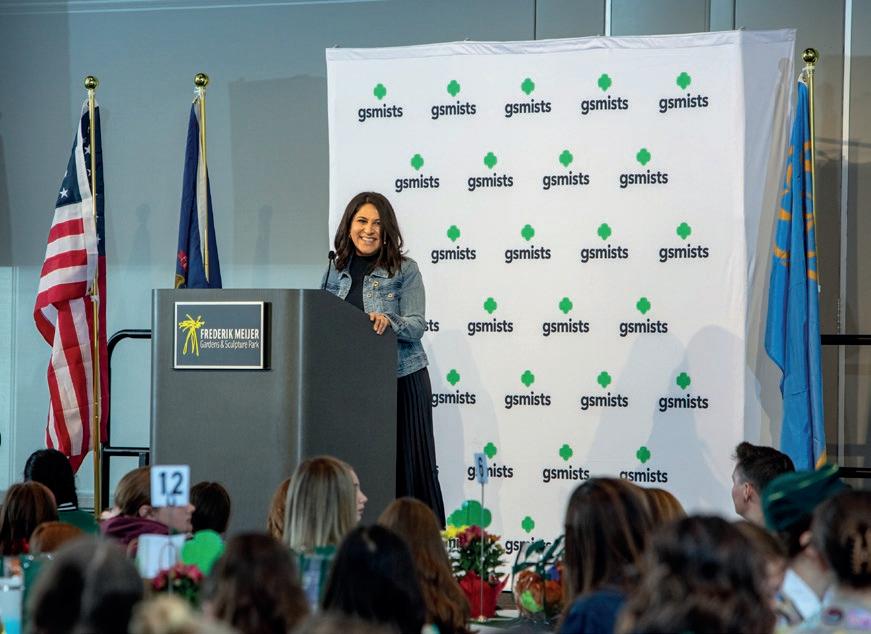
Cephas Svosve (Zimbabwe & Linacre 2020) is reading for his DPhil Mathematics (Risk Estimation in Finance). He is also the founder of EcoWealth, which accelerates green energy adoption in Zimbabwe by offering solar accessibility for marginalised communities facing severe power shortages. Here, he guides us through his innovative work.
At EcoWealth, we are spearheading a transformative shift toward green energy in Zimbabwe by making solar power accessible to households that would otherwise struggle to afford it. Our mission is to foster a community-centred energy transition that not only addresses the country’s electricity crisis but also empowers families with sustainable solutions.


a DDRESSI ng a CRITIC al En ERgy SH o RTag E Zimbabwe is facing an unprecedented energy crisis. The primary source of electricity, the Kariba Dam, has been drying up due to El Niño-induced droughts, reducing its energy generation capacity to below 15% of normal levels. Meanwhile, the Hwange Coal Station, the secondary energy source, is being phased out due to outdated infrastructure. As a result, families in both urban and rural areas experience frequent power outages, sometimes lasting days.
Compounding the crisis is the government’s limited financial capacity to construct new energy plants. The available funds are largely allocated to commercial clients, leaving domestic households with little support. Additionally, the high upfront cost of solar systems makes them unattainable for most families, as saving is difficult due to inflation and economic instability. Traditional bank loans are also out of reach for many, given Zimbabwe’s high unemployment rate and outdated, overly simplistic credit models that classify informal economy workers as high risk.
a U n IQUE S ola R FI nan CI ng S olUTI on Recognising these challenges, EcoWealth developed an innovative financing model tailored to the realities of Zimbabwean households. Our approach leverages alternative credit assessments that consider informal incomes and diaspora remittances, which significantly contribute to the country’s economy each year. We offer household solar systems on credit, using the systems as collateral, and charge fair, sustainable interest rates comparable to those in other economies. In contrast,
local microfinance institutions impose exorbitant rates of 15% per month – or an astonishing 535% annually – on USD credit. The EcoWealth model has accelerated the adoption of solar energy, providing families with access to electricity without the heavy burden of upfront costs. So far, we have successfully installed over 60 systems across 80% of Zimbabwe’s major provinces.
C a RB on FooTPRI n
In addition to expanding energy access, our work delivers substantial environmental benefits. The solar systems we have deployed offset carbon emissions equivalent to the carbon absorption of approximately 16,000 mature trees. By replacing fossil-fuel-based electricity with clean solar power, we are actively fighting climate change and paving the way for a more sustainable future in Zimbabwe.
TR a DI ng I n zIMBa BWE
EcoWealth has also made strides in energy trading by successfully connecting Zimbabwe’s first domestic solar system to the national grid via net metering. This allows households to send excess energy back to the grid in exchange for prepaid electricity tokens. These tokens act as future energy credits, enabling customers to store value in a way that is protected from inflation. By fostering a network of solar-powered households, we are laying the groundwork for a decentralised energy system where communities can generate, store and trade electricity.
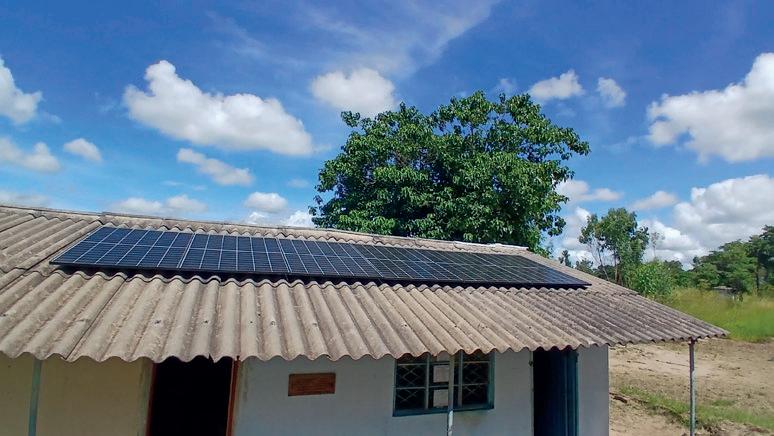
RECogn ISED Fo R IMPaCT: M an DEla
RH o DES Fo U n DaTI on aWa RD

Our work in democratising energy access and promoting green solutions has not gone unnoticed. We were honoured to receive the People’s Choice Award from the Mandela Rhodes Foundation in recognition of our contributions to sustainable energy solutions. This acknowledgment reaffirms our commitment to driving change in Zimbabwe’s energy landscape and inspires us to continue innovating. Despite our progress, funding remains our primary constraint. We have deliberately focused on building a solid proof of concept without strongly pursuing formal funding rounds. However, we believe our traction to date positions us well for future funding opportunities.
We are proving that a clean energy future is not only possible but already in motion

With abundant sunlight hours well above the global average and a population open to economic adaptation, Zimbabwe is wellpositioned to transition to solar energy on a national scale. Through EcoWealth, we are proving that a clean energy future is not only possible but already in motion. By continuing to build a strong community of solar-powered households, we aim to create a selfsustaining, resilient energy ecosystem that benefits both people and the planet. As we look ahead, our vision remains clear: to empower families, reduce carbon emissions and drive Zimbabwe’s transition to renewable energy – one household at a time

Earlier this year, middleweight Michael Cheng (Pennsylvania & Magdalen 2022) and light-middleweight Fahad Abdulrazzaq (Virginia & St Hilda’s 2024) broke an eight-year losing streak for Oxford’s amateur boxing team, winning the 2025 Varsity match. Here, they reflect on fighting for and studying at Oxford as Rhodes Scholars.
Since 1897, Oxford and Cambridge have made their grudge match physical through the annual Varsity boxing match, the oldest boxing tournament in the world. Each year, nine Oxford men fight the Varsity match, vying for the university’s highest athletic honour: a ‘Blue’. 2025 was the first year where two of the nine Oxford boxers were Rhodes Scholars, and Michael and Fahad are the first Rhodes Scholars to win Blues in boxing in more than 20 years, following in the footsteps of Kris Kristofferson (California & Merton 1958).
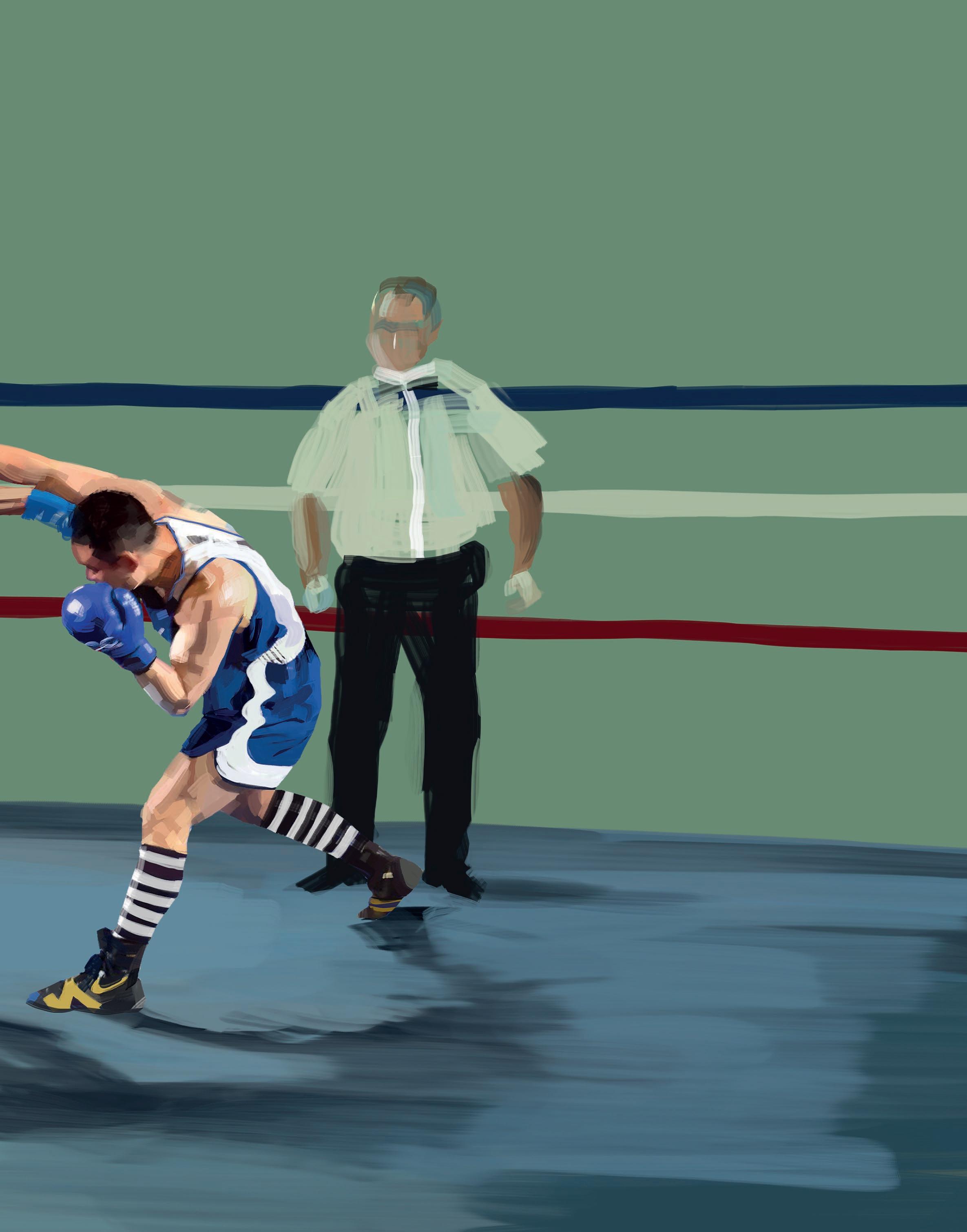


Michael Cheng, DPhil in Philosophy
Igrew up in Philadelphia, with immigrant parents who feared standing out – a fear I inherited. I was an extremely clumsy child who constantly tripped over things. Since I couldn’t trust my instincts, I stuck to safe paths. I achieved results, but sometimes felt unfulfilled. I spent many teenage nights back in West Philly, even after moving to the suburbs.
At age 21, I won a Rhodes Scholarship and pursued an engineering doctorate because I feared the risks of leaving the safe path. But during my second year, a medical misadventure shattered my plans. I left Oxford without a degree. I was 23 years old, but for many months I feared that I would never be healthy again.
I needed a distraction from doctor’s appointments. That’s when I met Fil, a schoolteacher who taught me to box in his once-abandoned, unheated warehouse gym that charged £50 a month. He had honour. Fil spent his free time teaching disabled people sports in a world that often excludes disabled people from basic education.
Boxing is a rough sport, but it felt right. Boxing taught me that fearing danger makes you more vulnerable. Real

safety isn’t about avoiding danger – it’s about skilfully taking calculated risks.
I was blessed to regain my health. I realised that I only have one life in this world at this time, so I should live a life that I actually want. I returned to Oxford, switched to a philosophy degree, and joined Oxford’s century-old Varsity boxing team. After an epoch where my body and mind were out of my hands, I was in control.
My teammate, Fahad Abdulrazzaq, had arrived in America as a seven-year-old Iraqi refugee and grown into a rugged Army officer, toughened by West Point’s national championship boxing team. With weeks until Varsity and four kilograms separating us, we sparred daily. Fahad’s uppercuts tested me, but the best response was to heed Lieutenant Abdulrazzaq’s command: ‘fight your fight’. I had to trust myself.
On a chilly night beneath the ornate galleries of Oxford Town Hall, I stepped into the ring for the 117th Varsity match. I’d competed and won before, but I had never felt less fear in my life. As I faced a taller, sturdier Cambridge man, I realised I was no longer afraid of the unknown.
The bell rang. We danced around the ring, trading blows. After two rounds, I thought I was losing. I’d smashed his head back at least twice, but his right cross was powerful. But in the final round, I felt a surge of determination and drove him into the ropes. Nevertheless, I believed that I’d lost on points.
Then they called my name. Unanimous decision. Oxford’s first team victory in eight years. I stepped into the crowd and was mobbed with hugs and handshakes.
As the night faded, a familiar face surprised me: my opponent vomiting into a trash can, tethered to a humming medical device. Several women surrounded him, watching numbers tick through the screen.
I spent months sparring with my feelings. Did the reward justify the price?
A friend replied: ‘I saw him suffering in the back with the medics. Rough sport but both people stepped into the ring with the same intentions and understanding of the risks. Better man won on the night. You should be proud of the work that you put in.’

Is boxing safe? Probably not. I’ve watched fighters earn broken noses, concussions and worse. But risk is part of the reward. Some lessons can only be learned from taking down someone trying to hurt you – and from knowing that when you are knocked down, you will get back up, keep fighting and become stronger.
Overall, boxing enriched my life immensely. I stopped running from uncertainty. I was decisive and confident. I won lifelong social approval for actions that would bring criminal charges outside the ring.
Rhodes Scholars are called to ‘fight the world’s fight’, but few fights are win-win for everyone. A new technology or law can be great for 75% of people but irreversibly harm 25%. Often, the losers don’t get the recognition of standing in the ring and facing the crowd. They are forgotten, even when they have lost far more than a fistfight. No algorithm will ever grasp those feelings; only humans who live for the attempt can. Only those who step into the arena, who swing against the face of fear, can truly know the meaning of freedom.
On 14 March 2025, I stepped into the ring, surrounded by a sea of cheerful faces and blacktie-clad members of the Oxford crowd. It was my first boxing match wearing an Oxford blue kit. I felt relaxed and confident as months of Iffley Gym preparations had finally come to be tested. As I stood in the ring, I faced my red-kitted Cambridge opponent. At that moment, I felt a bittersweet sensation. This was my last ever competitive boxing match.
In May 2024, I graduated from the United States Military Academy at West Point. While my Alma mater is hailed as the ‘premier leader development institution in the world’, I found most of my growth to be in the ring.
For four years, I boxed in a black and gold kit. Boxing, among other combat sports, is often associated with grit and self-discipline – and rightly so. Naturally, the academy’s culture is synonymous with these values. However, for me,
boxing presented challenges beyond the physical.
It taught me the value of humility and the power of teamwork. As I rose through the ranks of my team, I realised that much of my growth came from learning to take a punch before throwing one. I learned to seek advice from my peers and not let stubborn pride stand in the way of progress. By continually engaging with that boxing family, I discovered my warrior spirit.
The Rhodes Scholarship has offered me yet another outlet to channel and sharpen my warrior spirit. Earning my Blue as a Varsity boxer stands as a powerful testament to that drive – discipline forged in the ring, resilience cultivated through every round.
Yet, more than anything, it has been the profound connections with my Rhodes cohort and the immersion in the University’s intellectual rigour that have most inspired me. Surrounded by individuals who lead with both brilliance and compassion, I have found not only academic stimulation but also a deep sense of purpose. For me, the Scholarship has become more than a platform for achievement; it has been a crucible for growth – challenging me to engage, reflect and rise.

Jevon Marsh (Newfoundland & University 2021) is reading for a DPhil in chemistry. His research focuses on the development of new therapeutic drugs to overcome some of the current limitations in cancer treatment. Here, he gives us a glimpse of the science that is powering his work.
It’s widely known that cancer is one of the leading causes of death worldwide,1 with an abundance of research exploring novel treatments and delving deep into the complex tumour environments of cancers, especially the hypoxic (low oxygen) regions in solid tumours. These regions result in resistance to modern treatments and metastasis of the tumour, and lead to a poor prognosis for cancer patients.2 , 3 Therefore, there is an increasing need to better understand how to address these perpetually complex environments to overcome some of the current limitations in cancer treatment.
Currently, of the chemotherapeutics prescribed to cancer patients, over 50 % are a platinum(II) (Pt(II))-based drug,4 and amongst these are cisplatin, oxaliplatin and carboplatin which are approved for use globally, emphasising their clinical significance. However, despite their clinical success spanning decades, Pt(II) complexes portray a wide range of complications including off-site toxicity resulting in various side effects.5 , 6 To overcome these side effects, researchers investigated how formulating these Pt(II) complexes as Pt(IV) prodrugs could mask the toxicity of the Pt(II) chemotherapeutics. The Pt(IV) prodrug is considered relatively inert and nontoxic to cells until they are ‘activated’ by converting back into their Pt(II) congeners, with the activation occurring mostly in cancer cells, reducing the effect on normal, healthy cells. Although Pt(IV) prodrugs have been
exhaustively investigated over the past few decades, their relationship with hypoxic environments of solid tumours remains largely unexplored.
My research aims to increase our knowledge in this area by synthesising various Pt(IV) prodrugs and investigating them in the context of tumour hypoxia to explore their toxicity profile in these environments. More specifically, my DPhil investigates various versions of Pt(IV) prodrugs based off the three globally prescribed chemotherapeutics mentioned previously, namely cisplatin, oxaliplatin and carboplatin.
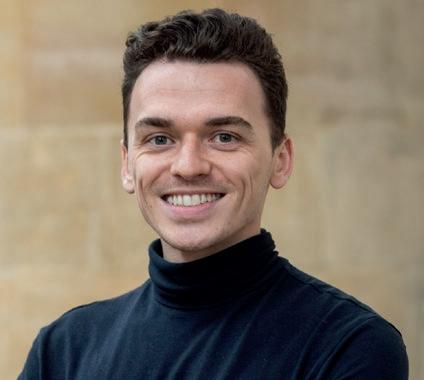
Excitingly, one of our complexes, CarboNap, that is based off carboplatin, showed unprecedented and selective toxicity under hypoxic conditions in a lung adenocarcinoma cell line.7 Figure 1 shows how CarboNap, our Pt(IV) prodrug, is activated under hypoxic conditions (<0.1 % oxygen (O2) concentration) into carboplatin, its toxic Pt(II) counterpart (see Figure 1a), and how we can observe this activation by monitoring an increase in green fluorescence emission, with the most activation (i.e. most intense green emission) observed under hypoxic conditions (<0.1 % O2, Figure 1b). Furthermore, a significant reduction in the number of surviving lung adenocarcinoma cell colonies was observed after treatment with CarboNap when under hypoxic conditions, compared to colonies treated under a normal environment (21 % O2), demonstrating CarboNap’s selective toxicity under hypoxia (Figure 1c).
We were then interested to see if a similar behaviour would be observed with other derivatives based off the carboplatin scaffold, and synthesised other Pt(IV) prodrugs, ensuring a similar chemical structure to CarboNap was maintained. Like CarboNap, these novel prodrugs also demonstrated selective toxicity under hypoxic environments. This data led us to propose that Pt(IV) prodrugs derived from carboplatin with an aryl carbamate functional group (Figure 1d) has an unprecedented selective toxicity under hypoxic environments and can be regarded as Hypoxia Activated Platinums (HAPts).
This work has led to the discovery of a novel chemical scaffold that is toxic to cancer cells under notoriously difficult-to-treat hypoxic conditions, and elucidated a potential structural design requirement that chemists should consider when developing chemotherapeutics for targeting hypoxic regions in future. Currently, I am continuing to expand on this data and developing other drug candidates for applications towards tumour hypoxia. I would like to especially thank my supervisor Dr Adam Sedgwick and our biological collaborators Dr Lina Hacker and Prof Ester Hammond for their support throughout my DPhil.

Figure 1: (a) Activation of CarboNap into cytotoxic carboplatin under hypoxic conditions (<0.1 % O2); (b) representative fluorescence microscopy images of lung adenocarcinoma cells treated with CarboNap under different oxygen (O2) concentrations (21, 2 and <0.1 %) with an increase in green fluorescence emission intensity indicative of CarboNap activation; (c) cell colonies after treatment with CarboNap in normoxic and hypoxic conditions (21% and <0.1 % O2, respectively); and (d) General chemical structure of a Hypoxia Activated Platinum (HAPt) based off carboplatin with the aryl carbamate functional group circled; R represents a general substituent. Images adapted from our recent publication.7
REFEREn CES
1. H. Sung, J. Ferlay, R. L. Siegel, M. Laversanne, I. Soerjomataram, A. Jemal and F. Bray, CA Cancer J Clin, 2021, 71, 209–249.;
2. Z. Chen, F. Han, Y. Du, H. Shi and W. Zhou, Signal Transduction and Targeted Therapy 2023 8:1, 2023, 8, 1–23.;
3. B. Muz, P. de la Puente, F. Azab and A. K. Azab, Hypoxia, 2015, 3, 83.;
4. T. C. Johnstone, G. Y. Park and S. J. Lippard, Anticancer Res, 2014, 34, 471.;
5. E. Wexselblatt and D. Gibson, J Inorg Biochem, 2012, 117, 220–229.;
6. Y. Shi, S. A. Liu, D. J. Kerwood, J. Goodisman and J. C. Dabrowiak, J Inorg Biochem, 2012, 107, 6–14.;
7. J. W. Marsh, L. Hacker, S. Huang, M. H. C. Boulet, J. R. G. White, L. A. W. Martin, M. A. Yeomans, H. H. Han, I. Diez-Perez, R. A. Musgrave, E. M. Hammond and A. C. Sedgwick, Dalton Transactions, 2024, 53, 14811–14816.
Rhodes Connect has always sought to find ways for Scholars to share their work with the rest of the community. The Book of the Week feature has proved to be a very effective way of doing this, but we were acutely aware that it is inherently limited to authors of books. Scholar Spotlight was created so that we could feature any Scholar.
At its heart, Scholar Spotlight has just one question: ‘What are you working on at the moment?’ It doesn’t try to compete with the Rhodes Scholar Oral History Project and go into life stories, it’s meant be about the right here, right now. Tell the community about your current research, your new book, what brings you back to Oxford for a visit, how you are spending your retirement. Of course, that provides a path into so many other questions, which sometimes do find us rewinding all the way back to Scholars’ memories of Oxford – there are deliberately no rules about structure.
“ My passion for the last 20 years has been education in Africa, particularly West Africa. And that’s what I’m working on right now. ”
Claudena Skran (Michigan & Magdalen 1983)
While many of the spotlights are video interviews, we’ve also featured new albums of music by Kate Trajan (British Columbia & Linacre 2007) and Olga Romanova (Russia & St John’s 2019), and it has provided an opportunity to highlight Scholars no longer with us. It was the perfect place to pay tribute to Kris Kristofferson (California & Merton 1958) when he died in September 2024, including his performance in the Ashmolean Museum at the Trust’s 110th Anniversary. It has also allowed us to include less well-known stories from the archives such as Arthur Porritt (New Zealand & Magdalen 1923), on the 100th anniversary of his bronze medal in the ‘Chariots of Fire’ race at the 1924 Olympics, and Charles Chatfield (Nevada & Lincoln 1921) who donated the magnificent tulip tree in the Rhodes House garden.
After interviewing poets and politicians, doctors,
directors, dramatists and diplomats it’s hard to pick out highlights from the first year of Scholar Spotlight But special mentions have to go to Malcolm Whyte (Queensland & Balliol 1947) who, at the age of 103, read haikus from the booklet he compiled from his 60 years of writing, and Elizabeth Kiss’s (Virginia & Balliol 1983) memorable ‘farewell’ interview shortly before stepping down as Warden. Unsurprisingly, this remains the most viewed recording of the series.
“ Being one hundred / attracts wonder and acclaim / Like a magician ”
Malcolm Whyte (Queensland & Balliol 1947)
Many of the interviews are conducted on Zoom, but we’re trying to take the opportunity to catch as many Scholar visitors to Rhodes House as possible. The Garden Pavilion continues to be our favourite location for filming – the ever-changing light presents a few challenges but rewards us with beautiful reflections in the glass walls.
“ The Garden Pavilion is my favourite spot in Rhodes House. It’s just such a beautiful building. It’s a very flexible space that gives us a sense of being nestled in the gardens. ” Elizabeth Kiss (Virginia & Balliol 1983)
If you’ve opted out of the weekly email, you can find the full series of features on Rhodes Connect. If you’d like to take part in the series, email connect@rhodeshouse.ox.ac.uk
We typically schedule a 30-minute Zoom call, which we then edit down to five to ten minutes.





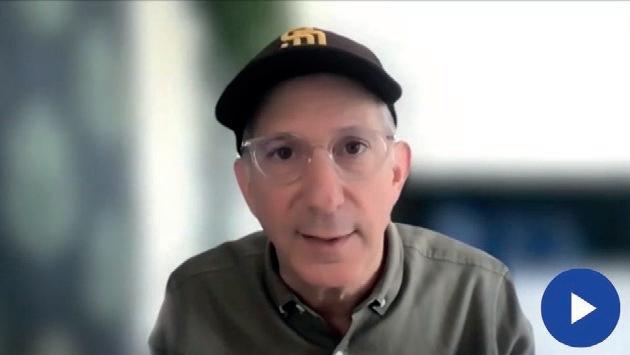
“ I was the only person in the arts in my cohort of 32 American Scholars – there’s this sense that tends towards people that are going to move into politics or journalism or the more conventional ideas of how leadership is provided. What I know now all these years later is that I am absolutely a community leader here in San Diego. The arts are a force for leadership that can chart a path for people who are trying to solve the issues that are shaking the United States. ”
Barry Edelstein (Massachusetts & Pembroke 1986)
“ I don’t come from a political family, I didn’t have a lot of political connections, I worked my way up from the very bottom rung at the State Department – my first office was shared with the photocopy machine. ”
Andy Kim (New Jersey & Magdalen 2005)
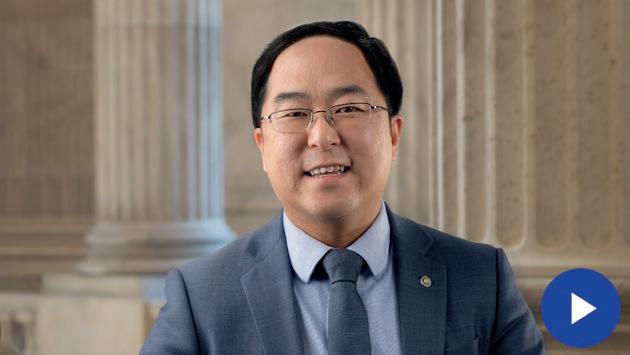

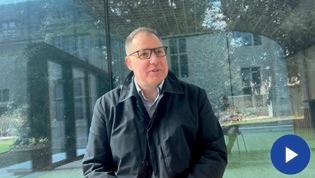
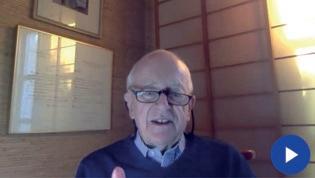
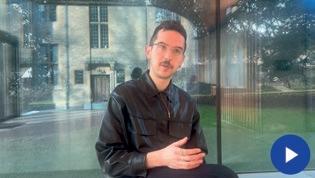
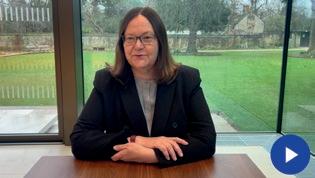


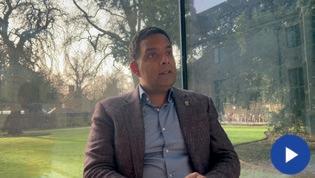


Across our social media channels, Scholars in Residence have been taking over!
Scholar takeovers invite questions on everything from the application process to dealing with the UK’s famously gloomy weather, offering tips on how to navigate academic challenges, community life and sport in Oxford (plus where to find the best food, of course!). The aim? To show future Rhodes Scholars what life in Oxford is really like. Max Han (Malaysia & St John’s 2024), Leago Sebesho (South Africa-at-Large & Jesus 2024) and Zandy Wong (Virginia & Jesus 2024) are just three of the Scholars who have been sharing their Oxford lives online.
“ It’s been really exciting picking up a breadth of skills and knowledge and I’ve had a lot of fun through the course ”
“ My mornings are usually used for deep academic work ” “There can be a certain disconnect in academia sometimes, but I’ve also seen researchaction-oriented in practice ” “ I’m intrigued, I’m growing, I’m learning, I’m challenged ”
“ The common trait I’ve noticed is that everyone is impact-oriented ”
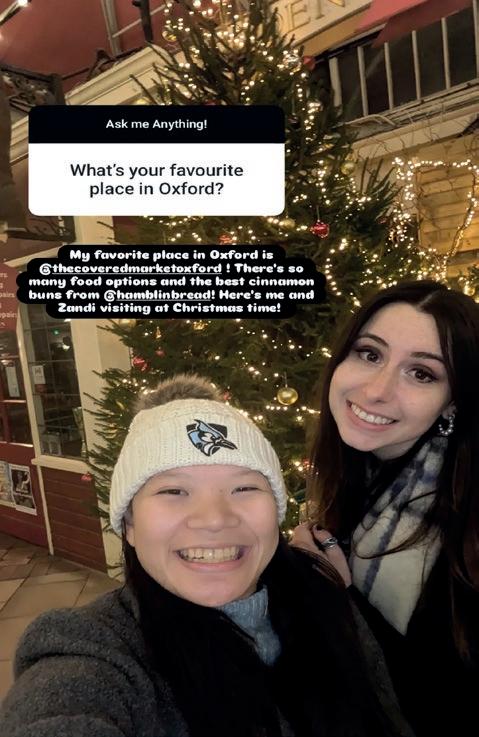

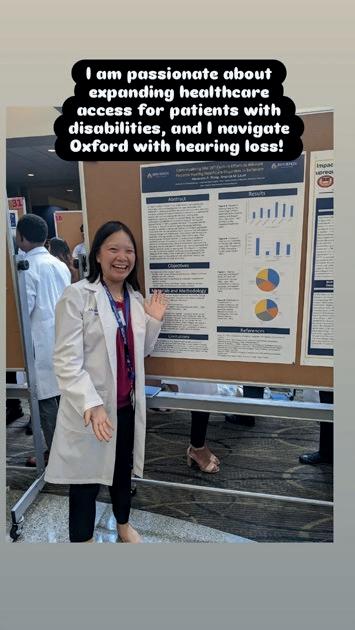
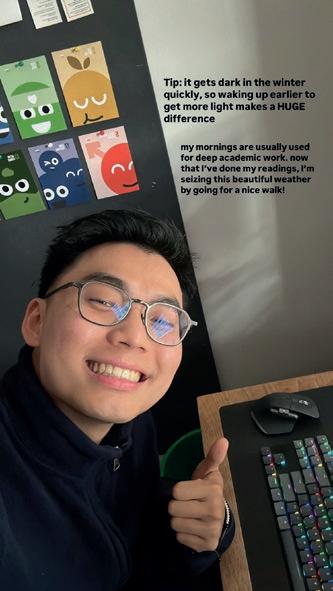
“
There’s a lot of support, so you don’t feel like you are managing the transition alone”
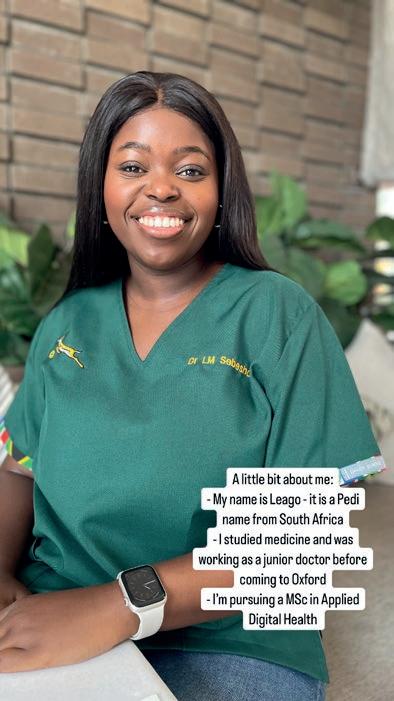

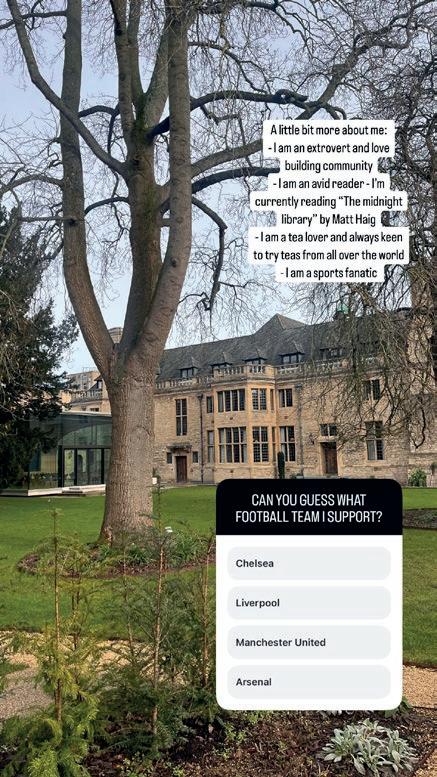
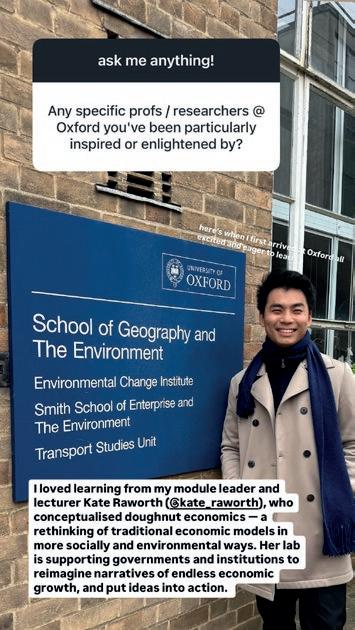
Follow future takeovers
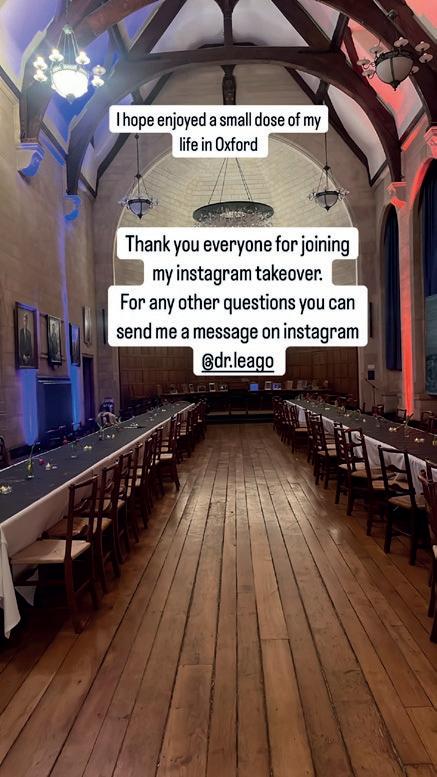
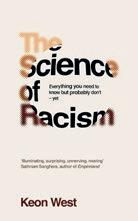
The Science of Racism by Keon West (Jamaica & Balliol 2006)
Polls show that over 50% of us don’t believe racism exists. In a world made for White people, The Science of Racism uses clear scientific research to expose what we know about racism, exactly how we know it and what we can do about it. Professor Keon West cuts through the divisive anecdotes and rhetoric with decades’ worth of clear, factual, rigorous science – the data that reveals truths about racism that are shocking and tragic, but also (somehow) funny and entertaining.
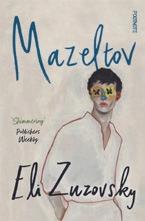
Mazeltov by Eli Zuzovsky (Israel & St John’s 2021)
In a glorious debut, a boy confronts queer lust, shame, the threat of war and the plague of family on the day he becomes a man. At a banquet hall, at the onset of war, Adam Weizmann’s bar mitzvah party turns into a glorious catastrophe. On the cusp of manhood – and the verge of a nervous breakdown – Adam has been bracing for his special day, mired in family neuroses and national dysfunction. At once tender and lustful, a work of scathing satire and piercing insight, Mazeltov is a wholly original vision of a young man’s quest to know his own heart.
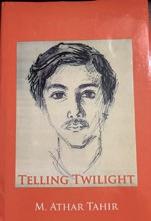
Telling Twilight by M. Athar Tahir (Pakistan & Oriel 1974)
Telling Twilight is a collection of sonnets that offers a captivating experience for poetry lovers. Melodious yet mathematical, each piece attempts to capture the essence of contemporary humanity – the pervasive ambiguity and constant transitions woven into the very fabric of life.

How Not to Die (Too Soon): The Lies
We’ve Been Sold and the Policies That Can Save Us by Devi Sridhar (Florida & Wolfson 2003)
Have you ever questioned why, despite the avalanche of self-help books and optimisation hacks, we remain embroiled in multiple global health crises?
Populations worldwide are gaining life-shortening excess weight (even in poorer countries), and water contamination is rampant (even in richer countries). The stark reality is that we’ve been sold a monumental lie. The obsession with individual health optimisation has distracted us from the real game-changer: holding governments accountable for policies that can significantly extend our lifespans.

Slaveroad by John Edgar Wideman (Pennsylvania & New College 1963)
For centuries, the buying and selling of human beings was legal, and millions of Africans were kidnapped then forcibly transported across the Atlantic Ocean to serve as slaves. The enduring legacies of this slave road traffic – denied, unacknowledged, misunderstood, repressed – continue to poison the experiences and journeys of all Americans. John Edgar Wideman uses his unique generational position to explore what he calls the ‘slaveroad’, offering ‘a fresh perspective of slavery’s impact and a confirmation of Wideman’s exalted status in American letters’ (New York magazine). Slaveroad is a groundbreaking work of ‘bruising candor and obsessive originality’ (The Wall Street Journal ).
For the complete virtual bookshelf, head to www.rhodeshouse.ox.ac.uk/impact/book-listing-page/

Voltaire: A Reference Guide to His Life and Works by Síofra Pierse (Ireland and Trinity 1994)
This Guide offers 21st-century readers a glimpse into the multifaceted Voltaire: the thinker, rebel, writer, exile and campaigner who became a transnational celebrity in his day. Targeted at readers who are new to Voltaire as well as at students already familiar with his life and works, the Guide shows how the indefatigable Voltaire exercised his quill to put his unique stamp on the vast, flawed 18th-century world around him.

When the Mapou Sings by Nadine Pinede
(Connecticut & St John’s 1986)
Infused with magical realism, this story blends first love and political intrigue with a quest for justice and self-determination in 1930s Haiti. Sixteen-year-old Lucille hopes to one day open a school alongside her best friend where girls just like them can learn what it means to be Haitian: to learn from the mountains and the forests around them, to carve, to sew, to draw and to sing the songs of the Mapou, the sacred trees that dot the island nation. But when her friend vanishes without a trace, a dream – a gift from the Mapou – tells Lucille to go to her village’s section chief, the local face of law, order and corruption, which puts her life and her family’s life at risk.

Question 7 by Richard Flanagan (Tasmania & Worcester 1984)
This is a book about the choices we make and the chain reaction that follows... By way of H. G. Wells and Rebecca West’s affair, through 1930s nuclear physics to Flanagan’s father working as a slave labourer near Hiroshima when the atom bomb is dropped, this daisy chain of events reaches fission when a young man finds himself trapped between life and death. Flanagan has created a love song to his island home and his parents and the terrible past that delivered him to that place.

Black Majority: Race, Rice, and Rebellion in South Carolina, 16701740 by Peter H Wood (Maryland & Merton 1964)
First published in 1974, Black Majority marked a breakthrough in our understanding of early American history. Today, Wood’s insightful study remains more relevant and enlightening than ever. This landmark book chronicles the crucial formative years of North America’s wealthiest and most tormented British colony. This revised and updated 50th anniversary edition challenges a fresh generation with provocative history and features a new epilogue by the author.

John Soane’s Cabinet of Curiosities by Bruce Boucher (Alabama & Magdalen 1970)
An in-depth study that sheds a fascinating new light on Sir John Soane (1753–1837) and his world-renowned collection. Sir John Soane’s architecture has enjoyed a revival of interest over the last 70 years, yet Soane as a collector –the strategy behind and motivation for Soane’s bequest to the nation – has remained largely unexplored. While Soane referred to the displayed objects in his house and museum as ‘studies for my own mind’, the ambiguity surrounding his motivation remains perennially fascinating.
Part of the Lifelong Fellowship portfolio, the Scholars’ Library is a monthly book talk series, open to Scholars and the general public. In each event, Scholars present, discover and debate their literary works with those in the community and beyond. Visit bit.ly/scholars-library to watch previous events, including several of the authors featured here.
After winning the election for the role in November 2024, Lord Hague of Richmond was officially admitted as Oxford’s 160th
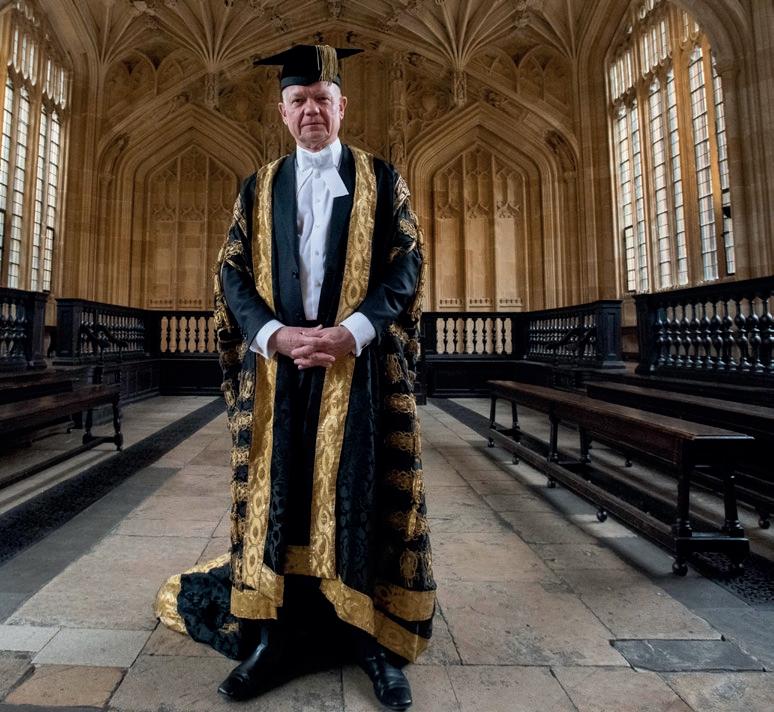
Chancellor in a ceremony that took place in the Sheldonian theatre in February. In his speech, Lord Hague said: ‘I thank all of you, the Convocation, for electing me as your chancellor and for your enthusiastic welcome in recent weeks. Every visit I have made so far and every conversation has intensified my excitement about the years to come. I happily dedicate myself today to working with you and for you.’
William Hague came from a comprehensive school in South Yorkshire to read PPE at Magdalen College, graduating in 1982. He has always said that Oxford changed his life. During his political career, he was the most widely travelled Foreign Secretary in British history and was known globally for the Campaign to Prevent Sexual Violence in Conflict, which he co-founded with the United Nations former Special Envoy to the High Commissioner for Refugees (UNHCR), Angelina Jolie. Since leaving government he has divided his time between business, charity and writing. He is a columnist of the Times, has written two historical biographies and is a Fellow of the Royal Society of Literature.

Dr Leah Veronese from Oxford’s English Faculty has unearthed a rare manuscript copy of Shakespeare’s famous Sonnet 116 tucked away in a seventeenth-century poetry collection. This is only the second known manuscript copy of the sonnet ever discovered, and it was found among the papers of Elias Ashmole (1617-1692), founder of the Ashmolean Museum. Dr Veronese came across the remarkable find while doing research for her DPhil. In this copy, the sonnet has been adapted as a song and includes seven additional lines, and changes to Shakespeare’s original opening and final couplet. Professor Emma Smith, Professor of Shakespeare Studies at Oxford, said: ‘This exciting discovery shows that centuries of searching for evidence about Shakespeare and his early reception hasn’t exhausted the archives.’
In June 2024, Reuben College welcomed the Chancellor of the University, the current and previous Vice-Chancellors, the Reuben brothers, the Trustees of the Reuben Foundation and their guests to the grand opening of the refurbished Reuben College buildings. Reuben Fellows, Graduate Common Room (GCR) Executive students, Heads of House from across the University and other senior University members also came to celebrate. Reuben College is a graduate college dedicated to fostering interdisciplinary exchange, focused on four cross-cutting themes: Artificial Intelligence & Machine Learning; Environmental Change; Cellular Life; and Ethics & Values.
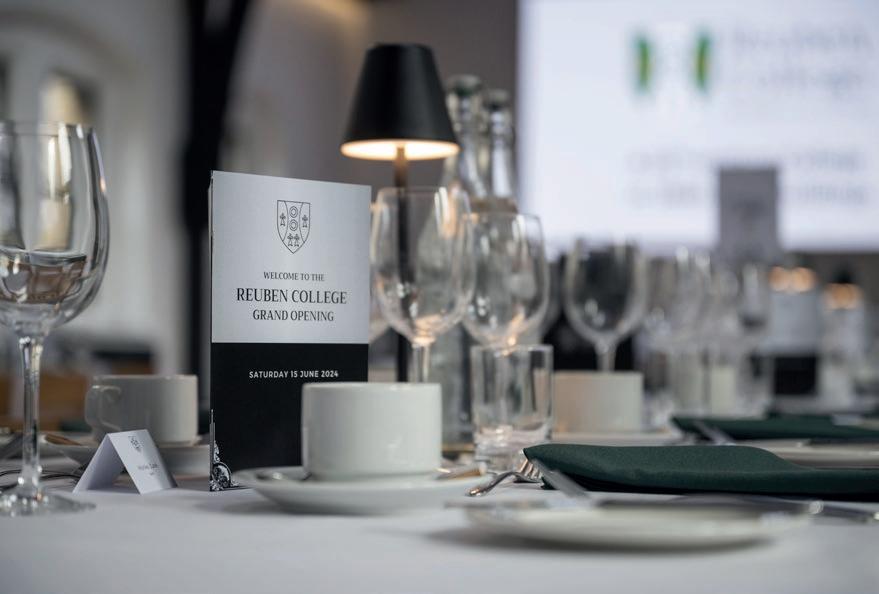

The results of a clinical trial into a new malaria vaccine candidate (RH5.1/Matrix-MTM) show it is well-tolerated and offers effective protection against the blood-stage of the disease – the first inoculation to do so. The study has been run by scientists at the University of Oxford in collaboration with the Clinical Research Unit of Nanoro (CRUN) at the Institut de Recherche en Sciences de la Santé (IRSS) in Burkina Faso, the London School of Hygiene and Tropical Medicine (LSHTM) in the UK and the National Institute of Health (NIH) in the USA, with support from other partners including the Serum Institute of India Pvt. Ltd, Novavax and ExpreS2ion Biotechnologies ApS. The results, published in The Lancet Infectious Diseases, showed the vaccine was well tolerated with no safety concerns.
Selected obituaries from the past year. For all Rhodes Scholar obituaries, please visit www.rhodeshouse.ox.ac.uk/alumni-volunteers/obituaries/
(Pakistan & Balliol 1961)
17 MAY 1940 – NOVEMBER 2024
Munir was an intellectual, writer, journalist, athlete and beloved figure in Pakistan’s social and cultural landscape. Following a brief stint working at IBM, he became a professional bridge player and represented Pakistan in international tournaments. His contributions to the game were honoured with a bridge convention named after him. While he continued to play bridge into his 60s, he found two new hobbies that morphed into professional successes in his 50s: golf and journalism. Where others would have played it safe, Munir chose to do his own thing. He had a surety about existence, its meaning or lack thereof, to lead a different kind of life.
(Rhodesia & Corpus Christi 1965)
4 JANUARY 1946 – 24 OCTOBER 2024
Patrick moved to the US in 1980 as a British-American Fellow of the American College of Cardiology. He was an Assistant Professor at the University of Michigan (1982-86) and later a Professor of Medicine at Indiana University, practising as an interventional cardiologist until 2019. A lifelong athlete, he played rugby and cricket in Rhodesia and the UK, excelled in squash at Oxford, and later embraced endurance sports. He ran the Boston Marathon seven times and completed over 50 Ironman events, including 10 Ironman and 10 Half Ironman World Championships.
(South Australia & New College 1957)
13 MARCH 1934 – 27 NOVEMBER 2024
David lived a life of extraordinary public service as an Australian diplomat from 1959 to 1998, including the United Nations in New York City, Counsellor in Yugoslavia and First Assistant Secretary for Europe, Americas and New Zealand, 1980. He also served as Australian High Commissioner to Ghana and Malaysia, and Ambassador to the Union of the Soviet Socialist Republics and Mongolia, Senegal and Ivory Coast.
(Québec & Trinity 1964)
2 DECEMBER 1939 – 24 SEPTEMBER 2024
Francis was a Canadian politician who was a member of the Senate, Cabinet minister, and Principal Secretary in the Prime Minister’s Office. Born in Montreal, Québec, Fox was a lawyer by training. He was elected as a Member of Parliament from 1972 to 1984, during which time he served as Solicitor General, Minister of Communications and Secretary of State. He was appointed to the Senate in 2005, representing Victoria until his retirement in 2011.
MORLEY HOLLENBERG
(Manitoba & St Catherine’s 1964)
2 JULY 1942 – 15 MARCH 2025
As a scientist, Morley worked tirelessly to reveal nature’s secrets in the molecular pharmacology of endocrine signalling, the control of inflammation and many other areas. He studied for his MD at Johns Hopkins and remained there as a postdoctoral fellow working on cholera toxin, peptides and receptors. He joined the faculty at Hopkins and then Calgary as Professor and Head of Pharmacology. He was inducted into the Royal Society of Canada in 2003, receiving its highest award, the McLaughlin Medal, in 2011. In the mid-1980s, he began his endeavour to express nature’s secrets visually and studied under the Chinese calligrapher and artist, Master Chin Shek Lam.
KRIS KRISTOFFERSON
(California & Merton 1958)
22 JUNE 1936 – 28 SEPTEMBER 2024
Singer, songwriter and actor Kris was a pioneering figure in the outlaw country movement. He was inducted into the Country Music Hall of Fame in 2004 and received the Grammy Lifetime Achievement Award in 2014. He was a three-time Grammy Award winner with 13 nominations. During the 1970s, he also embarked on a successful career as a Hollywood actor. He earned a Golden Globe for his performance in A Star is Born (1976), and was nominated for an Academy Award for Best Original Score for Songwriter (1984). He announced his retirement in 2021 with a final performance at the Hollywood Bowl in 2023.
LACHLAN MACLACHLAN
(Rhodesia & Exeter 1951)
16 MARCH 1928 – 20 MARCH 2025
Lachlan (known as Pat) worked as an architect and played rugby in what is now Zimbabwe and Malawi from 1854 to 1961, after which he emigrated to Canada with his family to take up a teaching position at Shawnigan Lake School. Pat taught mathematics and draughting and coached the First XV. His aptitude for organisation and his popularity with the students led to his appointment as Assistant Headmaster, and then Headmaster, on a permanent basis. In 1972, he left Shawnigan Lake School and established a successful business in Hong Kong and Southeast Asia as the admissions representative for secondary schools in Canada, Australia, the US and the UK.
WARREN MAGNUSSON
(Manitoba & Corpus Christi 1967)
28 JANUARY 1947 – 2 APRIL 2025
Warren began a remarkable career in the Department of Political Science at the University of Victoria in British Columbia in 1979, where he stayed until his retirement, and co-founded the interdisciplinary graduate programme in Cultural, Social and Political Thought. His work illustrated the intellectual project of his life, which was combining the big questions of political philosophy and theory with the nitty-gritty issues of how we manage to govern ourselves in complex urban environments. He is best known for his theoretical work devoted to undermining the concept of sovereignty by showing how communities of all shapes and sizes can and should govern themselves, rather than being at the mercy of all-powerful states.
(New Zealand & Exeter 1955)
5 MAY 1933 – 31 JULY 2024
Sir Colin specialised in the field of hypervelocity flight and used his knowledge at the Canadian Armament Research and Development Establishment in Québec before moving to General Motors in 1961. In 1971, Sir Colin was appointed Vice Chancellor of the University of Auckland, serving until 1994. His life of public service included serving on numerous government boards.
Sir Colin was awarded the Queen Elizabeth II Silver Jubilee Medal in 1997 and was appointed as a Knight Bachelor for ‘services to education and business management’ in the 1992 New Year Honours.
(India & Balliol 1968)
2 SEPTEMBER 1947 – 9 NOVEMBER 2024
Pradeep served as Chief Economist at the World Bank from 2002 until 2011, and was Sector Director of the Poverty Reduction and Economic Management Unit in the World Bank’s Europe and Central Asia Region. He published widely in public economics and development economics throughout his career.
(Kansas & Exeter 1961)
12 DECEMBER 1939 – 16 AUGUST 2024
Fred taught constitutional, international, local government and comparative law at the University of Minnesota Law School. He served as Counselor for International Law at the US Department of State, and helped represent the United States before the International Court in The Hague, Netherlands. He also served as a Director of the American Society for the Comparative Study of Law, and was involved in the process of creating the constitutions of Kosovo and South Sudan as they moved towards independence.
(New Jersey & Exeter 1958)
19 JANUARY 1937 – 6 MAY 2025
One of the world’s most celebrated political thinkers, Joseph’s ideas on the nature of power in international relations influenced generations of policymakers, academics and students. Nye developed the concepts of soft power, smart power and neoliberalism during his six decades as a Harvard professor. He joined the faculty in 1964 after earning his doctoral degree and went on to develop the modern John F. Kennedy School of Government, where he served as dean from 1995 to 2004. Nye also put his ideas into practice in government, serving in key US national security roles in the Carter and Clinton administrations and leading a host of transnational policy organisations such as the Aspen Strategy Group, which he helped found. That combination of academic rigour, engagement and hands-on government service informed and enriched his research and teaching, and he continued to be actively engaged with the Rhodes community until the very end.
(Maryland & Balliol 1954)
17 JUNE 1932 – 23 AUGUST 2024
Paul Sheats taught English at Haverford College before returning to Harvard for his master’s and doctorate in English. He specialised in English Romantic poetry, particularly the works of Keats and Wordsworth, and he published fresh editions of their poems. Sheats joined the UCLA Department of English in 1966, eventually commencing a five-year term as full Professor and Chair in 1978. He wrote introductions for new editions of poetry collections by both Wordsworth (1982) and Keats (1975). After his retirement, Paul was President of the UCLA Emeriti Association.
(New Hampshire & Magdalen 1961)
17 SEPTEMBER 1939 – 8 MAY 2025
David was admitted to the bar and initially began practising law at a New Hampshire firm, turning to public service in 1968 when he accepted a job as an assistant attorney general. By 1978, he was the Attorney General of New Hampshire, and his meteoric rise through the profession continued when he was selected to be an associate justice of the New Hampshire Supreme Court in 1978. He spent the next 12 years on that court, including seven as Chief Justice, before then-President George Bush nominated him to serve on the US Court of Appeals for the First Circuit. At first, Souter’s output on the court placed him firmly in the court’s growing conservative bloc, but he made a marked shift towards the court’s ideological centre during his 17-year tenure. Following retirement, Souter remained a judge entitled to sit by designation on lower courts until 2020.
(New Mexico & Pembroke 1958)
8 MARCH 1936 – 5 NOVEMBER 2024
After Jack graduated from Stanford Law School in 1963, he became a corporate lawyer at Thelen, Marrin, Johnson & Bridges in San Francisco and soon rose to partner, specialising in corporate and securities law. He was recruited by Bechtel Enterprises, Inc. as Assistant General Counsel, where his career swiftly progressed and he eventually retired as Managing Director and Executive Vice President. Beyond his illustrious career, Jack was also an adventurer. He travelled to nearly every continent and was an avid skier; he also loved golf for the camaraderie and sportsmanship that it brought into his life, especially after retirement from Bechtel.
RAVISH TIWARI
(India & Linacre 2005)
2 SEPTEMBER 1981 – 19 FEBRUARY 2022
Ravish was the chief of the national bureau at The Indian Express, when he died at the age of 40 in 2022. Previously, he was associated with The Economic Times and India Today. As a political reporter, Ravish was sui generis. He treated his job as a vocation, living and breathing politics, and was seldom happier than when reporting from the ground. He had an inexhaustible appetite for work, and an unflappable temperament. A down-to-earth person, he was generous to a fault, and the public outpouring of grief on his untimely death was an indicator of the impact that he had in his short life.
A scholarship for underprivileged students has been started in Ravish’s name at his alma mater IIT Bombay.
GUY ST GERMAIN
(Québec & Merton 1957)
8 MARCH 1933 – 1 MARCH 2025
Awarded the Order of Canada in 1991, Guy was an influential and visionary business leader and philanthropist known for his role in numerous social, artistic, and community projects. He contributed to the fundraising campaign for the Juliette-Lassonde Arts Centre in the early 2000s and co-founded the Denise and Guy St-Germain Family Scholarship, a scholarship for excellence created in 2022 by Collège Brébeuf in Montreal, from where he graduated in 1951.
DAVID VERE-JONES
(New Zealand & Magdalen 1958)
17 APRIL 1936 – 31 OCTOBER 2024
David’s breadth of scholarship and achievement in the service of mathematics and statistics was remarkable. He made fundamental contributions to the theory of Markov and point processes, was a founding father of statistical seismology, and a founder of the International Association for Statistical Education. He helped set up the New Zealand Mathematical Society and was a president of the New Zealand Statistical Association. Following his retirement from VUW, David remained an active researcher. He was awarded the Jones Medal in recognition of his lifetime achievements in statistics by the Royal Society of New Zealand in 2014.
Congratulations to these Rhodes Scholars on their recent achievements!
HASHEM ABUSHAMA (Palestine & Linacre 2017) has won the Stuart Hall Essay Prize.
THE HON MATT NIMETZ (New York & Balliol 1960), who served as UN Special Representative from 1994 to 2019, has been awarded the first ‘Prespa Peace Award’.

ANISH GAWANDE (India & Brasenose 2020) has been appointed National Spokesperson for the Nationalist Congress Party, making him one of the youngest national spokespersons of a political party in India.
LAURA PROVINZINO (Oregon & Balliol 1998) has been confirmed as the next Minnesota Federal Judge.
STEVEN WANG (Ontario & Lincoln 2012) has been selected for the David Rockefeller Fellowship by the Trilateral Commission.
CHANTAL ONONAIWU (Jamaica & Wolfson 2003) has been appointed to the Caribbean Court of Justice.
ATISHI MARLENA (India & Magdalen 2005) has been sworn in as Chief Minister of Delhi, heading up 13 Departments.
SANJEEV SANYAL (India & St John’s 1992) has been appointed Chancellor of The Gokhale Institute of Politics and Economics (GIPE).
NDJODI NDEUNYEMA (Namibia & Linacre 2014) has won the CJCA Thesis Prize 2024 for his thesis ‘The Human Right to Water under the Namibian Constitution’.
CHRIS LAIDLAW (New Zealand & Merton 1968) has been inducted into the World Rugby Hall of Fame.
JAMIE WALL (Wisconsin & Magdalen 1995) has won the 30th Senate District in Wisconsin.
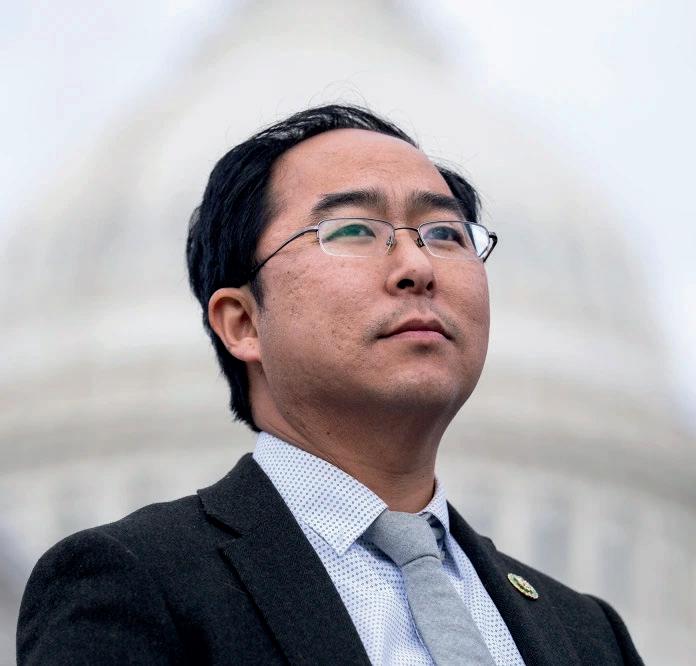
ANDY KIM (New Jersey & Magdalen 2005) has become New Jersey’s first Asian American Senator.
RICHARD FLANAGAN (Tasmania & Worcester 1984) has received the Baillie Gifford Prize for his book Question 7

MAX HAN KAI DING (Malaysia & St John’s 2024) has become the first South-East Asian to be named a Future Nobel Laureate scholar.
NANDINI DAS (India & University 1997) has been awarded an OBE in this year’s New Year Honours List.
JOHN LAZAR CBE (South Africa-at-Large & Balliol 1983) has received a Knighthood in this year’s New Year Honours List.
PRIYA AIYAR (Massachusetts & New College 1996) has been announced as Chief Legal Officer at Warner Bros. Discovery.
JAMES EDELMAN AC (Western Australia & Magdalen 1998) has been made a Companion of the Order of Australia (AC).
VICTORIA MIYANDAZI (Kenya & University 2013) has been listed as one of ‘10 African scholars to watch in 2025’ by The Africa Report.
MORATEGI KALE (South Africa-at-Large & Linacre 2018) has won the second Bloomsbury Academic Writing Fellowship with the submission titled ‘What Now?: Experiences of Everyday Unemployment among Black Graduates in South Africa’.
VIJAY RAMASAMY (Kansas & Green Templeton 2021) has been named as one of the Power 50: Most Influential Kansans.
DEVASHISH ‘DAVE’ BASNET (New York & Magdalen 2022) has been chosen for the John Robert Lewis Scholars & Fellows 2025-2026 Fellowship that furthers the work of the late civilrights hero, Congressman John R. Lewis.

ELIZABETH KISS (Virginia & Balliol 1983) has been named the 20th president of Union College
ADAM LEVINE (New Hampshire & Corpus Christi 2008) has been announced as member of the 2025 class of Henry Crown Fellows.
REMZI CEJ (Newfoundland & St Antony’s 2008) has received the King Charles III Coronation Medal in recognition of his lifetime of dedication to the people of Newfoundland and Canada.
A.E. DICK HOWARD (Virginia & Christ Church 1958) has received the 2025 Outstanding Virginian Award.
If you have a new appointment or award, please email: communications@rhodeshouse.ox.ac.uk
The Trust is very proud that we are in email contact with more than 96% of Rhodes Scholars, and we would very much like to reconnect with those who we have (digitally) lost touch. If anyone is in contact with any of the following and would be willing to forward a message from the Trust, we would be grateful if you could let us know via connect@rhodeshouse.ox.ac.uk
2010-2019
Shrinidhi Narasimhan (India & St Antony’s 2019)
Olivia Klevorn (Illinois & St Hilda’s 2017)
Paolo Singer (New York & Balliol 2014)
2000-2009
Ludger Evers (Germany & Balliol 2003)
Duce Gotora (Zimbabwe & Linacre 2001)
Mark Berman (Diocesan College, Rondebosch & Merton 2001)
Amohelang Motseta (Botswana & St Peter’s 2000)
Mohammad Sayeid-Al-Jamee (Bangladesh & Green 2000)
Linnet Mabuku-Chimbaza (Zambia & Oxford Brookes 2000)
1990-1999
Sonja Schwaneberg
(Germany & St Antony’s 1999)
Hamed Wardak (Virginia & Magdalen 1997)
John Sauer (Missouri & Oriel 1997)
Christian Lange (Germany & Wolfson 1997)
Brenton Brown (South African College School, Newlands & Brasenose 1996)
Rachel Hall (Alaska & Christ Church 1996)
Evan Fountain (New South Wales & New College 1996)
Carl Schultz (Paul Roos Gymnasium, Stellenbosch & St John’s 1996)
Afia Mufti (Pakistan & Oriel 1995)
Andrew Robertson (Australia-at-Large & University 1995)
Keith Mak (Hong Kong & University 1995)
Alexander Düring (Germany & Christ Church 1995)
Janine Josephs (Commonwealth Caribbean & Wolfson 1994)
Ian Sue Wing (Commonwealth Caribbean & Mansfield 1994)
David Ritacco (Nova Scotia & Wadham 1993)
Sid Mukherjee (India & Magdalen 1993)
John Unger (West Virginia & Hertford 1993)
Jonah Edelman (Washington & Balliol 1992)

Allswell Nyenke
(Nigeria & University of Leeds 1992)
Jerome Chiu (Hong Kong & Balliol 1991)
Chris Elwell (Virginia & Keble 1990)
1980-1989
Jacqueline Wong (Maritimes & St Catherine’s 1989)
Marama Findlay (New Zealand & Balliol 1989)
MaryAnn O’Hara (Colorado & Keble 1989)
Wen-Son Hsieh (Louisiana & Wadham 1988)
Peter-Brian Andersson (Natal & University 1988)
David Mehnert (Kansas & Lincoln 1987)
Shafiq Sit Abdullah (Malaysia & St John’s 1987)
Dorothy Wong Suk Chee (Hong Kong & University 1987)
Michael Lanese (Ohio & Worcester 1986)
Michael Willis (Ontario & Hertford 1986)
Peter Van Der Leeuw (Natal & Worcester 1986)
Jan Friedrich (Maritimes & Merton 1985)
Matthew Martin (South Carolina & Lady Margaret Hall 1985)
Michael Rosengren (Queensland & Wadham 1985)
William Gnam (Prairies & Balliol 1985)
Stephen Kinnaird (Connecticut & University 1985)
Peter Carstensen (Germany & Christ Church 1985)
Gina Pitts (Kansas & St John’s 1984)
Mark Martins (Maryland & Balliol 1983)
Arthur Tai (South Carolina & Corpus Christi 1983)
Josephine de Vos (Ontario & Merton 1982)
Kevin Anderson (Ohio & Christ Church 1981)
David Dodds (Indiana & Merton 1981)
Rajeev Kalaswad (India & St John’s 1980)
Jenny Coles (South Australia & Balliol 1980)
John Hughes (Zimbabwe & St Edmund Hall 1980)
1970-1979
Allen Tucker
(Newfoundland & Lady Margaret Hall 1979)
Karsten Von Kleist (Germany & St Antony’s 1979)
Nancy Davis (Rhodes Visiting Fellow & Somerville 1979)
Jacqueline Sheppard (Newfoundland & St Hilda’s 1977)
Gerrit Gong (Utah & Wadham 1977)
Rita Adiyodi (Rhodes Visiting Fellow & Somerville 1976)
Dan Davis (Arkansas & Exeter 1976)
Grant Gibbs (Ontario & Balliol 1976)

Craig Seligman (Louisiana & Christ Church 1975)
James LeMoyne (Idaho & Balliol 1975)
Eric Dahl (Washington & St Peter’s 1975)
Thomas Wohlfeil (Germany & Magdalen 1975)
Terence Burke (Newfoundland & Wadham 1974)
Claude Benedict (Sri Lanka & St Catherine’s 1974)
Heather Outred (Rhodes Visiting Fellow & St Anne’s 1973)
Shashi Arya (Rhodes Visiting Fellow & Somerville 1973)
Lip-Bun Tan (Malaysia & New College 1973)
Ian McLeod (Queensland & New College 1973)
Tariq Malik (Pakistan & St Edmund Hall 1973)
Wayne Doggett (Nova Scotia & Brasenose 1972)
Daniel Clodfelter (North Carolina & Corpus Christi 1972)
John Lee (New Zealand & Christ Church 1972)
Donald McKenzie (Alberta & Hertford 1972)
Pamela Dunbar (Rhodes Visiting Fellow & St Hilda’s 1971)
Roland Paver (Rhodesia & Pembroke 1971)
John Luik (Idaho & Hertford 1971)
Rudolph Smellie (Jamaica & Lincoln 1971)
Robert McKenzie (Saskatchewan & Hertford 1971)
Jean-Pierre Ouellet (Québec & Keble 1971)
Bob Adams (Manitoba & Trinity 1970)
Richard McConnel (New Zealand & Merton 1970)
1960-1969
Heng Tan (Malaysia & Wadham 1969)
John Higham (Pennsylvania & Balliol 1969)
Howard Von Kaenel (Oklahoma & Magdalen 1969)
Hikaru Kerns (Oregon & Magdalen 1969)
Zafar Rashid (Pakistan & St Peter’s 1969)
Paul Saba (Massachusetts & Balliol 1969)
John Mamo (Malta & Magdalen 1968)
Michael Orr (Malta & St John’s 1967)
Prabhat Patnaik (India & Balliol 1966)
Shahid Rahman (Pakistan & Exeter 1966)
Willem Theron (Paul Roos Gymnasium, Stellenbosch & Brasenose 1966)
Ram Chopra (India & Oriel 1965)
Keith Chiappa (Bermuda & Jesus 1965)
Javed Musharraf (Pakistan & Christ Church 1965)
Habiboola Niamatali (British Caribbean & St John’s 1965)
Pierre Pronovost (Québec & St John’s 1965)
Harsh Tankha (India & Christ Church 1963)


Ian McCloskey (New South Wales & Merton 1963)
Marcel Masse (Québec & Pembroke 1963)
George Peterson (Massachusetts & Balliol 1963)
Josiah Bunting (Virginia & Christ Church 1963)
Konrad van Huyssteen (Paul Roos Gymnasium, Stellenbosch & Brasenose 1963)
John Unrau (Alberta & Pembroke 1962)
Robert Baxter (Missouri & Trinity 1962)
James Draper (Diocesan College, Rondebosch & Lincoln 1962)
Roland Lines (Bermuda & Brasenose 1962)
John Sullivan (Massachusetts & Magdalen 1962)
Robert Kelly (Newfoundland & Pembroke 1962)
Michael Gordon (Washington & Hertford 1961)
Henry Wong (Jamaica & Wadham 1961)
Anthony Hawkins (Rhodesia & Corpus Christi 1960)
Grahame Lawrence (Rhodesia & Christ Church 1960)
1950-1959
Charles Sammut (Malta & Balliol 1958)
Peter Blaikie (Québec & St John’s 1958)
William Huff (Arkansas & Lincoln 1957)
David Baad (Michigan & St Peter’s 1957)
John Hardy (Queensland & Lincoln 1957)
Fred Myers (South Carolina & University 1956)
Russell McCormmach (Washington & Christ Church 1956)
Gordon Hartford (Eastern Province & New College 1955)
Rafiq Ahmad (Pakistan & Christ Church 1953)
Ken Reich (Wisconsin & Balliol 1953)
Jakob Smit (Paul Roos Gymnasium, Stellenbosch & Lincoln 1953)
John Martin (Natal & St John’s 1953)
Walter Coppedge (Mississippi & Oriel 1953)
David Gilbert (Bermuda & Brasenose 1952)
John Searle (Wisconsin & Christ Church 1952)
Hugh Templeton (New Zealand & Balliol 1952)
Han Spoel (Transvaal & Trinity 1951)
Saiyid Shafiq (Pakistan & Balliol 1951)
Andy Remson (Alabama & Balliol 1951)
George Mifsud (Malta & New College 1950)
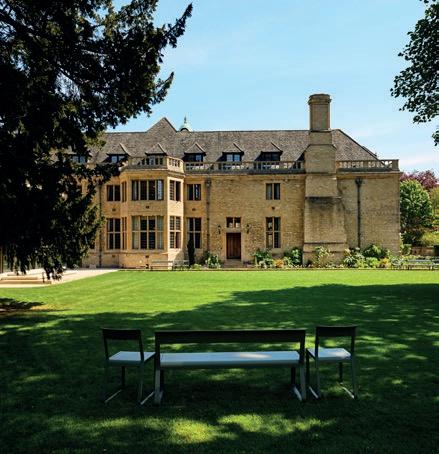
The Rhodes Scholar Class of 1975 celebrated their milestone 50th Anniversary Reunion from 7 to 9 March, both in person in Washington, DC and virtually. The weekend was filled with moments of warm connection, reconnection and lots of laughter. Here, we share the events enjoyed across those few days, together with attendees’ personal reflections on the last 50 years.
The reunion was organised by Class Leaders, Peter Carfagna (Ohio & University 1975), Chris Peisch (Vermont & Worcester 1975) and David Goldbloom (Nova Scotia & Exeter 1975). Twelve classmates and five partners made the trip to Washington, DC, first joining together at a Friday night Welcome Reception in the appropriately named Wild Days Lounge!
The anchor event of the weekend took place Saturday morning when nine additional 1975 classmates who could not make the trip to DC joined the group virtually. The class was especially grateful to John Matheson (New Zealand & Worcester 1975) for Zooming in during the wee hours of the morning in New Zealand. Interim Warden Sir Rick Trainor (Rhodes Island & Merton 1970) also joined virtually, making celebratory remarks plus offering a special tribute to classmate and former Rhodes Trustee, Mike McCaffery (Pennsylvania & Merton 1975), to whom the Rhodes Trust is deeply indebted for his leadership and guidance during a difficult time in the organisation’s history.
Led by Peter Carfagna, the group remembered classmates no longer with us, including:
Peter Kennewell (Queensland & Magdalen 1975), 24 October 1953 – 22 December 1980
Flint Schier (Minnesota & Corpus Christi 1975), 22 December 1953 – 28 May 1988
Clayton (Clay) Christensen (Utah & Queen’s 1975), 6 April 1952 – 3 January 2020
Andy Savitz (Maryland & New College 1975), 25 September 1953 – 29 January 2020
The remainder of the hybrid event comprised an intriguing conversation with leading experts from the class titled Living Through the Transformation of American Politics: What Does Your Crystal Ball Say Now?
Larry Sabato (Virginia & Queen’s 1975) shared opening comments on the state of play of American politics and addressed the future of United States/Canadian relationship. Dick Fallon (Maine & Wadham 1975) explained possible outcomes to the Supreme Court decisions regarding ‘Executive Privilege’ and Russell Feingold (Wisconsin & Magdalen 1975) discussed the current state of Congressional dysfunction. Joel Goldstein (Missouri & Brasenose 1975) addressed the role of the vice presidency in the current administration. The class is grateful to the Association of American Rhodes Scholars (AARS) for generously sponsoring the hybrid event.
Ken Brown (Colorado & Christ Church 1975) kindly arranged and sponsored a private luncheon for the class at Immigrant Food, to include a conversation with Cofounder, Peter Schechter, around his mission to celebrate global flavours brought to America by immigrants. The meal was followed by an entertaining tour of voiceactivated exhibitions at the Planet Word Museum with Founder, Ann Friedman. Ken Brown and Jake Jacobson (Ontario & Magdalen 1975) entertained the class (and other museum visitors!) with a round of karaoke!
The reunion coincided with the AARS and Rhodes Trust’s annual Welcome Home Weekend. This event convenes Scholars that have recently gone down from Oxford in Washington, DC before they launch their next journeys. The class of 1975 joined Scholars nearly 50 years younger for a lovely intergenerational reception. At a celebration dinner later that evening, Class Leaders led the class in a beautiful round of personal reflections about their time in Oxford as Rhodes Scholars, and this memory sharing continued through to a Farewell Brunch the following morning at the famous Old Ebbitt Grill, Washington’s oldest saloon. Here, the class surprised Chris Peisch with birthday song and cake!
A highlight of the weekend was the announcement
of an extraordinary donation of $100,000 from an anonymous 1975 classmate to the Rhodes Trust in support of the next generation of Rhodes Scholars. This generous gift was made in honour of the Rhodes class of 1975, and serves as a challenge for other classmates to consider giving back to the Scholarships during this meaningful anniversary year.
The class of 1975 sends its most sincere thanks to Rachel Wood and Jamie Byron Geller at the Rhodes Trust, without whom this long-awaited reunion could not have transpired so flawlessly, and whose extra effort throughout the weekend inspired all of us in the class of 1975 to get together again in the very near future.
You can watch the recording of the hybrid reunion event at: vimeo.com/rhodestrust/1975reunion
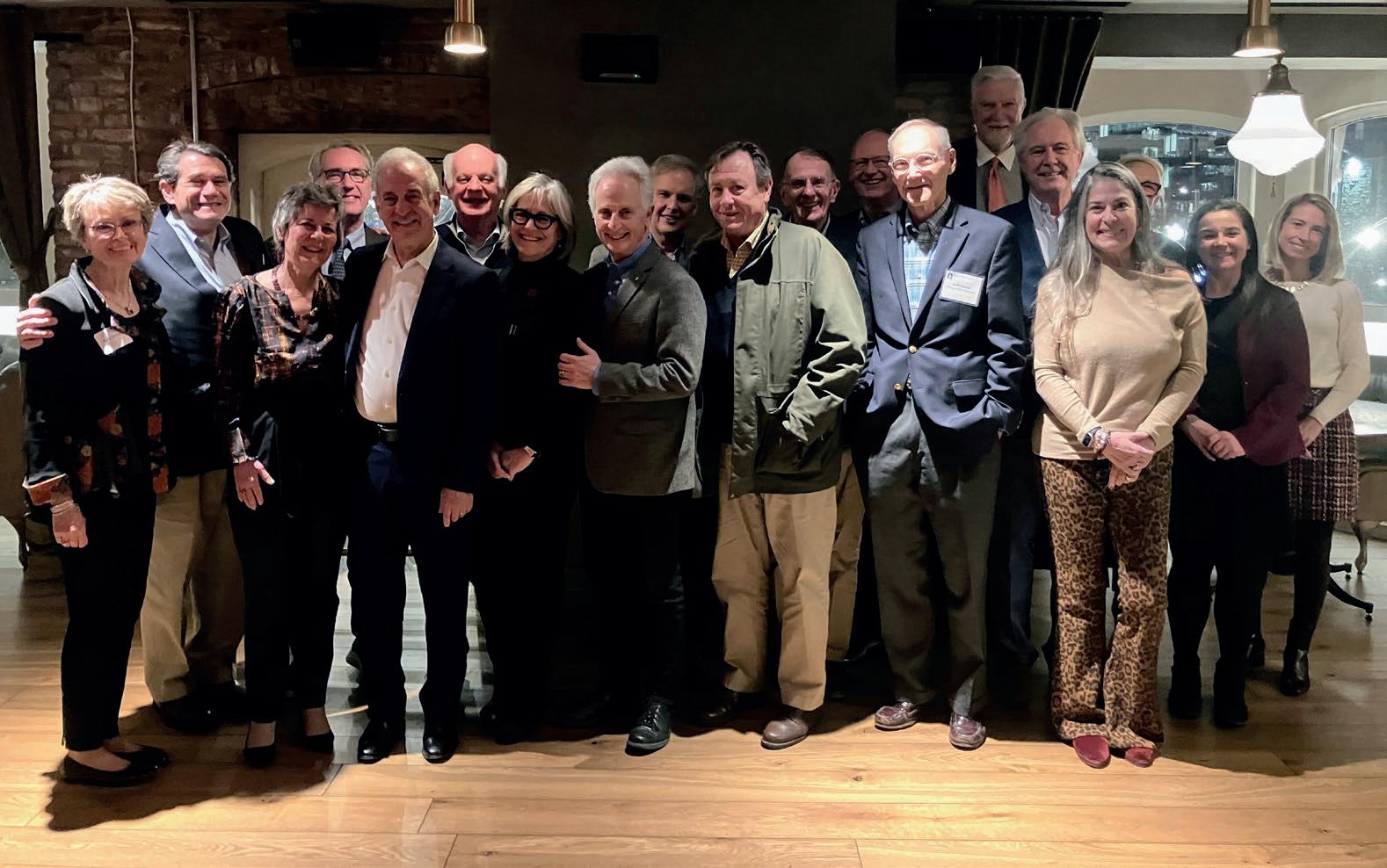
Ken Brown (Colorado & Christ Church 1975) 19751984: Returned to Colorado after Oxford and worked in energy technology applications, including the Solar Energy Research Institute (now NREL), Science Applications Intl and Price Waterhouse (Management Consulting Division). 1985-1991: Divorced and remarried; formed a family of four boys; moved to New York where I worked for Inspiration Resources (now Terra Industries) alongside Tom Barron. Took management assignments in Arizona, Colorado and California and left as Vice President for Corporate Development. 1992-1999: Joined GE as a GM of business development, became CEO of GE Mexico (moved to Mexico City), then named a Vice President of GE and President of GE Southeast Asia (moved to Bangkok and Singapore). 2000-2014: Named President of Skidmore, Owings & Merill LLP (based in New York); joined One Equity Partners (BankOne/ JPMorgan private equity) in 2002; divorced and remarried, adopted Elizabeth’s daughter, opened the Miami office of One Equity Partners in 2008; Hong Kong office in 2012 and retired as a Senior Partner in 2014. Funded water projects in Central America through AguaClara Cornell and immigrant assimilation agency Hispanic Unity of Florida. 2015-2025: With wife, Elizabeth, opened an art gallery and non-profit foundation; completed travel to over 100 countries; helped daughter establish an art gallery in Portugal, formed a small private equity fund in Florida (BlueKey Equity) and began writing collaborations with my photographer wife.
Peter Carfagna (Ohio & University 1975) First decade – married to my high school sweetheart Rita Murphy while at Oxford; moved back home with her to Cleveland to be close to our parents; I was breathlessly working at a big law firm as an associate/young partner, as we were beginning to raise our family of two!
Second decade – still breathlessly working at a big law firm as a senior partner, while raising our family of four! (Thank God for Rita!) Third decade – transitioning from my law firm (Jones Day) to General Counsel/Chief Legal Officer Role at the IMG Group of Companies – still trying to raise our four children ‘the right way’ in the company of their many family members who were still based in Cleveland, and trying to teach each of them how to grow ‘in wisdom and age….’ – but succeeding only occasionally because – ‘the older they got, and the more tired we got!’ Fourth decade – transitioning from the sale of IMG into a full-time Professor of Sports Law (at Case Western, HLS and UMiami Law)/investor in sports properties – primarily owning/operating a number of Minor League Baseball teams affiliated with many MLB Teams, including our hometown Indians/Guardians. Beginning to welcome the first of our grandchildren via our two eldest sons, and still trying to ‘keep up with’ our two youngest children. Fifth decade – welcoming many more grandchildren via our adult/married children –each of whom had moved away from Cleveland, OH –but each of whom then decided to move back home to ‘raise their families’, thank God. So, we now ‘celebrate’ all four adult children – and our ten grandchildren right here in our old hometown. And, even though we no longer own/operate any MiLB Teams, we now have our own ‘lineup’ of nine grandkids, plus a DH grandson who arrived last August.
John Coleman (Québec & St John’s 1975) 19781990: I completed my Ontario and Quebec law degrees (LLB/BCL) and joined the law firm OGILVY RENAULT in Montreal where I practised Labour and Employment law for some 25 years. My girlfriend and I married (still together 45 years later!) and have three wonderful children. We now are blessed to have four grandchildren. 1990-2010: In addition to the practice, I was appointed National Managing Partner of the firm. 2010-2017: I led the firm’s merger with the global UK-based law firm of Norton Rose and took on global responsibilities with the firm. 2017- present: I have been attempting retirement but was interrupted by my political appointment to the position of Agent-General for the Québec Government in London with responsibility for political, economic and cultural relations in UK, Ireland and the Nordic countries. I returned to Montreal at the outset of COVID-19 but in 2023 took on my current position as Senior Employment and Labour Counsel with Air Canada.
George C. Freeman III (Louisiana & Pembroke 1975) This summer, I’ll celebrate my 48th wedding anniversary with my wife, Allison, our two daughters, their spouses, and our six grandchildren. Allison spent six months with me in Oxford during the summer and fall of 1976. While there, she met Joel Goldstein, David Goldbloom, Chris Peisch and Bill Pierce – all of whom have remained our dear friends ever since. We’ve lived most of the time since Oxford in New Orleans. I’ve now practised law here for over 40 years, mainly preparing to try and trying securities cases around the country, following market collapses, and teaching securities law on the adjunct faculty at the Tulane Law School. I’m hoping and expecting this reunion to be as enjoyable as the Rhodes 120th Anniversary Reunion in Oxford, which I attended with Goldbloom and Peisch.
David Goldbloom (Nova Scotia & Exeter 1975) After a year-long honeymoon with Nancy in Oxford in 1976, we spent most of that first decade training in medicine and our specialties at McGill (psychiatry for me, ophthalmology for Nancy). The second decade (19851995) involved moving to Toronto from Montreal, welcoming the births of our sons Daniel and Will, and beginning our grown-up careers in our fields. The third decade (1995-2005) included my work evolution from clinician/teacher/researcher into hospital leadership and endless meetings. The fourth decade (2005-15) witnessed further career reinvention as a mental health advocate, chairing Canada’s Mental Health Commission, and writing my first book about a life in psychiatry – the beginnings of a summing up. The fifth decade (2015-25) involved shedding administrative roles and committee memberships, writing a second book about mental health innovation, and returning to first love in doing more clinical work; I also expanded my board engagements with the arts outside work, welcomed our two grandchildren, Wolf and Kensie, travelled more with Nancy, and the two of us retired from our careers and began imagining the next decade.
Joel K. Goldstein (Missouri & Brasenose 1975)
1975-85: I studied at Oxford (1975-78) where I had a wonderful experience, met treasured friends, and received my BPhil and DPhil in politics; returned to the United States; went to Harvard Law School where I reconnected with a college classmate, Maxine I. Lipeles, in 1978 and we married in 1980; graduated Harvard Law School; clerked for Judge W. Arthur Garrity, Jr.; had my first book on the American vice presidency published; moved to St. Louis to practise law with my father; and our daughter was born. 1985-95: Our son was born; we enjoyed parenting both wonderful children, learning lots from them; became involved in various non-profits; and after 12 years left law practice to teach constitutional law and other law school subjects; my father-in-law died.
1995-2005: Continuation of the same with an emphasis on our children; wrote scholarly works about the vice presidency, constitutional law and admiralty law; Maxine’s mother and my father died. 2005-15: Our children went off to college and grad school and began their careers; I increasingly reconnected with friends including special ones from Oxford years. My mother died. 2015-25: Published my second book on the vice presidency; retired from my teaching position; saw our children marry and have their children and our three grandchildren, and we moved east to our house in Wellfleet, MA to be closer to them; have enjoyed retirement with Maxine, our family and friends, have read more, especially literature and other subjects I had previously not given enough attention to, continue to write and lecture a bit, and have started really worrying about the future of the country and world.
Jake Jacobson (Ontario & Magdalen 1975) I returned from Oxford to continue service in the Navy: at sea, on the waterfront, and in air defence, underwater, and shipbuilding and conversion programmes, as well as with the Canadian Defence Liaison Staff in London. I retired in 1999 commanding our Pacific Naval Dockyard and then returned to the UK to work with Lockheed Martin on a maritime helicopter programmme for the Royal Navy. Back in Canada, I worked with Lockheed on naval and aerospace programmes and then ran naval programmes and advanced air and naval programmes for General Dynamics Canada before being asked to join the Canadian Department of National Defence at the Assistant Deputy Minister rank in 2007, as the #2 in defence procurement in support of Canada’s efforts in Afghanistan and the increase in defence procurement programmes from effectively one to about 40 major projects. I promised five years, retiring in 2012, and joining Babcock UK and Canada in 2013 to help build their marine, aviation, land and nuclear business in Canada. With two grandsons on the autism spectrum, I’ve supported my wife Suzanne (98% of the effort!) in the creation, first, of a charity targeting early identification and intervention – which has helped hundreds of families in the Eastern Ontario region – and more recently in the creation of an agency for Ontario which provides early years support to children with autism and their families.
Robert Liberty (Oregon & Magdalen 1975) My life since Oxford has been dominated by my work to reform patterns of urban and rural development, and conservation, beginning in Oregon and then extending to other parts of the US and other countries. I have pursued this work in many different roles; a nonprofit organisation staff attorney and director, a hearings officer, Congressional staff member, an elected official, director of university programmes, currently as an attorney and consultant in private practice and as a volunteer. It was not until I was 49 that I became a homeowner and found a life partner, who became my husband at age 65 and I was welcomed into his large first-generation emigrant family. I continue to work, to volunteer (currently serving on the Columbia River Gorge National Scenic Area Commission) and to share our love of the outdoors in the Northwest and places farther north with my husband. Sadly, what could have been the final and happiest years of my life are now overshadowed by the apparent collapse of our democratic republic and the destruction of the world’s wonderful web of life.
Chris Peisch (Vermont & Worcester 1975) 1975-84: graduate degrees in law and business immediately after Oxford; started career at White & Case in corporate law in September 1982; transferred from NYC to London office February 1984; joined Goldman Sachs London in February 1985. 1985-1994: married Astrid Munte September 1986 after meeting on a blind date organised by a B-School classmate; investment banking and private equity with Goldman Sachs and Morgan Stanley; transferred to Morgan Stanley Frankfurt office September 1991; left to found Frankfurt-based private equity firm 1994; three children joined Astrid and me – Virginia, Nicholas and Oliver – and dominated our lives with delight. 1995-2004: raised our children in a small hillside village outside of Frankfurt; because of their German mother they began education in local schools and for the most part stayed with it through high school graduation; I actively managed my young firm’s affairs, investing in small and medium-size companies in German-speaking parts of Europe. 2005-2014: our children finished secondary education in Germany and Britain and all three attended Dartmouth, resonating with their father; it was interesting to return on a regular basis to one’s college 30 years later; sorry, but I add that daughter Virginia was inducted into the Dartmouth sports hall-of-fame for field hockey – “it ain’t braggin’ if it’s true”. 2015-2024: Astrid and I moved to Cohasset, MA on the south shore of Boston in July 2015; I moved out of management of my PE firm and assumed a senior advisory role which involves regular back and forth to Frankfurt until my retirement last October; our granddaughter Carla was born in Berlin in Dec 2023.
Ford Runge (North Carolina & New College 1975) After graduate school at Wisconsin, taught and did research at University of Minnesota on international trade, biotechnology, climate, agricultural development and most recently neuroscience and economics and the economics of rare diseases.
Richard H. Fallon, Jr (Maine & Wadham 1975) 1975-1985: After Oxford, I attended Yale Law School, served as a law clerk to Supreme Court Justice Lewis Powell, got married and began teaching at Harvard Law School. 1985-95: On the professional front, I got tenure. On the personal front, my wife Jenny and I were deeply occupied with our then-small children Libby and Doug. 1995-2005: These were very fulfilling years both professionally and personally. After our children grew up and went off to college, I got to know a lot of their early-adult friends who took classes that I occasionally taught in the Harvard Government Department. 20052015: I continued to take satisfaction in my professional activities. Both of our children got married to very able and congenial spouses. 2015-2025: It has begun to feel like a new stage of life. Our two children have blessed us with seven grandchildren, four of whom live in the same town as we do and the other three of whom live only about a half-hour away. I am delighted to go on doing most (but not all) of what I have always done, but our children now outstrip Jenny and me in competence along embarrassingly many dimensions.
Paul Hunt (Michigan & University 1975) I married Marshall Scholar Kathy Clarke Hunt two weeks after my DPhil viva in 1978; we have a lovely daughter, Laurel. In addition to 1979-2021 faculty duties in theoretical chemistry with Kathy, and a long collaboration with the late Prof. John Ross at Stanford, I served Michigan State University as Vice Provost for Libraries, Computing, and Technology and then Senior Associate Vice President for Research & Innovation. Projects included MSU’s first integrated student information system (undertaken during a conversion from quarters to semesters, necessitating massive data conversion), PI on a USDoL Round 1 WIRED grant for regional economic development, conversion of a donated Pfizer pharma pilot plant in Holaland, MI to biotechnology research, and a decade of overseeing MSU export control and trade sanction compliance. I served until 2021 as a founding member on the board of the SOAR Telescope at Cerro Pachon, Chile, and on the MERIT Network board (including four years as chair) during its pre-competitive NSFNET contract period. Kathy and I are emeriti, now finishing chapters for a multi-author, dissipative structures book, following our annual family reunion at WDW earlier this year.
Desmond Mascarenhas (India & University 1975)
As a trained scientist and serial inventor/entrepreneur, I have spent the past 50 years answering the following questions by actual experimentation: (1) Why is decision-making power in human enterprises nearly always shaped like a pyramid (a fundamentally unegalitarian arrangement)? (2) Is decision-making power a proxy for all other kinds of social power? (3) Is social power a good that is owned or rented? (4) If rented, do we have the right to bequeath that power and whatever prosperity attends it? (5) How can I win prosperity/ power competitively without someone else losing i.e. is there such a thing as egalitarian winning? I have answered these questions to my own satisfaction with pragmatic evidence, but I have yet to share the resulting narrative, or the unique solutions crafted along the way. These data contain answers that may someday benefit humanity, so I guess I should try not to die before writing about them. Ah, so little time, and how fragile we all are!
John Matheson (New Zealand & Worcester 1975) In the 1980s I completed my Orthopaedic Surgery Fellowship and was appointed a consultant, I also got married to Patti, whom I met in London, and we had three children. In 1990s I consolidated my surgical practice and became active in national orthopaedic surgery teaching programmes. In 2000s I became an examiner in orthopaedic surgery in New Zealand and Australia, was President of the New Zealand Orthopaedic Surgery Association. Our elder daughter, Julia, completed her medical degree and was awarded a Rhodes Scholarship in 2008, attending Balliol where she completed a DPhil in investigating the genetics of bowel cancer. In the 2010s I continued my consultant orthopaedic surgery practice in public, private and university practice and retired from public practice in 2015. Daughters Julia and Emma both were married, Julia to an Australian Rhodes Scholar whom she met at Balliol. They live in Melbourne, where she is a breast surgeon, and have two daughters. I decided to retire during the COVID-19 lockdown in 2019, although I still teach undergraduates and postgraduates at Otago University Medical School. In the 2020s my time is largely spent gardening, playing golf, doing voluntary community work and travelling to look after four grandchildren in New Zealand and Melbourne.
Bill Pease (Connecticut & New College 1975) 19751985: Following Oxford, I stayed in Europe to immerse myself in political organising, ultimately returning to the US to work for several community-based organisations advocating for low-income families by working on voter registration, health care, affordable housing and other social issues. 1985-1995: Changing my focus to environmental issues, I got a MS and PhD from UC Berkeley School of Public Health and began teaching chemical risk assessment and management at Berkeley. 1995-2005: Switching from academics back to activism, I joined Environmental Defense Fund, and built scorecard.org, a database-backed website that made it easy for citizens to find actionable information about pollution in their communities. 2005-2015: Discovering an entrepreneurial streak I did not know I had, I founded a successful software-as-a-service company that provided online advocacy and fundraising tools to NGOs like the AFL-CIO, Planned Parenthood, NPR and Oxfam, merged with a competitor and went public. 2015-2025: Joined a second venture-backed software company that developed a consumer app to help shoppers find products that met their environmental and social preferences and then sold that company to UL Solutions, where I continue to work as their Chief Scientist for Sustainable Supply Chains, focused on helping retailers like Walmart and Target select and promote more sustainable products to their customers.
Bill Pierce (South Africa-at-Large & Pembroke 1975) I have been running companies as MD, lecturing part-time and more recently qualified as a business coach and been coaching senior managers – still doing this! Also, got married (am still!) and had two wonderful children (first a girl then a boy) who are now married and settled in the UK and have one grandchild! Otherwise, spend time playing bowls and bridge with friends, having lunches/teas etc with them and reading!

H. Kenneth Fisher MD (Minnesota & Queen’s 1955)
Returning to Los Angeles after an absence of six years, my two primary goals were to reset my personal life following a divorce, and to re-establish a medical practice. How? Even hesitant 82-year-olds can seek love via the internet, and when Judith and I met, the signs lit up saying ‘Bingo!’ They still say that. My plan to open a sleep medicine clinic proved unworkable, but I met the developer of several clinics who needed help. Serving the Medicaid population, each provided treatment for recovering addicts, and (separately) for general medical care. I joined him for six years. A third goal came to fruition in 2025 with publication of my first book, Sleep: A User’s Guide
Daud Ilyas (Pakistan & St Peter’s 1955) I am practising as a barrister from chambers in London, specialising in international and constitutional law. Previously, for many years, I served as legal adviser to several multilateral financial institutions including the European Bank for Reconstruction and Development (EBRD) and the Asian Development Bank (ADB). Most recently, I drafted founding documents for the Asian Infrastructure Investment Bank (AIIB) and I have also assisted with the formal establishment of several other international entities.
Rex Jamison (Iowa & Merton 1955) Professor of Medicine, Emeritus, Stanford University. I am a University of Iowa graduate and had a career-defining experience at Merton with a great tutor and a rich circle of friends. In 1971, I co-founded Stanford Medicine’s Nephrology Division, which has flourished. My research examined how the kidney regulates water and electrolyte balance. I was acting chair of medicine at Stanford, chair at the University of Rochester, and then resumed research at Stanford. My wife, Dede, is a retired Episcopal Deacon. One son is a surgeon and president of Portland’s Oregon Clinic; the other son is finance director of a digital sales group. Two granddaughters are in college; my grandson, after completing army basic training, accepted an invitation to try for the rangers.
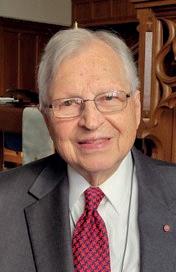
John H. Morrison OBE (hon) (New Mexico & University 1955) I am the 1955 global class leader and US class secretary, tasks I cherish for the privilege of maintaining contact with my classmates. I served on Rhodes selection committees for 32 years and am president emeritus of the Association of American Rhodes Scholars. In 1998 I was appointed Distinguished Friend of Oxford. In 2015 I was honoured in the first group of George Parkin Service Awardees. I was the oldest Scholar at the 120th reunion in Oxford. At home in Evanston, Illinois, I enjoy the routine of retirement from the practice of law. Barbara and I welcome visits from our three professional daughters and seven grandchildren.
John Gearen (Indiana & Merton 1965) The 1965 class has held class reunions beginning soon after our return from Oxford. At an early reunion, a classmate challenged us to fight rather than fund the world’s fight. We have tried to do that and have encouraged each other’s efforts. Our reunions have become more frequent, now two years apart. Most of those still in good health have continued to join. The highlight is always a Saturday night rock ‘n’ roll party with Tim Londergan (Delaware & Merton 1965) as master of ceremonies. Everyone dances. The waitstaff is amused. The most recent reunion, held on the Queen Mary the weekend after the November election, helped all of us to grieve and plan together.
Douglas McCalla (Alberta & Oriel 1965) I taught Canadian history at Trent University from 1968 to 2001. My subsequent move to the University of Guelph as Canada Research Chair in Rural History reflected the increasingly rural focus of my research on the economic history of Britain’s remaining North American colonies after 1783. I also contributed the chapter on Canada and Newfoundland in Anthony Kenny’s History of the Rhodes Trust (2001). Since my retirement in 2010, my writings have included a survey of my career commissioned by the Canadian Historical Review (2016: 244-71), a book (Consumers in the Bush: Shopping in Rural Upper Canada [2015]), and expert witness reports for three major legal cases. My wife Anna (Skorski) McCalla and I celebrate our 55th wedding anniversary in 2025.
Merle McClung (Minnesota & Trinity 1965) My autobiography, titled A Rhodes Retrospective: Consolidated Edition ( ARRCE ) was published by Amazon in May 2024. I extend my story in my new book, Seductive Power & Authoritarianism (SP&A), to be published about 30 May 2025. SP&A includes ‘Merle S. McClung’s 150 Favorite Songs’ and ‘Merle S. McClung As He Sees Himself’. I see myself as a Synthest and my next book, titled Light Works, to be published in May 2026, will be a compilation of my poetry. My back pain, aggravated by two failed spinal surgeries, is mitigated when I focus on writing, so I continue to write.
William McGrew (Oklahoma & Merton 1965) I retired as Professor of Evolutionary Primatology at the University of Cambridge in 2016. I returned to Scotland, to take up an Honorary Professorship in Psychology & Neuroscience at the University of St Andrews in 2017. There I continue to write up the results of 40 years (1972-2012) of research on wild chimpanzees in various countries across Africa, from Tanzania to Senegal. My ninth book, a memoir, is Chasing after Chimpanzees: The Making of a Primatologist (2021), available on Amazon. All proceeds from it go to four sanctuaries for chimpanzees, three of which are in Africa. It is written in the form of vignettes, the writing of which has become habitual, and thus useful to prompt fading memories in old age!
Aftab Seth (India & Christ Church 1965) I spent over three decades in the Indian Foreign Service which took me to a number of countries, including Germany, Egypt, Indonesia and Pakistan and, as ambassador, to Greece, Vietnam and Japan. After retirement as a diplomat, I started work in education, spending six years as a professor at Japanese University KEIO, the oldest in Japan, and lecturing at universities in India, Thailand, Vietnam, Russia, the UK, Morocco, Spain, Sri Lanka, Korea, Philippines and the US. I have been Chairman of the Global Indian International Schools for the last 20 years and am President of the Global Schools Foundation and a Trustee of the John Martyn School in Dehra Dun. Books published include: Pillars of a Landscape; If an Elephant Loses Weight, It is Still an Elephant ; and my autobiography, A Diplomat’s Garden
Paul Tichauer (Qu é bec & Queen’s 1965) I am an Executive Coach and International Commercial Arbitrator. Following degrees in Metallurgical Engineering at McGill University and PPE at Queen’s, I completed a PhD in Extractive Metallurgy at MIT and a night-school MBA at Pace University. Starting as a Research Metallurgist in 1971, I built a 40-year career, primarily as CEO or COO of a number of industrial companies in Canada, the USA and Europe. For the last 13 years, I have been an Executive Coach and a Commercial Arbitrator – roles which offer more flexible schedules and where a few grey hairs are an asset! In 2022, I received the Chartered Institute of Arbitrators Canada Branch award for Distinguished Service in Canadian Arbitration. I also resumed cello lessons that year after a 55-year hiatus and now play with the Scarborough Philharmonic Orchestra. There are times I seriously wonder why an 80-year-old would ever think he could simply pick up the instrument exactly where he left off when he was 25...!
Paul Tipping (New Zealand & St John’s 1965) I retired 20 years ago and live in Wellington, New Zealand. My career was spent entirely in the New Zealand Ministry of Foreign Affairs. It included four overseas postings as Ambassador (mostly in Spanish-speaking countries) and a spell doing security coordination in the Prime Minister’s Department. Currently, I find that writing provides a suitable outlet for my creative side, my church a suitable outlet for my spiritual side, and the Rotary Club a suitable outlet for my altruistic side. History and international affairs remain among my interests. I was for many years Secretary of the New Zealand Rhodes Scholars Association.
Mark Abley (Saskatchewan & St John’s 1975) I have written many books of nonfiction and poetry. The most recent are The Organist: Fugues, Fatherhood, and a Fragile Mind (2019), Strange Bewildering Time: Istanbul to Kathmandu in the Last Year of the Hippie Trail (2023), and a revised, updated edition of Conversations with a Dead Man: Indigenous Rights and the Legacy of Duncan Campbell Scott (2024). In 2023 I was awarded an honorary DLitt by the University of Saskatchewan. Last year my wife Ann Beer and I moved from Montreal, where we had lived for 41 years, to the charming small town of Gananoque, Ontario. In the War of 1812, Gananoque was known for resisting US invaders keen to annex Canada.
Evance Rabban Kalula (Zambia & Balliol 1975) I am Chairperson of the ILO Committee on Freedom of Association (CFA). I am the first African privileged to serve in the position. I am also Emeritus Professor of Law at the University of Cape Town. I have written extensively in the areas of labour law, international trade and regional integration, as well as social protection. I have served in various capacities, including as Chair of the former South African Employment Conditions Commission (ECC), Chair of the Council of the University of Lusaka (UNILUS) and Director of the Confucius Institute at the University of Cape Town. I am a recipient of awards including the Lifetime Achievement for Academic and Professional Excellence of the International Labour and Employment Relations Association (ILERA), and am a lifetime member of the South African International Education Association (lEASA) and Labour and Employment Relations Association of South Africa (LERASA). In 2012, I underwent a heart transplant. The experience led me to become an advocate for the Organ Donor Foundation and to be part of educational programmes at schools.
Bill Pierce (South Africa-at-Large & Pembroke 1975) I do some business coaching and lecturing work but since 2023 spend most of my time with friends playing bowls and bridge! I ‘retired’ after a career consisting of working for a Business Consulting firm, doing an MBA and running several different engineering businesses as Managing Director. I then qualified as a Business Coach and have now had over a decade of business coaching (for a number of Coaching firms). With children who have moved to the UK, chunks of time are spent travelling. Most of my time is now spent with family, friends and our local community staying healthy, involved and still learning!
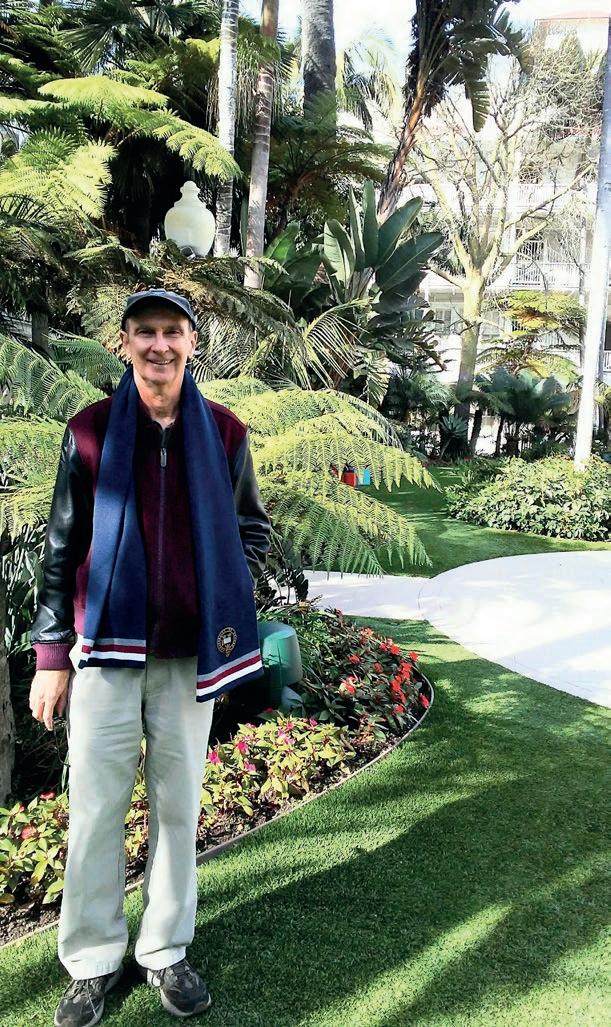
Roger Sorrell (Kansas & Corpus Christi 1975) I live in Honolulu with my husband, David Frost. My book, St. Francis of Assisi and Nature, was published by OUP in 1988. I continue my passion for nature and the environment by doing volunteer work at a laboratory which helps save endangered Hawaiian plant species from extinction. I also continue exhibiting my watercolour plant portraits of native and tropical flowers. David and I recently returned from an extensive environmental tour of New Zealand. At the age of 70, I muse about the connection now between myself and that young man who went to Oxford 50 years ago, and what the life milestones are now for a gay man without a job or children/grandchildren. I suppose that my deep commitment to my chosen family, and my sense of purpose, continue to instill me with a sense of excitement and satisfaction in life without the life markers others may have.

Laurence Wright (Rhodesia & Lincoln 1975) I am an Extraordinary Professor at North-West University, South Africa. Formerly H.A. Molteno Professor of English and Director of the Institute for the Study of English in Africa (ISEA) at Rhodes University, I am also a Commonwealth Scholar, a member of the South African Academy of Science, a Rotary Paul Harris Fellow and Honorary Life President of the Shakespeare Society of Southern Africa. The ISEA researched adult literacy, industrial education, in-service education for rural English teachers, language policy and textbook design. In retirement, I have returned to literary research, publishing on Sol Plaatje, V.S. Naipaul, Edgar Allan Poe, Lucky Sibiya, R.L. Peteni, Guy Butler, J.M. Coetzee, Tom Sharpe, Somerset Maugham and Shakespeare. Forthcoming scholarly editions include Wulf Sachs’s novel, African Tragedy, and a previously unknown play, Black Hamlet, by the Hollywood tough guy, John Bright (CSP, 2025).
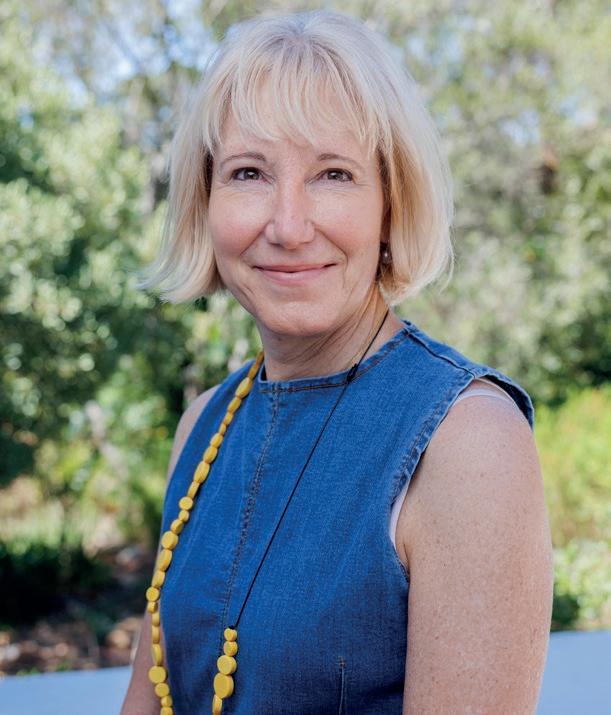
Elleke Boehmer (South Africa-at-Large & St John’s 1985) I am Professor of World Literature in English at the University of Oxford, and Executive Director of the Oxford Centre for Life-Writing, Wolfson College. I am a Fellow of the Royal Society of Literature and the Royal Historical Society. I am an Honorary Fellow of St John’s College, and an Extraordinary Professor in English at the University of Pretoria. I am a member of the Dutch Society of Letters and a Rhodes Trustee (2016-). I am the award-winning author of eight works of fiction, seven academic monographs, and numerous (too many!) edited works. Titles include: Indian Arrivals (biennial ESSE prize-winner 2015-16); Nelson Mandela (2008, 2023); Stories of Women (2005); the field-defining Migrant Metaphors (1995, 2005); The Shouting in the Dark (Olive Schreiner Prize-winner 2018), and Ice Shock (2025). My work is widely translated. I am an enthused advocate for the humanities, especially for storytelling practices in all realms of life.
Richard Major (New Zealand & Magdalen 1985) My family and I are finishing a brief stint in Baltimore, after three years in Palestine; for the next year I’ll be dividing my time between a State Department residence in Djibouti and a cottage in Oxfordshire. We’ll settle permanently to England in early 2027. My latest novel, Piracies, appears in July.
Andy Nussbaum (Illinois & Merton 1985) I am Co-Chair of the Executive Committee and a corporate partner at the law firm of Wachtell, Lipton, Rosen & Katz. For those in need of amusement, try leading a law firm of, well, lawyers… I just finished a six-year term as Chair of the Amherst College Board of Trustees, and 14 years as a trustee. During my tenure, Amherst went through two presidential searches, and, along with the rest of higher education, had its share of challenges, both global and domestic, to ‘keep things interesting’. Amherst remains a liberal arts gem, true to its mission, an inspiration. I am proud of my 37-year tenure as Rhodes Class of 1985 Secretary – but wonder when the coup will come.

Edward Roelofse (Paul Roos Gymnasium, Stellenbosch & Queen’s 1985) I will retire as director and manager at Imibala Orchards (Pty) Ltd and Tradouw Highlands (Pty) Ltd by the end of May 2025. I was a founder shareholder of Imibala Orchards, a black empowerment company specialising in the production and packing of stone fruit and citrus for the export market. My company also owned a table olive company as well as a factory that produced vegetable crisps from sweet potatoes, carrots, beetroots and butternuts. I am looking forward to brushing up my Spanish, travelling, reading, getting fit again and spending some time at Aitsa Kids, an NGO specialising in education and after school care for underprivileged children near Stellenbosch, South Africa.

Susan M. Scott (Rhodes Visiting Fellow & Somerville 1985) I am Distinguished Professor of Theoretical Physics at The Australian National University. I run an active research programme in general relativity theory, cosmology and gravitational wave science. My group were part of the international team that achieved the first direct detection of gravitational waves in 2015 – gravitational waves had been predicted by Einstein 100 years earlier! I have received numerous research awards including the Australian Prime Minister’s Prize for Science, the Blaise Pascal Medal in Physics and the Dirac Medal for Theoretical Physics. I am a passionate advocate for increasing the participation of women in STEMM disciplines, and a key member of the EinsteinFirst programme which aims to teach the fundamentals of modern physics to primary and secondary school students.
Naomi Wolf (Connecticut & New College 1985) I received my DPhil in 2015 from Oxford, after a second course of study in the English Faculty 30 years after my first. My thesis was on the first British gay rights advocate, poet and critic John Addington Symonds. I have also published nine bestselling nonfiction books, and am now the cofounder and CEO of DailyClout.io, a civic tech company that makes it easier for anyone to find, understand and socially share US State and Federal legislation. I hope to create similar platforms for the world’s 132 democracies, all of whom lack easy, intuitive access to legislation that is available to any user. I was cancelled in 2021 for accurately warning about dangers to women’s reproductive health from the MRNA injection, and am evidently being un-cancelled currently.

Tanya Aplin (Western Australia & Magdalen 1995) I am a Professor of Intellectual Property Law at the Dickson Poon School of Law, King’s College London. I am also a Global Distinguished Professor at Notre Dame Law School and a Door Tenant at Three New Square, Lincoln’s Inn, London. My teaching and research interests include copyright law and technological disruption, the interface between patents and trade secrets in relation to medical innovation and IP issues of the data economy. I have published widely, including leading textbooks, treatises and monographs. My most recent book is Global Mandatory Fair Use: The Nature and Scope of the Right to Quote Copyright Works (CUP 2020). I have lived in London for over 20 years and thrive on its cultural plurality.

Elizabeth Leane (South Australia & Magdalen 1995) I am Professor of Antarctic Studies at the University of Tasmania in Hobart, Australia, where I live with my husband Damian and two teenage children, Zac and Tessa. My work looks at human experiences of and responses to Antarctica, with a particular focus at the moment on the tourism industry. I have authored or co-authored four books, including South Pole: Nature and Culture, and co-edited four collections. I have been lucky enough to travel to Antarctica multiple times, with the Australian, New Zealand and Chilean national programmes, and with tour operators. I am currently a Deputy National Secretary for the Rhodes Scholarship in Australia and am constantly amazed and inspired by the young people I see in the selection process.
Carol McQueen (Québec & Balliol 1995) I am Director General for Settlement and Integration Policy at Canada’s Department of Immigration, Refugees and Citizenship, where I ensure that immigrants succeed economically and socially in Canada. Prior to joining this Department, I enjoyed a 17-year career as a diplomat for Canada, culminating in two posts as Ambassador, to Tunisia from 2015 to 2019 and to Burkina Faso from 2019 to 2021. I launched my career after Oxford as a Political Officer in the UN Peacekeeping Mission in the Democratic Republic of Congo from 2003 to 2005. My book Humanitarian Intervention and Safety Zones: Iraq, Bosnia and Rwanda was published by Palgrave Macmillan in 2006. I am married with two children, and engage in many local volunteer activities to make my community a better place.

Sumit Sen (India & London School of Economics 1995)
I am a barrister and Canadian immigration lawyer. I am the Managing Partner of SEN LAW, a specialised immigration law firm with a global footprint. I am an adjunct Professor of Law and serve as a member of the selection committee of the Global Rhodes Scholarships. I serve as a member of the board of the Canadian Stimulus Group. I was the lead immigration lawyer, representing pro-bono victims of an admissions fraud which plagued international students in Canada. During this time, I was widely interviewed by the Canadian Broadcasting Corporation (CBC) and featured in the Toronto Star. I was widely interviewed by the Indian media – The Statesman, The Hindustan Times, The Indian Express, ABP News. I was recognised as one of the global ‘Leaders of Law’ and was awarded the Global Award ‘Immigration Law Expert of the Year’ by Global Law Experts.
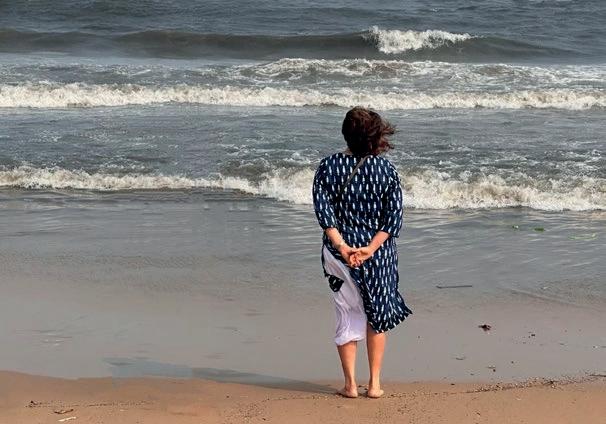
Roopa Unnikrishnan (India & Balliol 1995) I am the Chief Strategy and Innovation Officer at IDEX corporation, with a focus on executing the transformative strategy I helped design for the company. I helped acquire six companies using two billion dollars in capital, adding to the top line and growth rate of the company. My literary novel is with my editor, and I am looking forward to updating the community with details in the coming year. My twins are finishing up their undergrad years, with my daughter working on climate justice policy, and my son melding his passion for Mandarin, strategy and travel into new horizons. My husband’s digital consulting firm, Digimentors, continues to work with transnational and large NGO clients to demystify AI and media for good.
Ted Alexander (Tasmania & St Antony’s 2005) I am up to four children, a happy little family with Mira Comara (St Antony’s 2006) in Sydney. I recently rejoined the corporate world after a few years juggling a startup and child-farming and am managing Platinum’s International Fund.
Nick Anthis (Texas & Lincoln 2005) I am the Senior Program Officer for Special Initiatives at the University of California Office of the President, where I manage research grant funding for the state of California, including climate action research focused on the state’s communities most vulnerable to climate change and research to prevent cancer in firefighters. I previously managed academic partnerships for a biotech startup and served as a science policy fellow at the U.S. Agency for International Development after completing a postdoctoral fellowship in biophysics at the National Institutes of Health. I live with my partner, Katie, and my two-year-old daughter, Chloe, in Novato, California, where I enjoy music, the outdoors and exploring the other great things that the San Francisco Bay Area has to offer.
Joelle Abra Faulkner (Ontario & Wadham 2005) I started a company called Area One Farms. In that business, I raise and invest equity in the expansion of Canadian farms. I am enjoying working with farmers, the annual feedback on how it is going in the form of profit and loss, and the lack of control that comes both with the commodity markets and the weather, which is quite freeing. My husband and I have two little girls who are great fun for us, and I’m feeling lucky for life to feel like it’s working out well at the moment.
Ian Desai (Illinois & Merton 2005) I continue to wonder if the Rhodes Scholarship does more harm than good in the world. What if we ditched our elite posture and embraced a real resource acknowledgement: ‘The Rhodes Trust exists because of imperial extraction, oppression, and violence. Stolen land, stolen labour, stolen money, stolen lives: we are entangled in fraught legacy which we acknowledge and must redress.’ Or maybe the secret handshake should include a Swiftian catchphrase: ‘It’s us, hi, we’re the problem.’ Middle age is full of such noble musings, along with a not-mutuallyexclusive bid to return to the best things about Oxford life: friendship, libraries, art, garden-to-table cooking, and debating the comma with JanaLee Cherneski (Saskatchewan & Wolfson 2004). If you’re interested in fighting the world’s fight – see above – please come over for dinner.
Joe Jewell (Michigan & Keble 2005) I am John Bogdanoff Associate Professor of Aeronautics and Astronautics at Purdue University, where I direct two different hypersonic wind tunnel research groups (called BAM6QT and HYPULSE) with a total of 23 graduate students to keep mentoring. I do mostly defence-related work in high-speed aerodynamics but also have projects with NASA related to spacecraft re-entry physics. Katie and I enjoyed taking our three boys (Richard, Theodore and Elliott) to England for the first time for the Rhodes Reunion in summer 2023, and enjoy a near-annual visit to the Boat Race Dinner in Chicago to get a flavour of Oxford more locally. According to my course reviews, I am very funny (compared to other engineering professors, at least!).
Clare Lobb (Zimbabwe & St Edmund Hall 2005) I am Head of Performance Support with the UK Sports Institute and Pentathlon GB based in Bath. After three Olympic cycles working as a physiologist and technical lead across several Olympic sports, primarily impacting on Aquatics GB’s success in Rio and Tokyo, an interest in sports integrity and governance led to the completion of an LLM in Sports Law. I completed two terms on the Board of British Waterski & Wakeboard as Senior Independent Director responsible for Equality and Diversity (a significant challenge in a white middle-class sport) and am an INED with England Ice Hockey. I am grateful for support and holidays with friends from my Rhodes year and regularly visit Zimbabwe where my parents live.
Justin Mutter (Tennessee & Balliol 2005) I am associate professor of geriatric medicine at the University of Virginia (UVA). At UVA, I serve as the director of the Section of Geriatrics, and also direct education in the health humanities for the Center for Health Humanities and Ethics. My clinical, educational and scholarly work focuses on dementia care, primary care, theories of clinical judgment, and ageing and society. Aside from my work at UVA, I am also Chief Health Officer for Alula, an innovative technology platform for coordinating and optimising eldercare.
Beth Pearson (Iowa & Somerville 2005) I am marking nearly a decade of working for Senator Elizabeth Warren in her Washington, DC office and became her chief of staff in November 2023. My husband Tarek and I have two little girls, Iris and Opal, and enjoy living in the Capitol Hill neighbourhood. I also serve as an Assistant American Secretary of the Rhodes Trust.
Dominique Pitot (South-Africa-at-Large & Keble 2005) I am Chief Client Officer at Axis Data, an US-based AI consultancy. I recently moved to Texas after a decade of building a data and analytics business in South Africa. I continue to foster opportunities between the two countries, helping South African entrepreneurs to enter the US market.
Simon Quinn (Queensland & Keble 2005) I am an Associate Professor in the Department of Economics and Public Policy at the Imperial College Business School. I continue to do applied research on issues of firms and labour markets in urban low-income settings (including, for example, research on microfinance in Pakistan and job search in Ethiopia). I live in Oxford with my wife (Irem) and two daughters (Mira and Ela).
Atishi Singh (India & Magdalen 2005) I became only the third woman Chief Minister of India’s national capital region, Delhi, in September 2024, having held multiple key cabinet portfolios like finance, power and education previously. A member of the Aam Aadmi Party since 2013, I have been a member of the Delhi legislative assembly since 2020. Deeply interested in public welfare, especially education, I was closely associated with a widely heralded transformative education programme started in 2018 by the Aam Aadmi Party government for Delhi’s state schools, its highlight being an acclaimed ‘happiness curriculum’. With increased outlay and diverse outreach, this education model has seen a radical impact in student inclusion, experience and results. I am currently (2025-) serving as a Leader of Opposition in the Delhi Legislative Assembly.
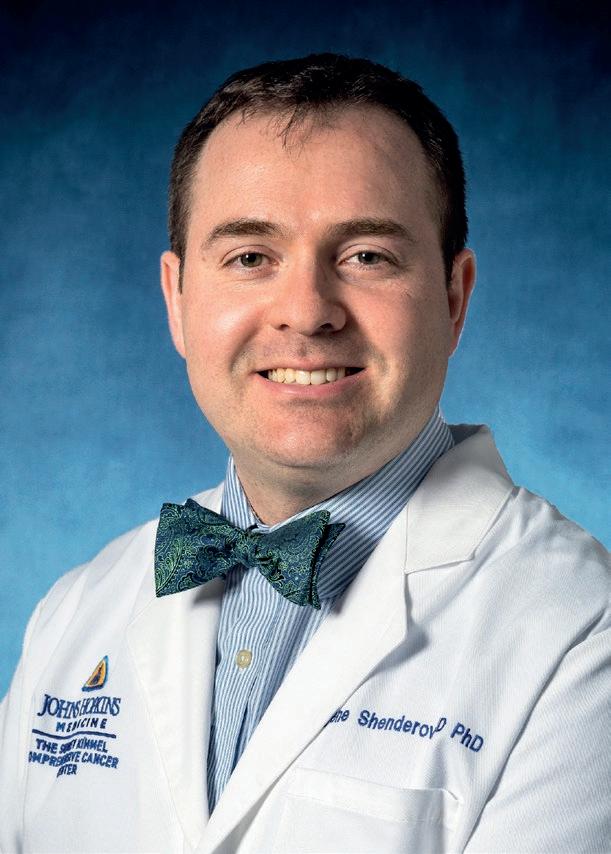
Eugene Shenderov (New York & Magdalen 2005) I am associate professor of oncology and cancer research immunology at The Johns Hopkins School of Medicine in Baltimore, Maryland, USA. I am privileged to wear both my MD and PhD hats daily. Clinically, I co-direct the Hopkins Prostate Cancer Multidisciplinary Clinic and run clinical trials, while on the research side leading an experimental wet lab and computational dry lab as Director of The Spatial Cancer Research Immunobiology & Therapeutics (SCRIPT) Laboratory. Recently, the laboratory has published on a promising new immunotherapy strategy for prostate cancer. I live with my wife, Maryana Shenderov, who is an infectious disease physician at Johns Hopkins Hospital, and our three children ages twelve, nine and four.

Hannah Tonkin (South Australia & Balliol 2005) After leaving Oxford in 2009, I spent almost 12 years working as an international lawyer for the United Nations in various locations around the world including Rwanda, Sierra Leone, Gaza, Ukraine and the former Yugoslavia. I eventually moved back to Australia mid-pandemic in 2021, had two children and started a new role as the New South Wales Women’s Safety Commissioner based in Sydney. In this role I provide leadership across the government and community to strengthen responses to domestic, family and sexual violence, with a particular focus on supporting women. While I sometimes miss my UN work and expat life, I am passionate about my current role and I love living in Sydney with my partner Greg and our two young sons.

Bogdan Knezevic (Prairies & Trinity 2015) I am co-founder and CEO of Kaleidoscope Bio, a tech company building infrastructure to accelerate biotech R&D. The team and I at Kaleidoscope are passionate believers that biotech, which drives the world’s most pressing innovations for the advancement of human and planetary health, should be powered by world-class software. When not nerding out about science-meetstechnology, I am finding other ways to test my sanity, such as hiking the Great Divide Trail (a 600-mile hike through the Rocky Mountains) or running marathons (my first was NYC 2024).
David Moore (Michigan & St Hilda’s 2015) I am a Product Design Lead at Google, where I contribute to the Pixel product line through material, process and design innovations with a focus in sustainability. In October 2024, my wife Erin and I welcomed our daughter, Cam, into our family. We are enjoying introducing Cam to family and friends, including many from our Rhodes class.
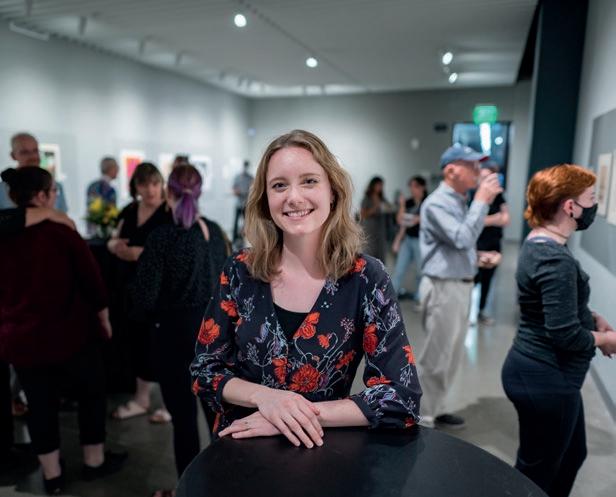
Rachel Skokowski (California & University 2015) I am Director of Galleries and Curator of the Janet Turner Print Museum at California State University, Chico. My research and curatorial work explores the intersections of historic and contemporary printmaking. My first book, The Goncourt Brothers and the Language of Etching: Prints, Process, Prose, is forthcoming with Oxford University Press. My husband Edward Stace (New Zealand & Balliol 2013) and I have embraced life in far Northern California and enjoy exploring our local trails and taking Rhodes friends to visit Sasquatch at the Sierra Nevada brewery.
Bernard Soubry (Hertford & Maritimes 2015) I moved back to Montréal during the pandemic, even though secretly I prefer the countryside. I have been working on climate policy – first at a think tank, then as a consultant – but it’s hard to find good managers and contractor work is stressful. If I’m honest, I don’t know what to do next, and I feel that being an adult is very hard these days. I’m doing a lot of therapy to learn how to stop making my work the only benchmark of my worthiness for love. It’s helping, but is also very hard. I picked up the wooden flute during the pandemic and now find great joy in playing traditional music for dancing with friends. I’d love to hear from you.
Ann Colbourne (Newfoundland & Corpus Christi 1980) is Clinical Professor Emeritus at the University of Alberta. She is also the Founding Co-Chair of the Rhodes Society and a member of the Rhodes Trust’s Exponential Potential Campaign Committee. Here, she reflects on how planned giving can lead us to embrace the notion of legacy.
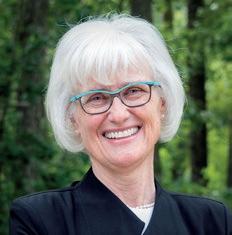
legacy is a subject that often occupies my thoughts. Cecil Rhodes’s legacy, embodied in the Rhodes Scholarships and the personal legacies of Scholars, reflects values, purpose, passion and impact. Indeed, life is an intricate tapestry where the most delicate, precious and profound threads are those that represent legacy. This legacy transcends individual existence, resonating through time and impacting future generations.
Philip Ziegler, in his book Legacy, notes about Rhodes: ‘In his life he did, if not evil, then at least much which redounded to his discredit.
healthcare and leadership, coupled with my parents’ legacies, compels me to articulate my wishes clearly in my estate plan. Contemplating the impact beyond my lifetime has been an enlightening intellectual exercise. Aligning values, instilling hope and embedding faith are reflected in each specific allocation within my will.
We are launching the 50@50 Campaign with the aim of enrolling 50 women as Rhodes Society members by 2027
Today, a little over a century after his death, the memories of such misdeeds are largely interred with his bones in the Matapos hills. What lives after him is the renown of the most famous scholarships in the world.’1 We perpetuate a thread of Rhodes’s original legacy in uniquely meaningful and impactful ways. In turn, we have our own legacies to share. During our lifetimes, we contribute time, talent and resources in diverse manners. The influence of these contributions endures through others, informed by our efforts over time.
My healthcare experiences have perhaps intensified my intent to shape my legacy consciously, to support individuals committed to performing good deeds over time. My professional journey in publicly funded
With profound gratitude for the myriad opportunities that have come my way, I recognise that the path provided by Rhodes has led me to unimagined places. I am continuously inspired by others who follow a similar trajectory. The Rhodes Society honours those who, through planned giving, choose to invest in a future they can only imagine. Currently, our membership comprises 100 individuals who have disclosed their legacy intentions to the Trust. However, it is notable that most realised legacies come from those who had not communicated their intentions before their passing. Regardless of currency or estate value, legacy gifts embody the essence of our aspirations for the future.
As we approach 50 years of Rhodes Scholarships for women, we are launching the 50@50 Campaign with the aim of enrolling 50 women as Rhodes Society members by 2027. We encourage many to join us by sharing their current intentions and becoming part of our Rhodes Society. We invite you to join us.
For more information, contact: development@rhodeshouse.ox.ac.uk
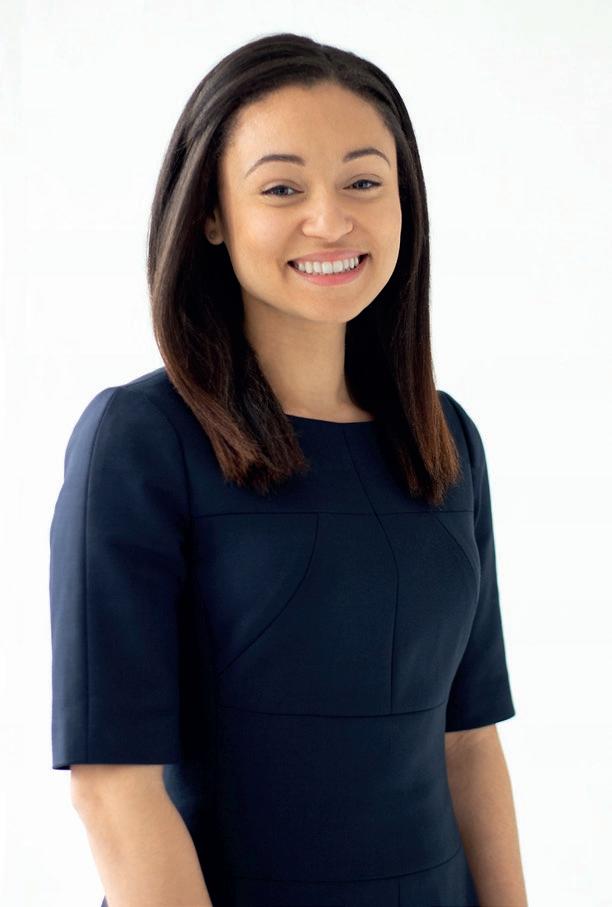
“ For me, one of the greatest joys of becoming a Rhodes Scholar was joining a multigenerational community that gives back and pays forward. I’ve found so much fellowship, friendship and family within this global community, including those I met while at Oxford, well before I became a Rhodes Scholar, and many years after. I have also benefited from the contributions of Scholars generations before me, and I loved the idea of offering something to the generations that will come after me, too. I see my membership in the Rhodes Society as a way to continue this tradition of connection across generations and to ensure others can have the opportunities and experiences at Oxford that I’ve so cherished. ” Debi Ogunrinde, (Maritimes & Keble 2016)

“ It is my privilege to work with young people who seek to live with integrity and impact. Integrity and impact matter especially in philanthropy. There are more worthy causes than my husband, Rob Radtke (Massachusetts & New College 1987) and I have the time, talent and treasure to support. So, we look for organisations aligned with our values that act with integrity and have the ability to transform lives for the better –preferably at scale.
During our lifetime, we give to the most urgent needs in communities where we have longstanding commitments. But we don’t have to restrict our time horizon. While we likely will not have a lot to give at the end of our lives, we can use that money to support an organisation that has transformed our own lives and the lives of others for the better.
This is where the Rhodes Society comes in. Through it we can support the commitment of the Rhodes Trust to find and nurture young people with the capacity to change the world with integrity and impact. Through it we can support the vital commitment of members of the Rhodes community to fight the world’s fight. ” Mary Abraham (Maritimes & St Antony’s 1987)
By John Edwards (British Columbia & Hertford 1967)
There’s eternity in a patch of blue
When the rest of sky is dressed in grey...
In a solitary dandelion who waves Her golden heart upon a sea of green
And how the last cricket calls The shadows to come at summer’s end

In the fleeting hour of morning frost
After rise of sun or how the hazel sends
A dust of snow upon my hair below
When I’ve spilled seeds for hungry sparrows
And how that cloud of starlings flies and lands as one All afternoon upon my winter field
To an invisible conductor’s wand
Why in small things does greatness shine And overcomes the world beyond?
Why is all creation forever new When I look above and see a patch of blue?
John Edwards is the author of many translations of Latin and Greek poets and four books of lyric poetry and art. He is the poet laureate of Ladysmith on Vancouver Island. John volunteers as a philosophy and literature professor at Mid-Island Elder College. He grows hay and quince on his 100-acre farm.
John’s poetry attempts to portray the healing power of nature through the sense of wonder it engenders in our souls. His newest book, In Country Heart will be published this coming summer.

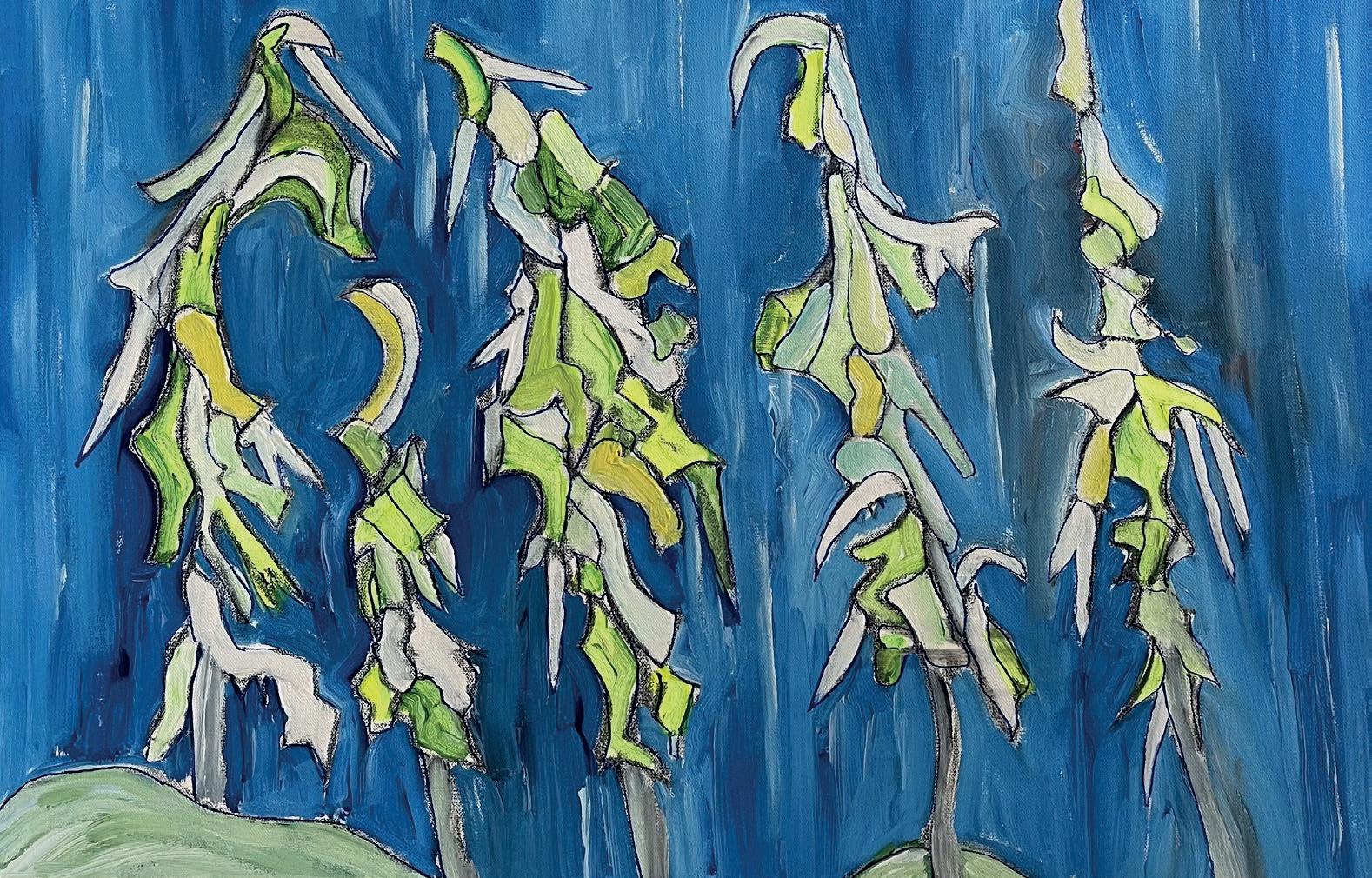
Rhodes House
South Parks Road
Oxford OX1 3RG
United Kingdom
communications@rhodeshouse.ox.ac.uk
rhodeshouse.ox.ac.uk
@RhodesTrust
@rhodes_trust
@rhodestrust
Rhodes Trust
Rhodes Trust
@rhodestrust
The Rhodes Trust Podcast